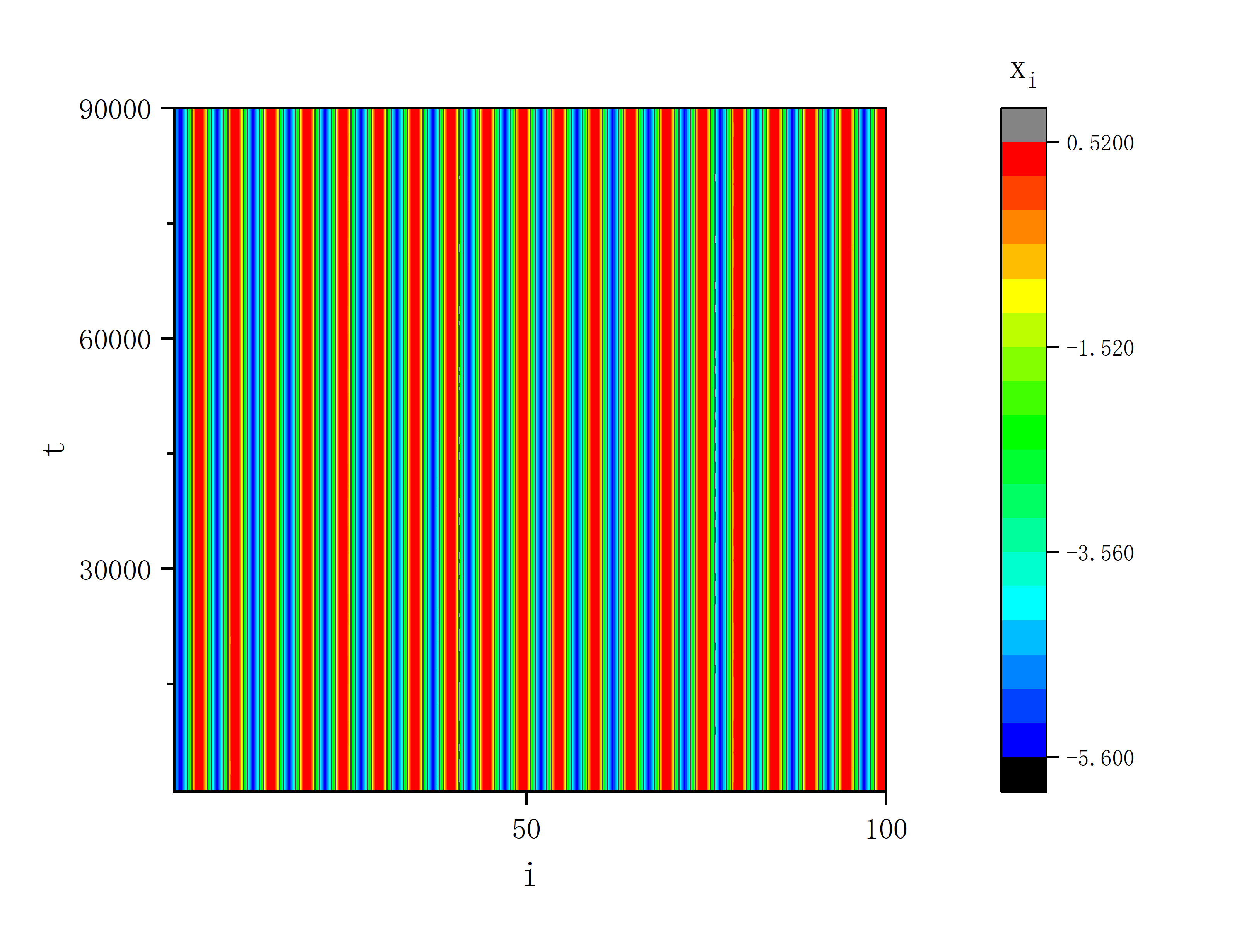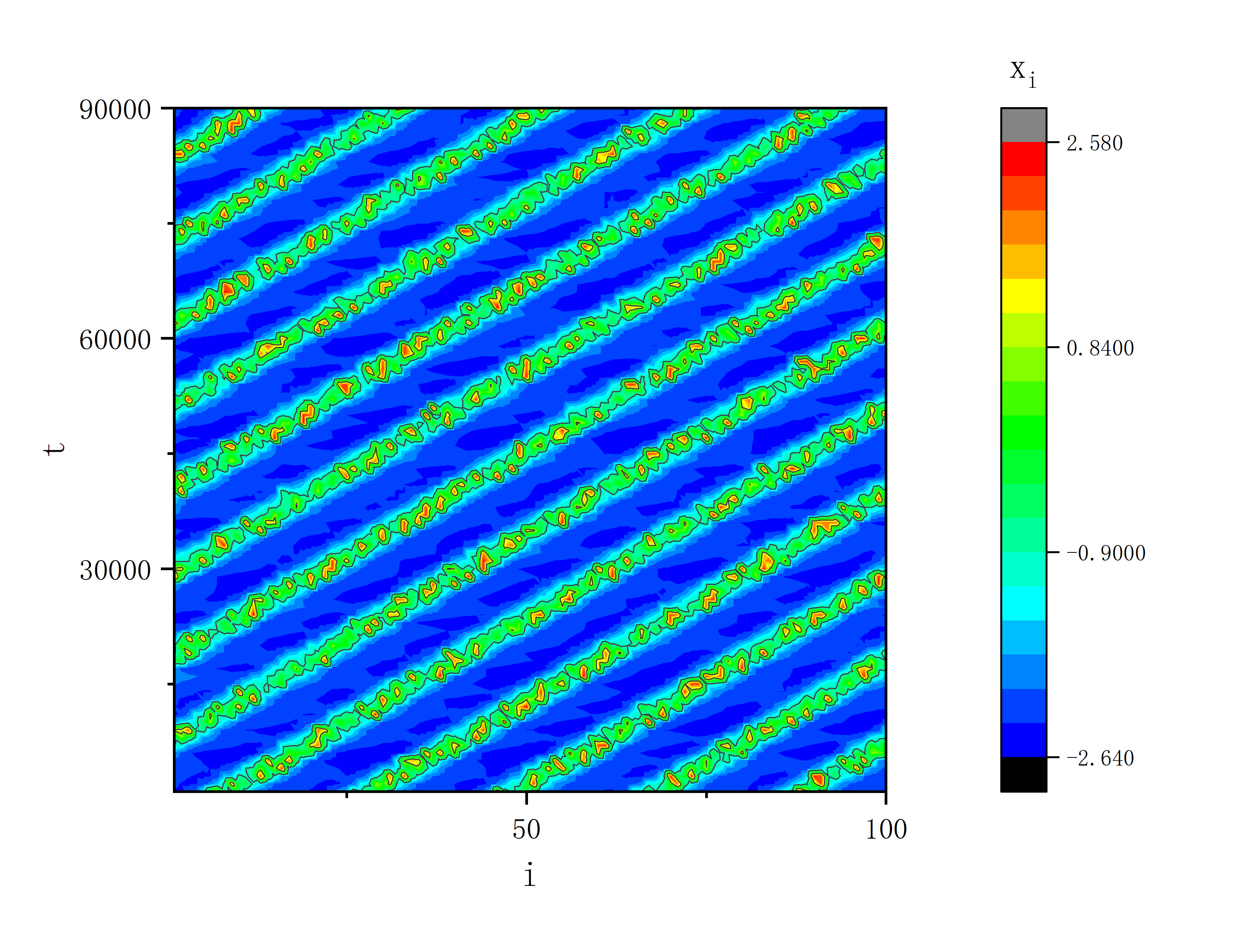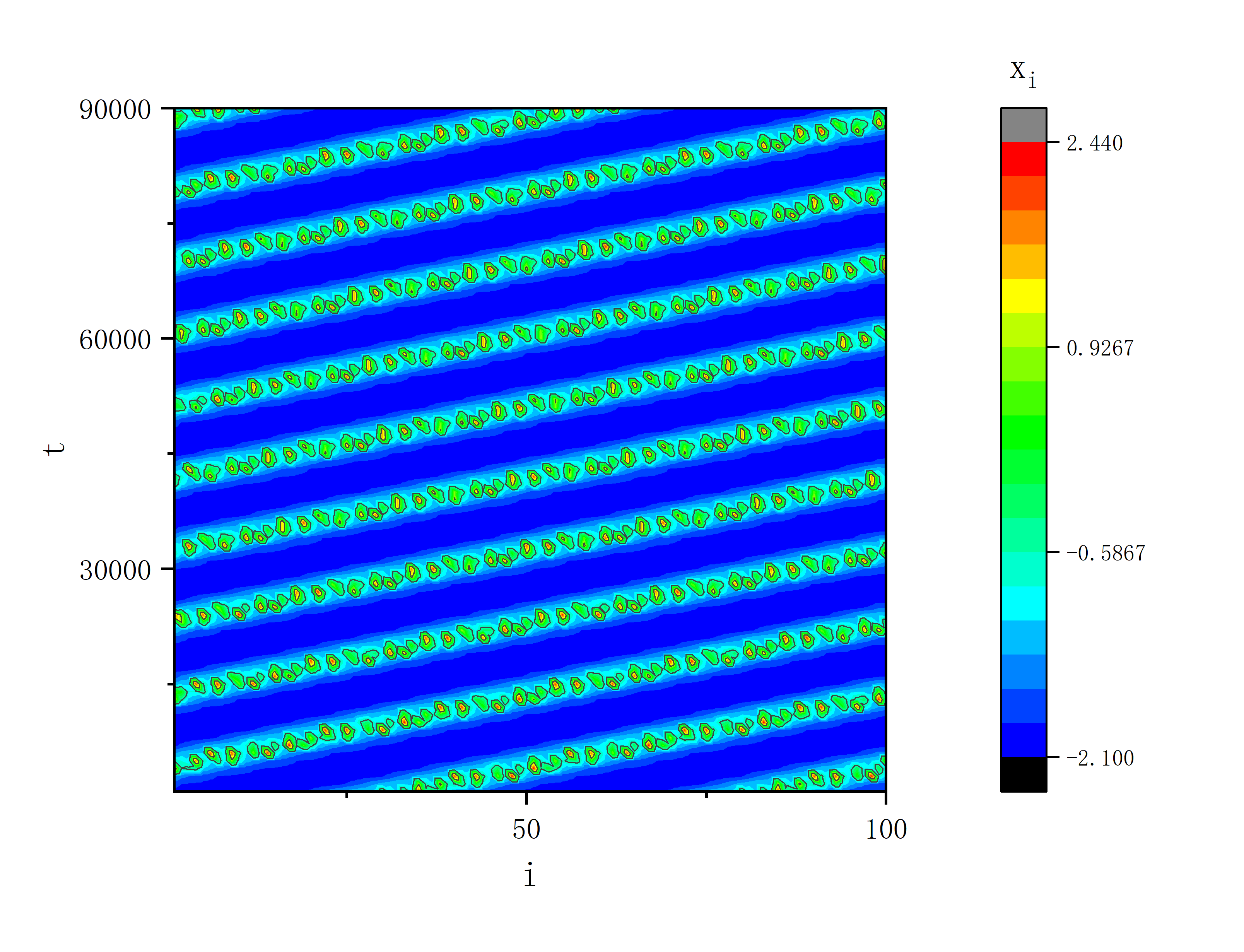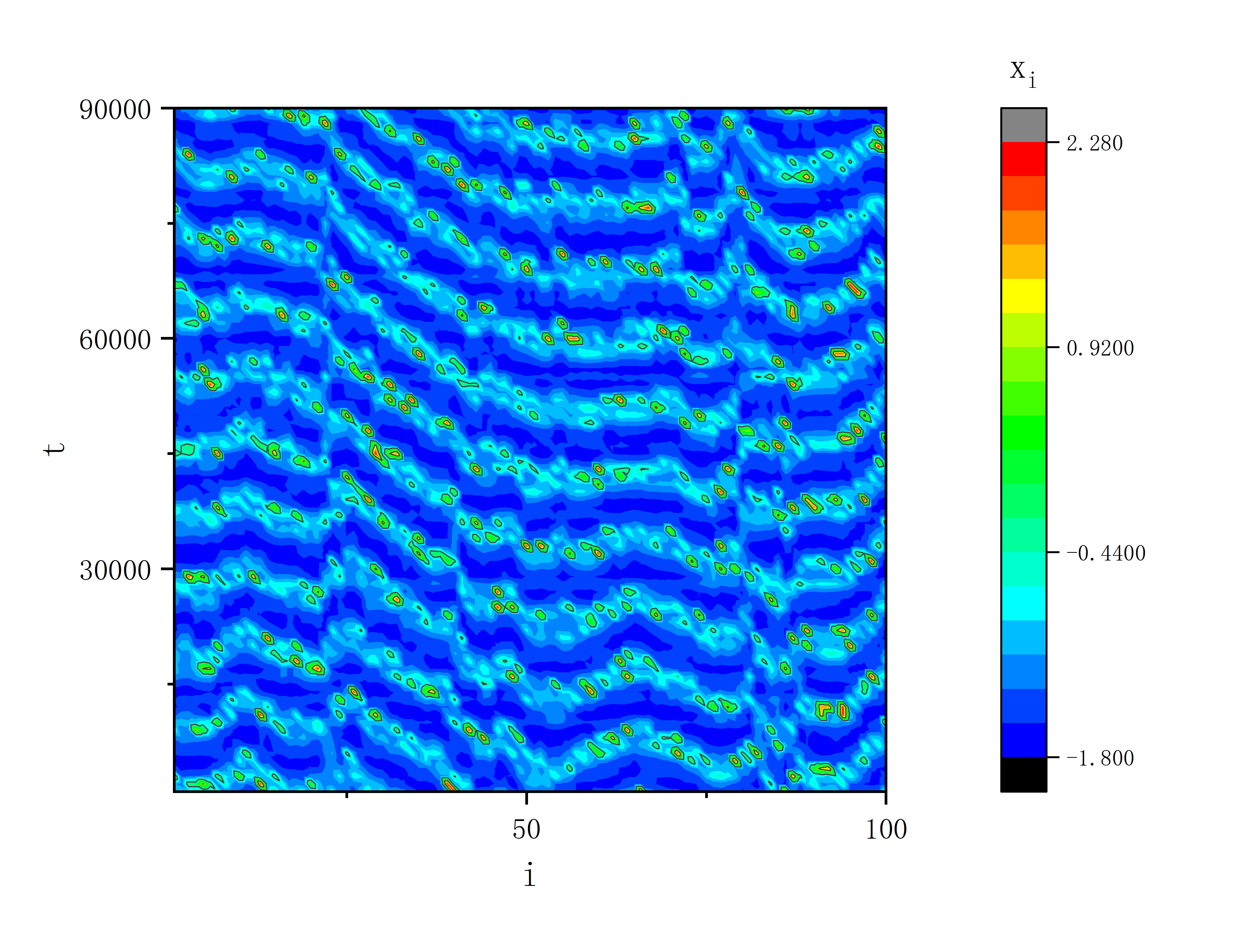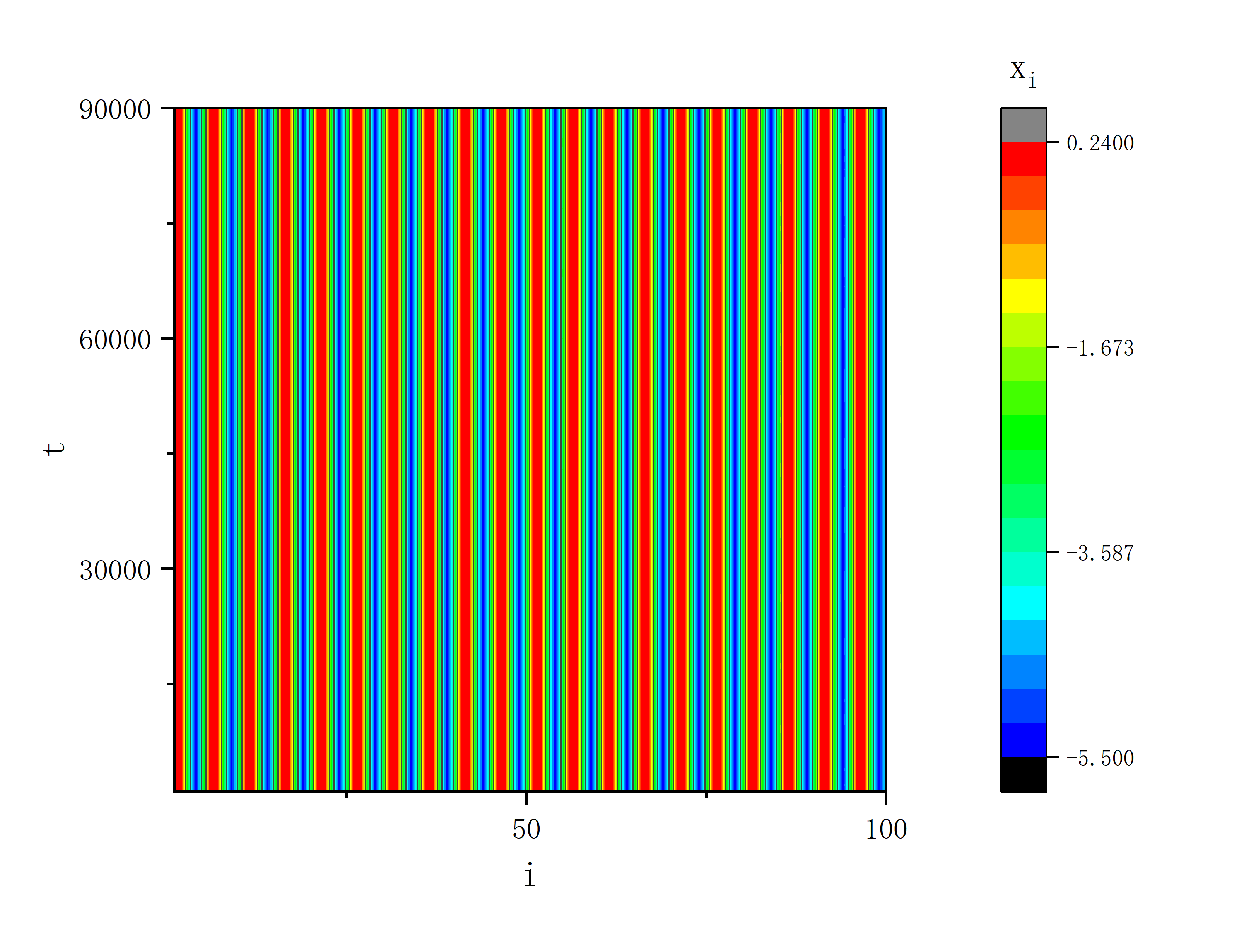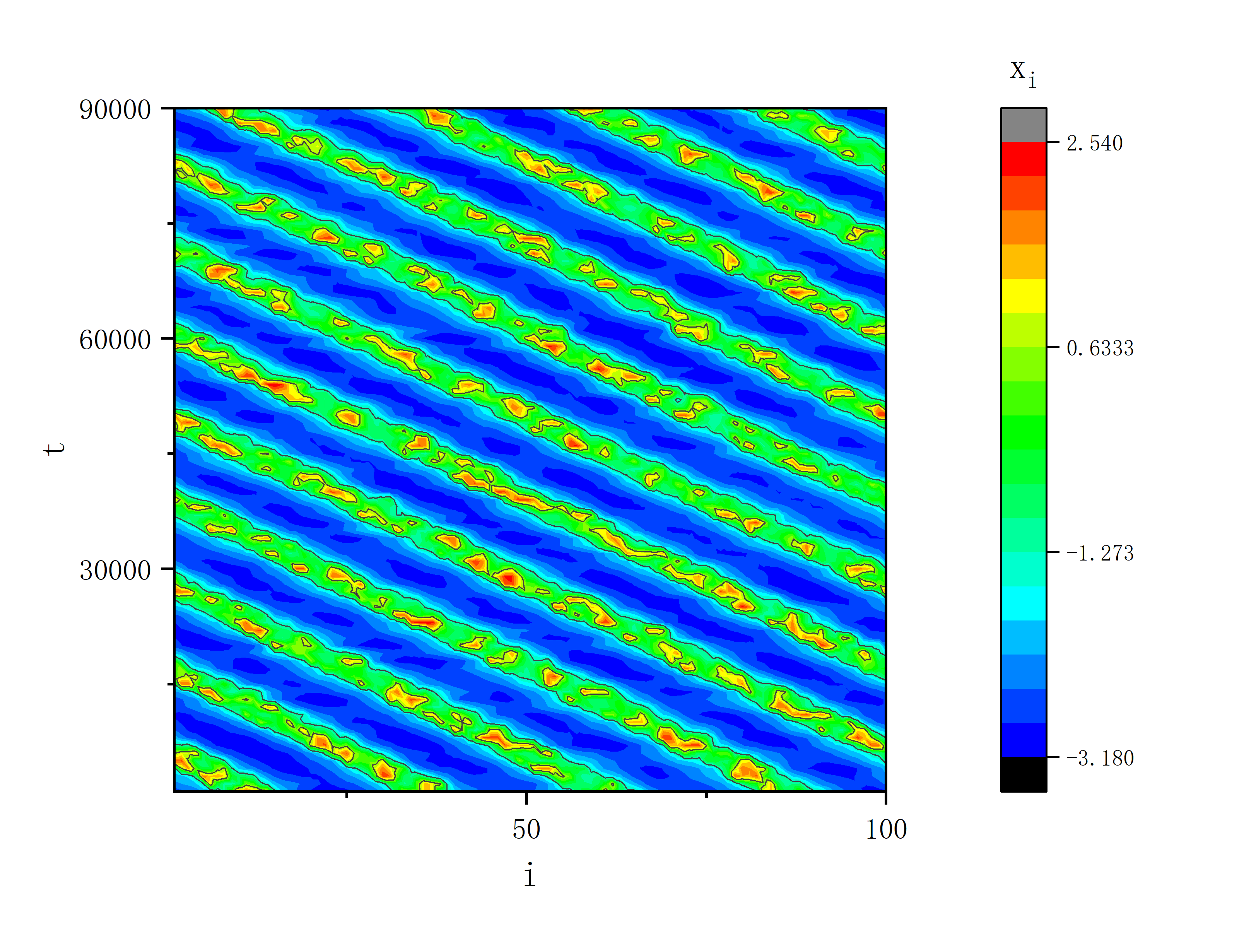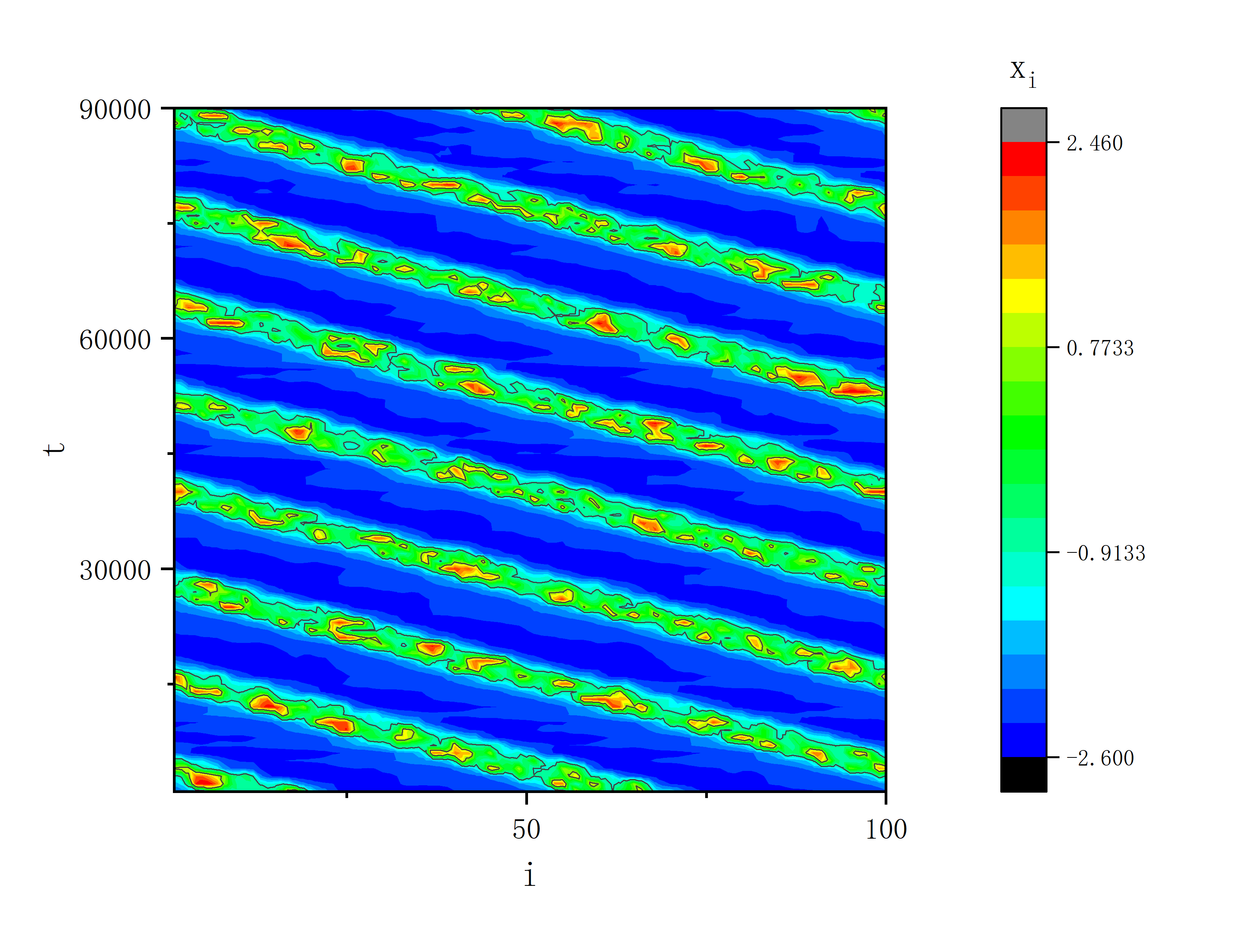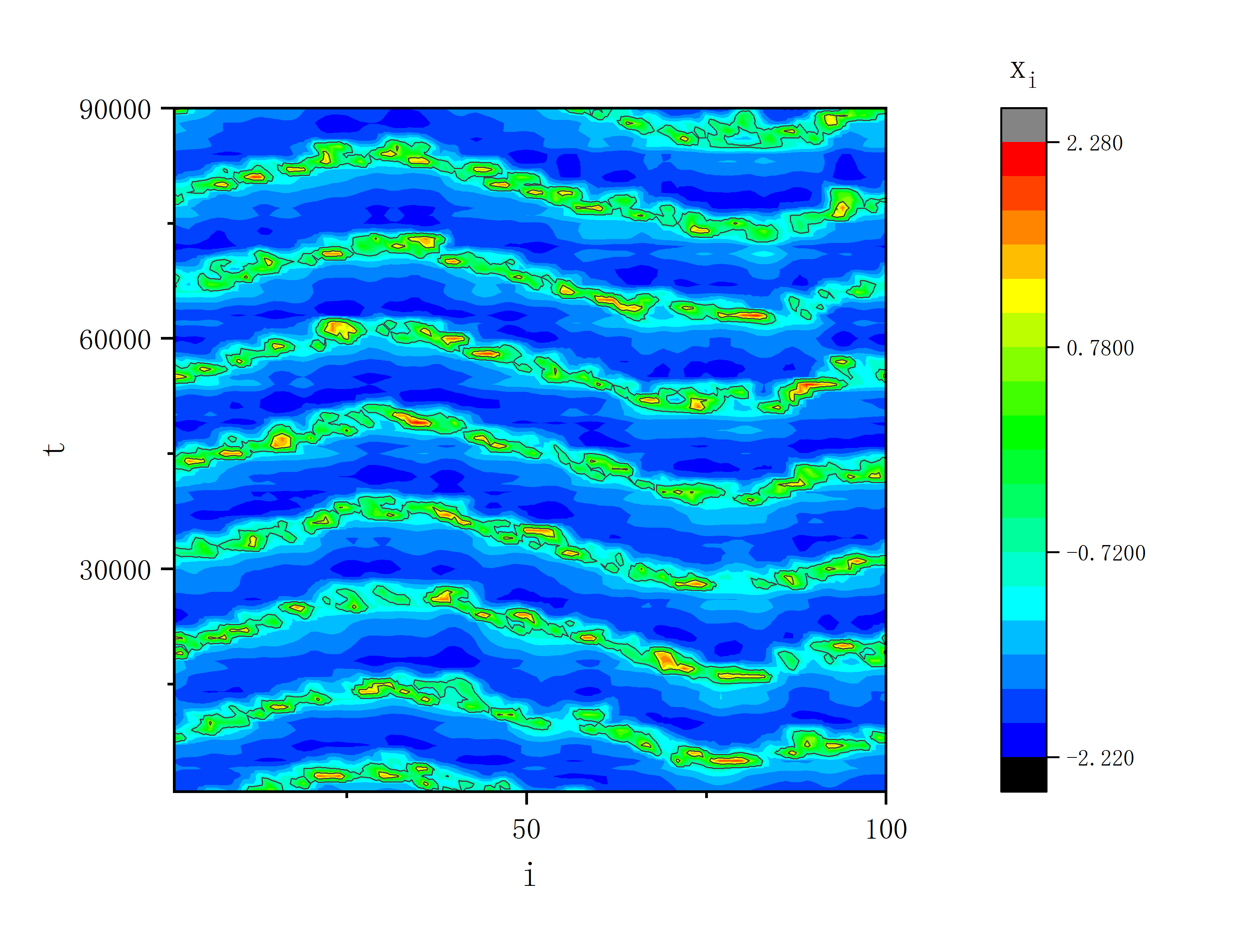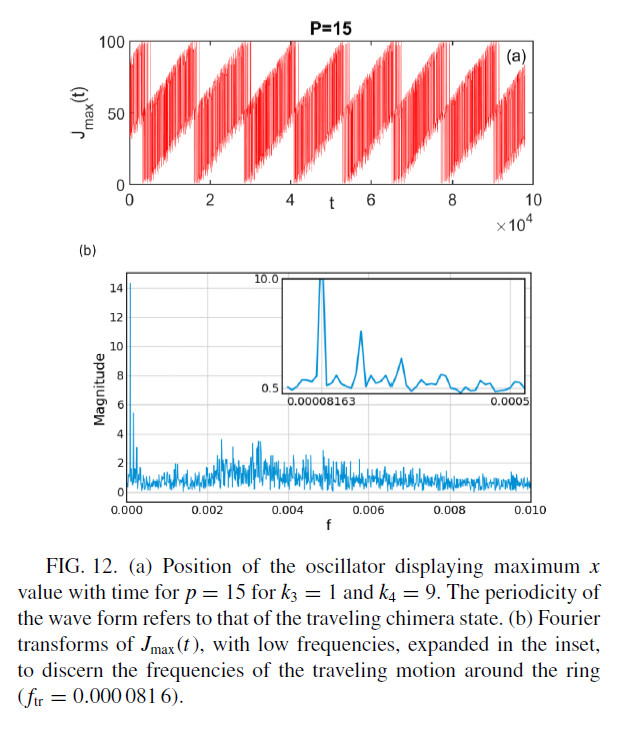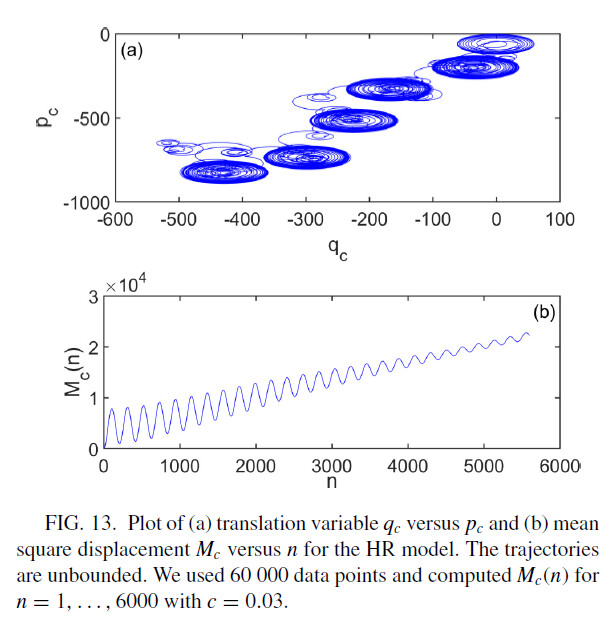Chimera states in a neuronal network under the action of an electric field
阅读
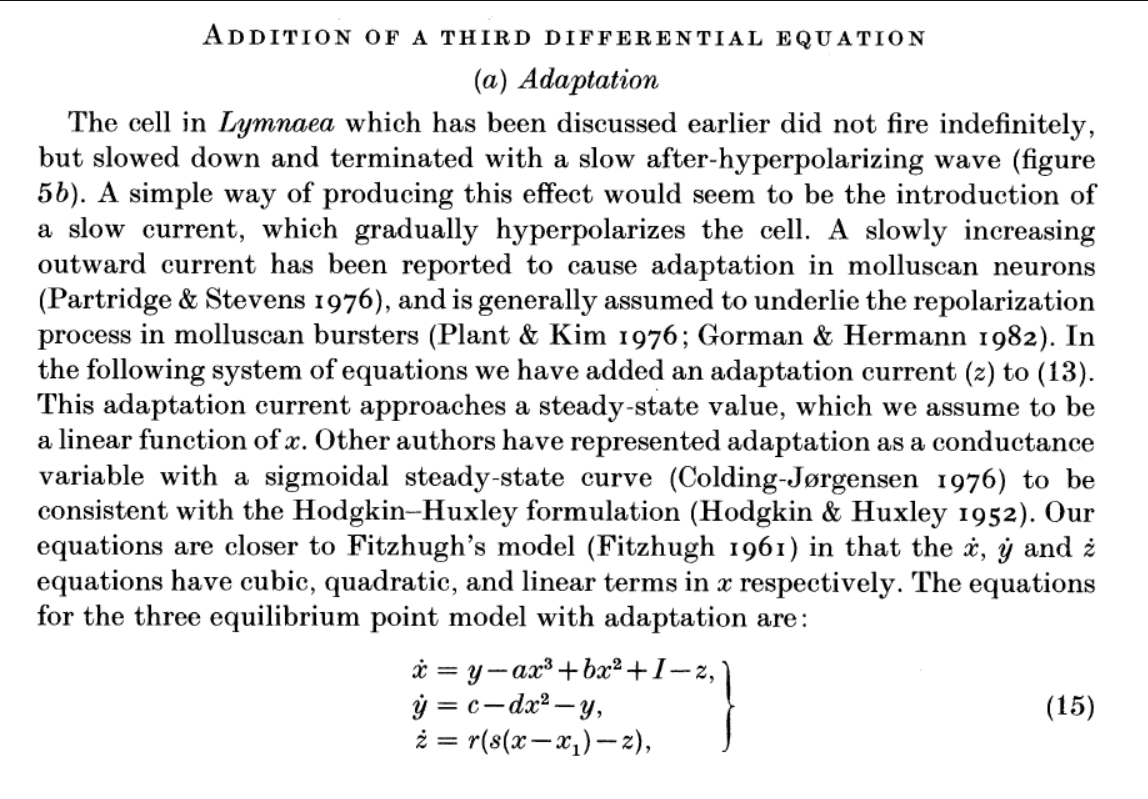
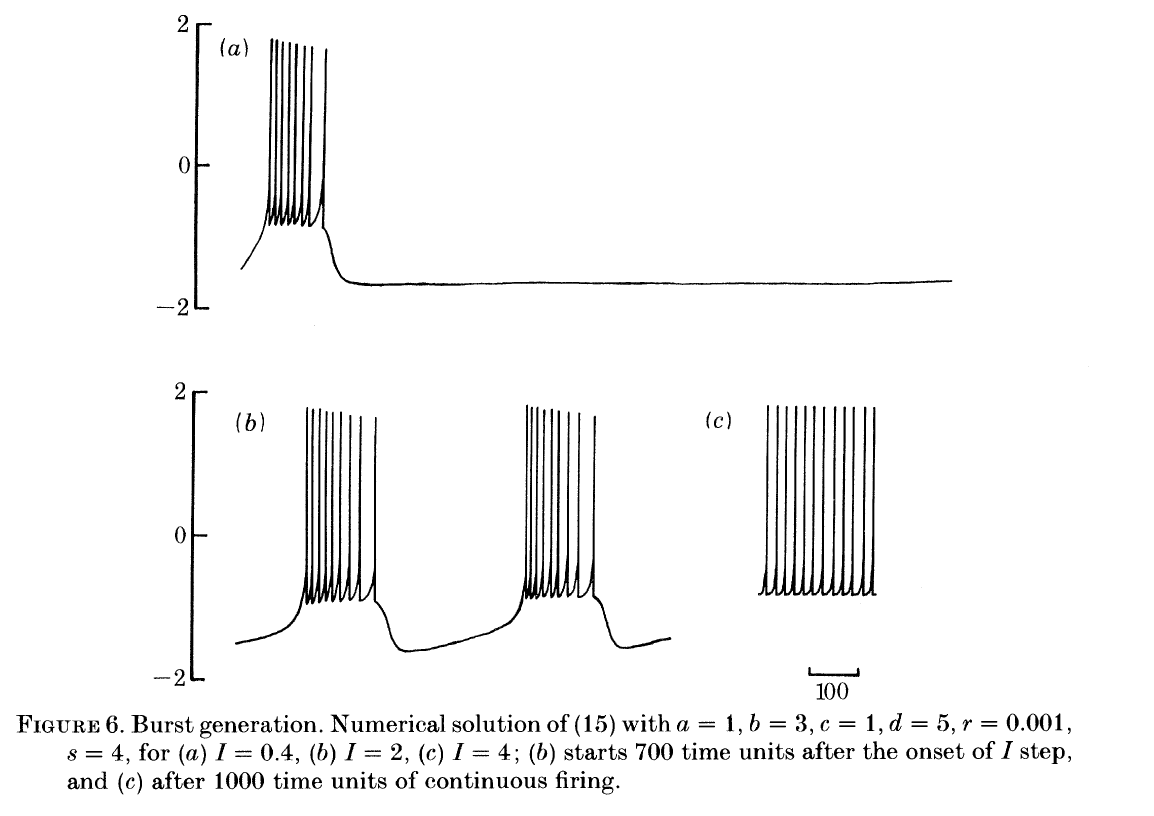
module HR
implicit none
real,parameter :: h=0.01
integer,parameter :: N=100,MaxT=170000
integer,allocatable :: neighbour_matrix_2(:,:),neighbour_matrix_2P(:,:)
real :: x(N),y(N),z(N)
contains
subroutine x0_y0_z0()
implicit none
integer :: k
real :: x1,x2,x3
call random_seed()
do k=1,N,1
call random_number(x1)
call random_number(x2)
call random_number(x3)
x(k)=0.001*(k-N/2.0)+x1
y(k)=0.002*(k-N/2.0)+x2
z(k)=0.003*(k-N/2.0)+x3
write(10,*) x(k),y(k),z(k)
end do
end subroutine x0_y0_z0
subroutine fnf(p)
implicit none
integer :: i,j,p,t
real :: func_x(N),func_y(N),func_z(N),func_e(N),a,b,d,k1,k2,k3,k4,II,JJ,C,r,s,x_i0,E_ext,x_s,&
&lambda,thet_s,C1,C2,E(N)
k1=0.0
k2=0.0
k3=0.0
k4=0.0
a=1.0
b=3.0
d=5.0
r=0.001
s=4.0
x_s=2.0
x_i0=-1.6
lambda=10.0
thet_s=-0.25
E_ext=0.0
E=0.0
II=4.0
do t=1,MaxT,1
if(mod(t,5000)==0) then
write(*,*) t
end if
do i=1,N,1
JJ=0.0
C1=0.0
C2=0.0
C=0.0
do j=1,N,1
JJ=JJ+neighbour_matrix_2(i,j)*(x(j)-x(i))
C1=C1+neighbour_matrix_2P(i,j)*(1.0/(1.0+exp(-lambda*(x(j)-thet_s))))
C2=C2+neighbour_matrix_2(i,j)*(1.0/(1.0+exp(-lambda*(x(j)-thet_s))))
end do
C=C1-C2
func_x(i)=x(i)+h*(y(i)-a*x(i)**3+b*x(i)**2-z(i)+II+k3*JJ+(k4/(2.0*p-2.0)*(x_s-x(i))*C))
func_y(i)=y(i)+h*(1.0-d*x(i)**2-y(i)-k1*E(i))
func_z(i)=z(i)+h*(r*(s*(x(i)-x_i0)-z(i)))
if(mod(t,50)==0) then
write(20,*) i,t,x(i)
end if
if(i==5.and.t>70000) then
write(30,*) t,x(i)
write(70,*) x(i),y(i),z(i)
write(*,*) t,x(i)
end if
if(i==50.and.t>70000) then
write(40,*) t,x(i)
end if
end do
x=func_x
y=func_y
z=func_z
end do
return
end subroutine fnf
subroutine neighbour_2(K)
implicit none
integer :: K
integer :: i,j,number
allocate(neighbour_matrix_2(N,N))
neighbour_matrix_2=0
do i=1,N-1,1
do j=i+1,N,1
if(abs(i-j)<=K/2.or.abs(i-j)>=N-K/2) then
neighbour_matrix_2(i,j)=1
neighbour_matrix_2(j,i)=1
end if
end do
end do
do i=1,N,1
do j=1,N,1
write(50,"(I2)",advance='no') neighbour_matrix_2(i,j)
end do
write(50,*)
end do
return
end subroutine neighbour_2
subroutine neighbour_2P(K)
implicit none
integer :: K
integer :: i,j,number
allocate(neighbour_matrix_2P(N,N))
neighbour_matrix_2P=0
do i=1,N-1,1
do j=i+1,N,1
if((abs(i-j)<=K/2.or.abs(i-j)>=N-K/2).and.abs(i-j)/=1) then
neighbour_matrix_2P(i,j)=1
neighbour_matrix_2P(j,i)=1
end if
end do
end do
do i=1,N,1
do j=1,N,1
write(60,"(I2)",advance='no') neighbour_matrix_2P(i,j)
end do
write(60,*)
end do
return
end subroutine neighbour_2P
end module HR
program main
use HR
implicit none
integer :: p
p=40
open(10,file="data_x0_y0_z0.txt")
open(20,file="data_i_t_x.txt")
open(30,file="data_t_x5.txt")
open(40,file="data_t_x50.txt")
open(50,file="neighbour_matrix_2.txt")
open(60,file="neighbour_matrix_2P.txt")
open(70,file="x.txt")
call x0_y0_z0()
call neighbour_2(2)
call neighbour_2P(2*p+2)
call fnf(p)
deallocate(neighbour_matrix_2)
deallocate(neighbour_matrix_2P)
close(10)
close(20)
close(30)
close(40)
end program main
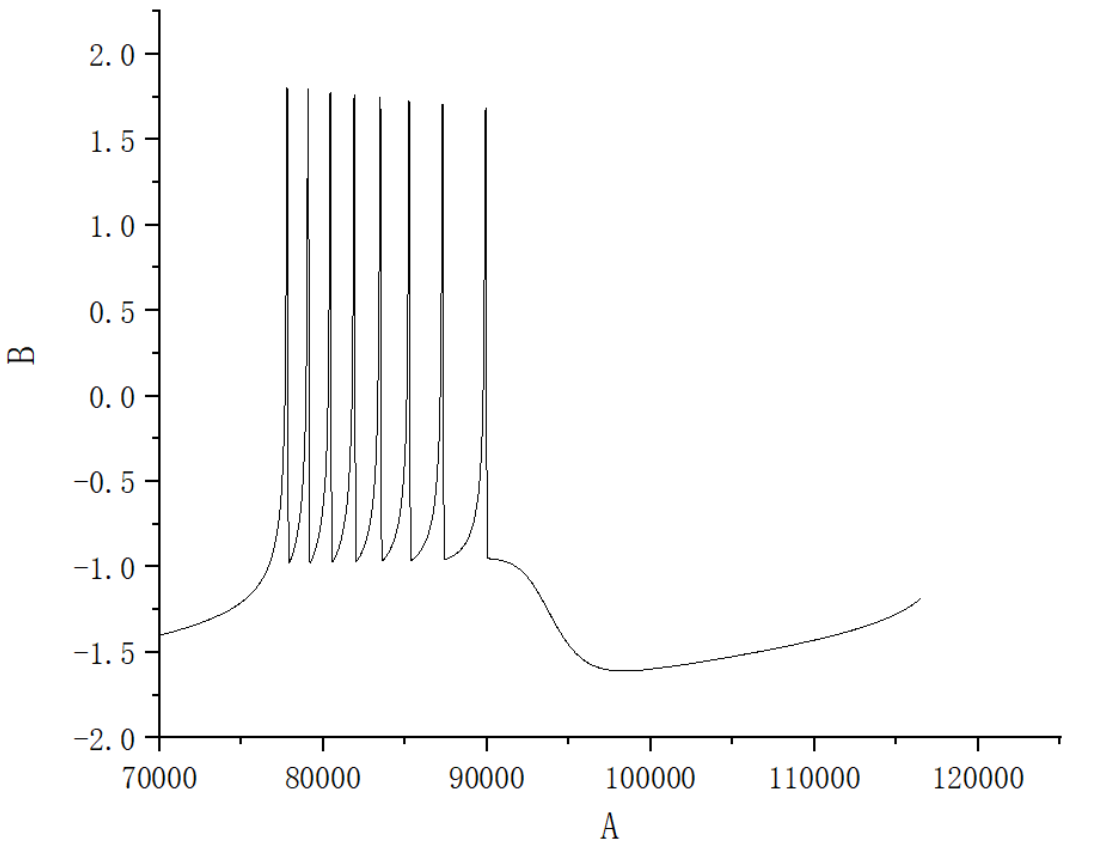
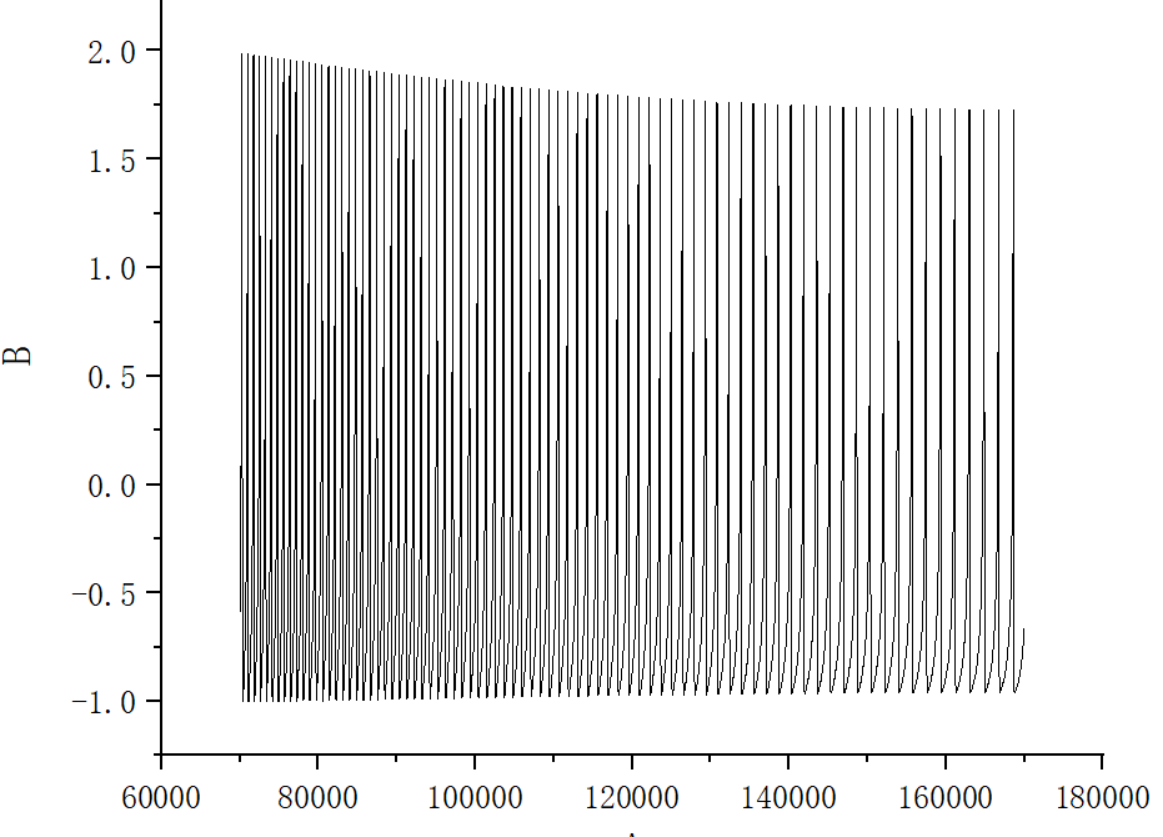
复现
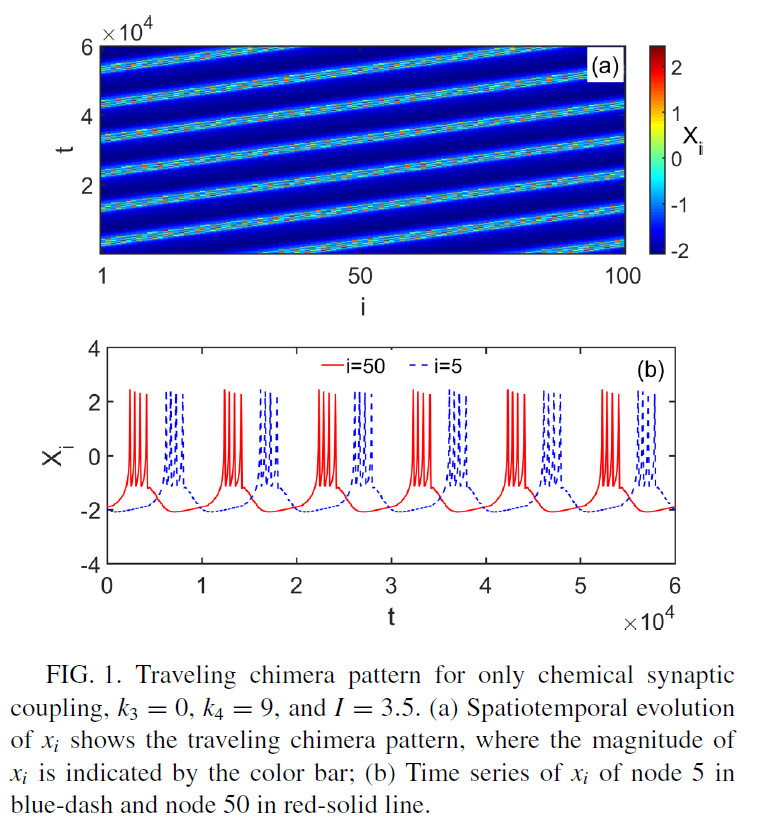
module HR
implicit none
real,parameter :: h=0.01
integer,parameter :: N=100,MaxT=360000
integer,allocatable :: neighbour_matrix_2(:,:),neighbour_matrix_2P(:,:)
real :: x(N),y(N),z(N),E(N)
contains
subroutine x0_y0_z0()
implicit none
integer :: k
real :: x1,x2,x3
call random_seed()
do k=1,N,1
call random_number(x1)
call random_number(x2)
call random_number(x3)
x(k)=0.001*(k-N/2.0)+x1
y(k)=0.002*(k-N/2.0)+x2
z(k)=0.003*(k-N/2.0)+x3
write(10,*) x(k),y(k),z(k)
end do
end subroutine x0_y0_z0
subroutine fnf(p)
implicit none
integer :: i,j,p,t
real :: func_x(N),func_y(N),func_z(N),func_e(N),a,b,d,k1,k2,k3,k4,II,JJ(N),C(N),r,s,x_i0,E_ext,x_s,&
&lambda,thet_s,C1(N),C2(N)
k1=0.0
k2=0.0
k3=0.0
k4=9.0
a=1.0
b=3.0
d=5.0
r=0.01
s=5.0
x_s=2.0
x_i0=-1.6
lambda=10.0
thet_s=-0.25
E_ext=0.0
E=0.0
II=3.5
do t=1,MaxT,1
if(mod(t,5000)==0) then
write(*,*) t
end if
JJ=0.0
C1=0.0
C2=0.0
C=0.0
do i=1,N,1
do j=1,N,1
JJ(i)=JJ(i)+neighbour_matrix_2(i,j)*(x(j)-x(i))
C1(i)=C1(i)+neighbour_matrix_2P(i,j)*(1.0/(1.0+exp(-lambda*(x(j)-thet_s))))
C2(i)=C2(i)+neighbour_matrix_2(i,j)*(1.0/(1.0+exp(-lambda*(x(j)-thet_s))))
end do
C(i)=C1(i)-C2(i)
func_x(i)=x(i)+h*(y(i)-a*x(i)**3+b*x(i)**2-z(i)+II+k3*JJ(i)+((-k4/(2.0*p-2.0))*(x_s-x(i))*C(i)))
func_y(i)=y(i)+h*(1.0-d*x(i)**2-y(i))
func_z(i)=z(i)+h*(r*(s*(x(i)-x_i0)-z(i)))
if(mod(t,50)==0.and.t>300000) then
write(20,*) i,t-300000,x(i)
end if
if(i==5.and.t>300000) then
write(30,*) t-300000,x(i)
write(70,*) x(i),y(i),z(i)
write(*,*) t,x(i)
end if
if(i==50.and.t>300000) then
write(40,*) t-300000,x(i)
end if
end do
x=func_x
y=func_y
z=func_z
end do
return
end subroutine fnf
subroutine neighbour_2(K)
implicit none
integer :: K
integer :: i,j,number
allocate(neighbour_matrix_2(N,N))
neighbour_matrix_2=0
do i=1,N-1,1
do j=i+1,N,1
if(abs(i-j)<=K/2.or.abs(i-j)>=N-K/2) then
neighbour_matrix_2(i,j)=1
neighbour_matrix_2(j,i)=1
end if
end do
end do
do i=1,N,1
do j=1,N,1
write(50,"(I2)",advance='no') neighbour_matrix_2(i,j)
end do
write(50,*)
end do
return
end subroutine neighbour_2
subroutine neighbour_2P(K)
implicit none
integer :: K
integer :: i,j,number
allocate(neighbour_matrix_2P(N,N))
neighbour_matrix_2P=0
do i=1,N-1,1
do j=i+1,N,1
if((abs(i-j)<=K/2.or.abs(i-j)>=N-K/2).and.abs(i-j)/=1) then
neighbour_matrix_2P(i,j)=1
neighbour_matrix_2P(j,i)=1
end if
end do
end do
do i=1,N,1
do j=1,N,1
write(60,"(I2)",advance='no') neighbour_matrix_2P(i,j)
end do
write(60,*)
end do
return
end subroutine neighbour_2P
end module HR
program main
use HR
implicit none
integer :: p
p=40
open(10,file="data_x0_y0_z0.txt")
open(20,file="data_i_t_x.txt")
open(30,file="data_t_x5.txt")
open(40,file="data_t_x50.txt")
open(50,file="neighbour_matrix_2.txt")
open(60,file="neighbour_matrix_2P.txt")
open(70,file="x.txt")
call x0_y0_z0()
call neighbour_2(2)
call neighbour_2P(2*p+2)
call fnf(p)
deallocate(neighbour_matrix_2)
deallocate(neighbour_matrix_2P)
close(10)
close(20)
close(30)
close(40)
close(50)
close(60)
close(70)
end program main
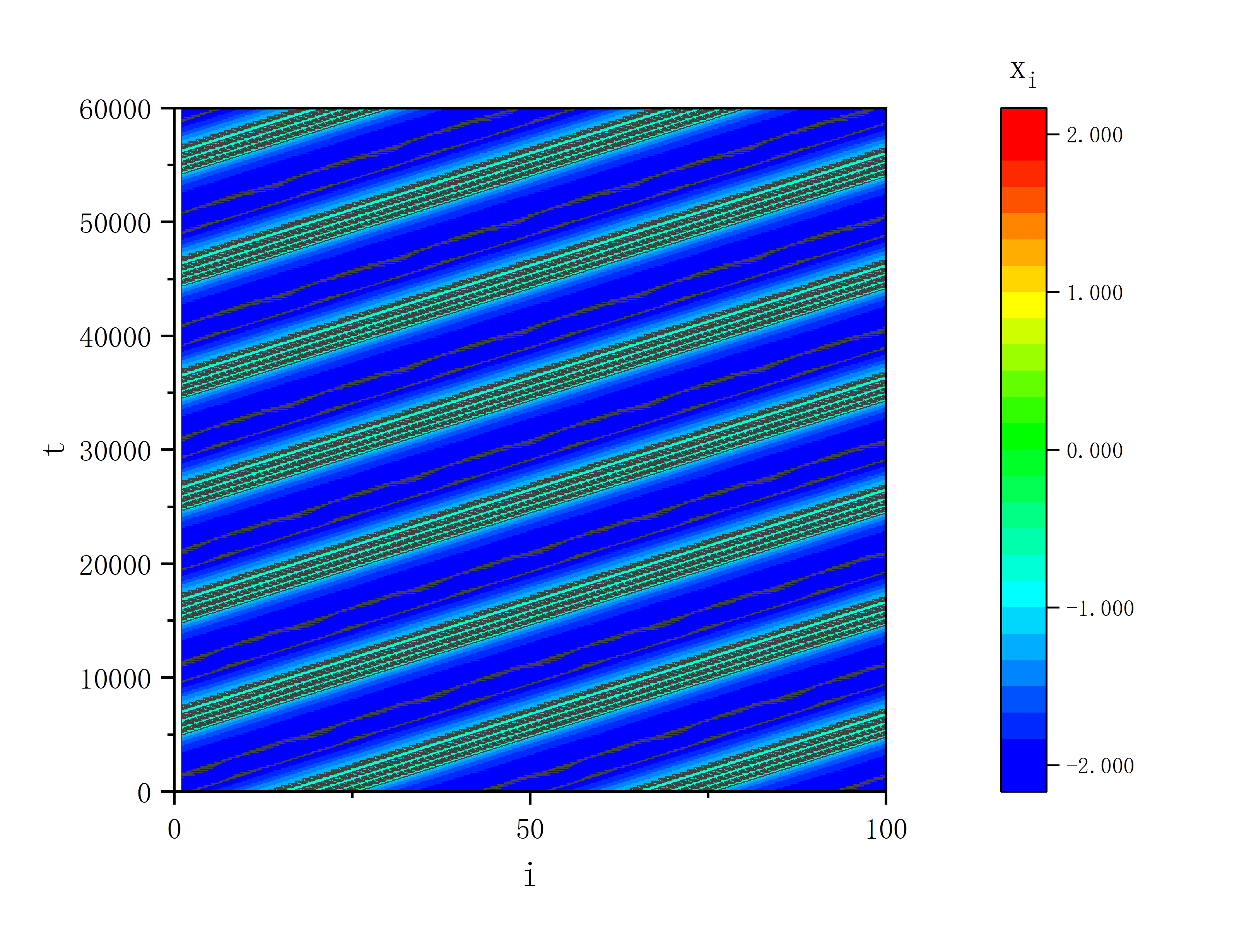
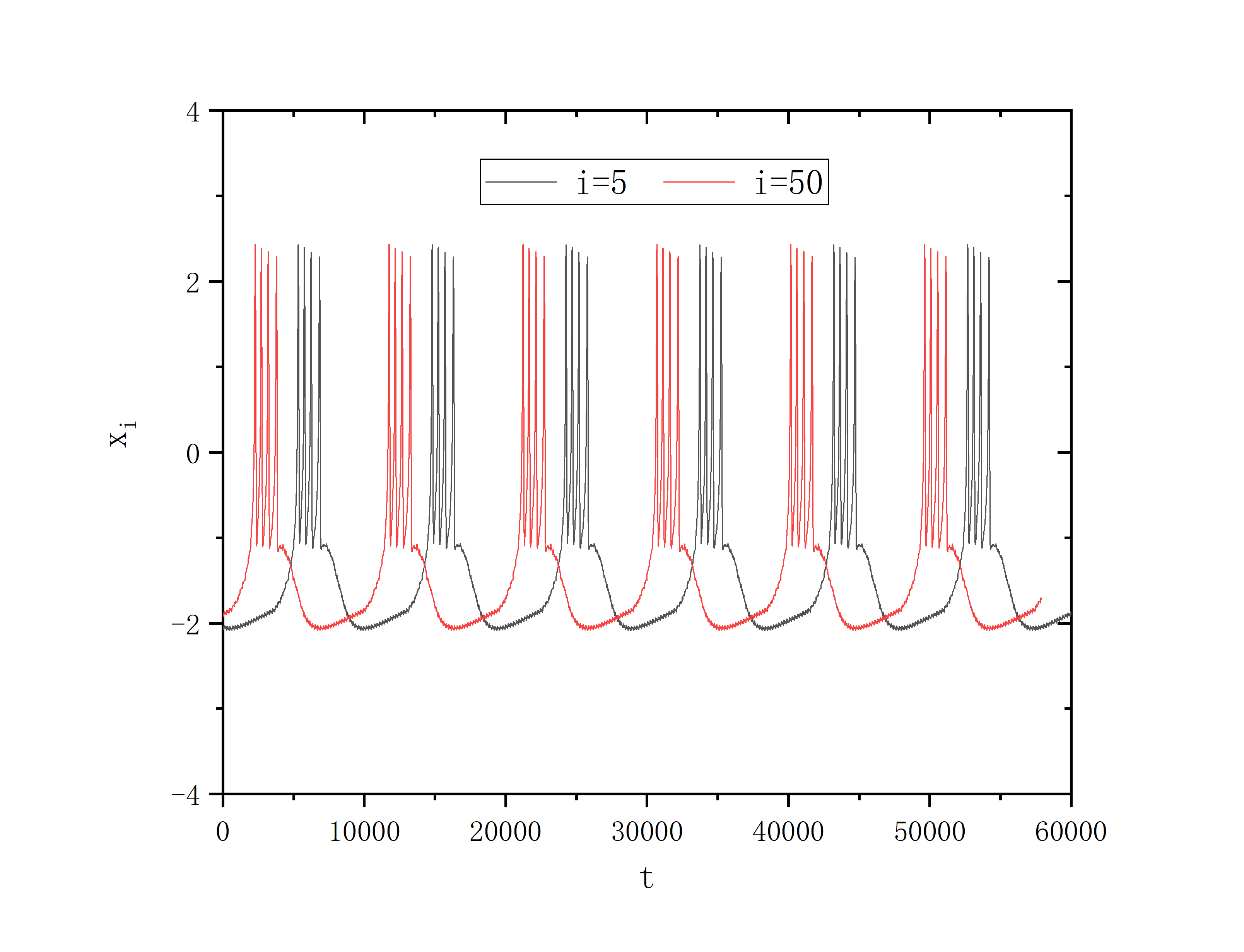
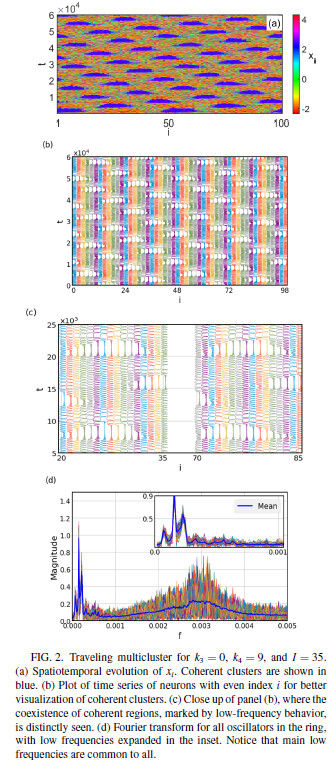
module HR
implicit none
real,parameter :: h=0.01
integer,parameter :: N=100,MaxT=360000
integer,allocatable :: neighbour_matrix_2(:,:),neighbour_matrix_2P(:,:)
real :: x(N),y(N),z(N),E(N)
contains
subroutine x0_y0_z0()
implicit none
integer :: k
real :: x1,x2,x3
call random_seed()
do k=1,N,1
call random_number(x1)
call random_number(x2)
call random_number(x3)
x(k)=0.001*(k-N/2.0)+x1
y(k)=0.002*(k-N/2.0)+x2
z(k)=0.003*(k-N/2.0)+x3
write(101,*) x(k),y(k),z(k)
end do
end subroutine x0_y0_z0
subroutine fnf(p)
implicit none
integer :: i,j,p,t
real :: func_x(N),func_y(N),func_z(N),func_e(N),a,b,d,k1,k2,k3,k4,II,JJ(N),C(N),r,s,x_i0,E_ext,x_s,&
&lambda,thet_s,C1(N),C2(N)
k1=0.0
k2=0.0
k3=0.0
k4=9.0
a=1.0
b=3.0
d=5.0
r=0.01
s=5.0
x_s=2.0
x_i0=-1.6
lambda=10.0
thet_s=-0.25
E_ext=0.0
E=0.0
II=35
do t=1,MaxT,1
if(mod(t,5000)==0) then
write(*,*) t
end if
JJ=0.0
C1=0.0
C2=0.0
C=0.0
do i=1,N,1
do j=1,N,1
JJ(i)=JJ(i)+neighbour_matrix_2(i,j)*(x(j)-x(i))
C1(i)=C1(i)+neighbour_matrix_2P(i,j)*(1.0/(1.0+exp(-lambda*(x(j)-thet_s))))
C2(i)=C2(i)+neighbour_matrix_2(i,j)*(1.0/(1.0+exp(-lambda*(x(j)-thet_s))))
end do
C(i)=C1(i)-C2(i)
func_x(i)=x(i)+h*(y(i)-a*x(i)**3+b*x(i)**2-z(i)+II+k3*JJ(i)+((-k4/(2.0*p-2.0))*(x_s-x(i))*C(i)))
func_y(i)=y(i)+h*(1.0-d*x(i)**2-y(i))
func_z(i)=z(i)+h*(r*(s*(x(i)-x_i0)-z(i)))
if(t>300000) then
write(102,*) i,t-300000,x(i)
end if
if(mod(i,2)==0.and.t>300000) then
write(i,*) t-300000,x(i)+6.0*i/2.0
end if
end do
x=func_x
y=func_y
z=func_z
end do
return
end subroutine fnf
subroutine neighbour_2(K)
implicit none
integer :: K
integer :: i,j,number
allocate(neighbour_matrix_2(N,N))
neighbour_matrix_2=0
do i=1,N-1,1
do j=i+1,N,1
if(abs(i-j)<=K/2.or.abs(i-j)>=N-K/2) then
neighbour_matrix_2(i,j)=1
neighbour_matrix_2(j,i)=1
end if
end do
end do
do i=1,N,1
do j=1,N,1
write(103,"(I2)",advance='no') neighbour_matrix_2(i,j)
end do
write(103,*)
end do
return
end subroutine neighbour_2
subroutine neighbour_2P(K)
implicit none
integer :: K
integer :: i,j,number
allocate(neighbour_matrix_2P(N,N))
neighbour_matrix_2P=0
do i=1,N-1,1
do j=i+1,N,1
if((abs(i-j)<=K/2.or.abs(i-j)>=N-K/2).and.abs(i-j)/=1) then
neighbour_matrix_2P(i,j)=1
neighbour_matrix_2P(j,i)=1
end if
end do
end do
do i=1,N,1
do j=1,N,1
write(104,"(I2)",advance='no') neighbour_matrix_2P(i,j)
end do
write(104,*)
end do
return
end subroutine neighbour_2P
end module HR
program main
use HR
implicit none
integer :: p
p=40
open(101,file="data_x0_y0_z0.txt")
open(102,file="data_i_t_x.txt")
open(103,file="neighbour_matrix_2.txt")
open(104,file="neighbour_matrix_2P.txt")
call x0_y0_z0()
call neighbour_2(2)
call neighbour_2P(2*p+2)
call fnf(p)
deallocate(neighbour_matrix_2)
deallocate(neighbour_matrix_2P)
close(101)
close(102)
close(103)
close(104)
end program main
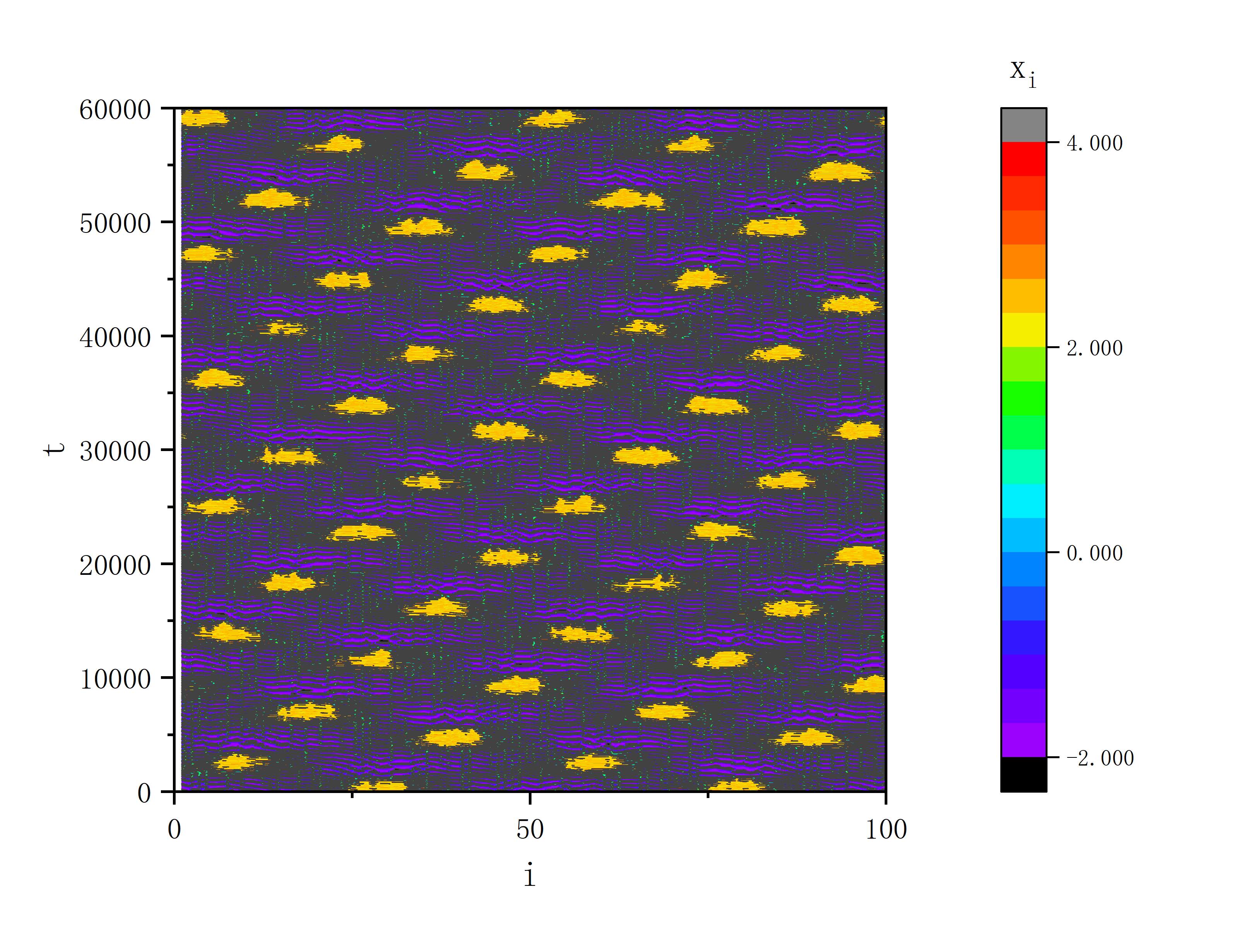
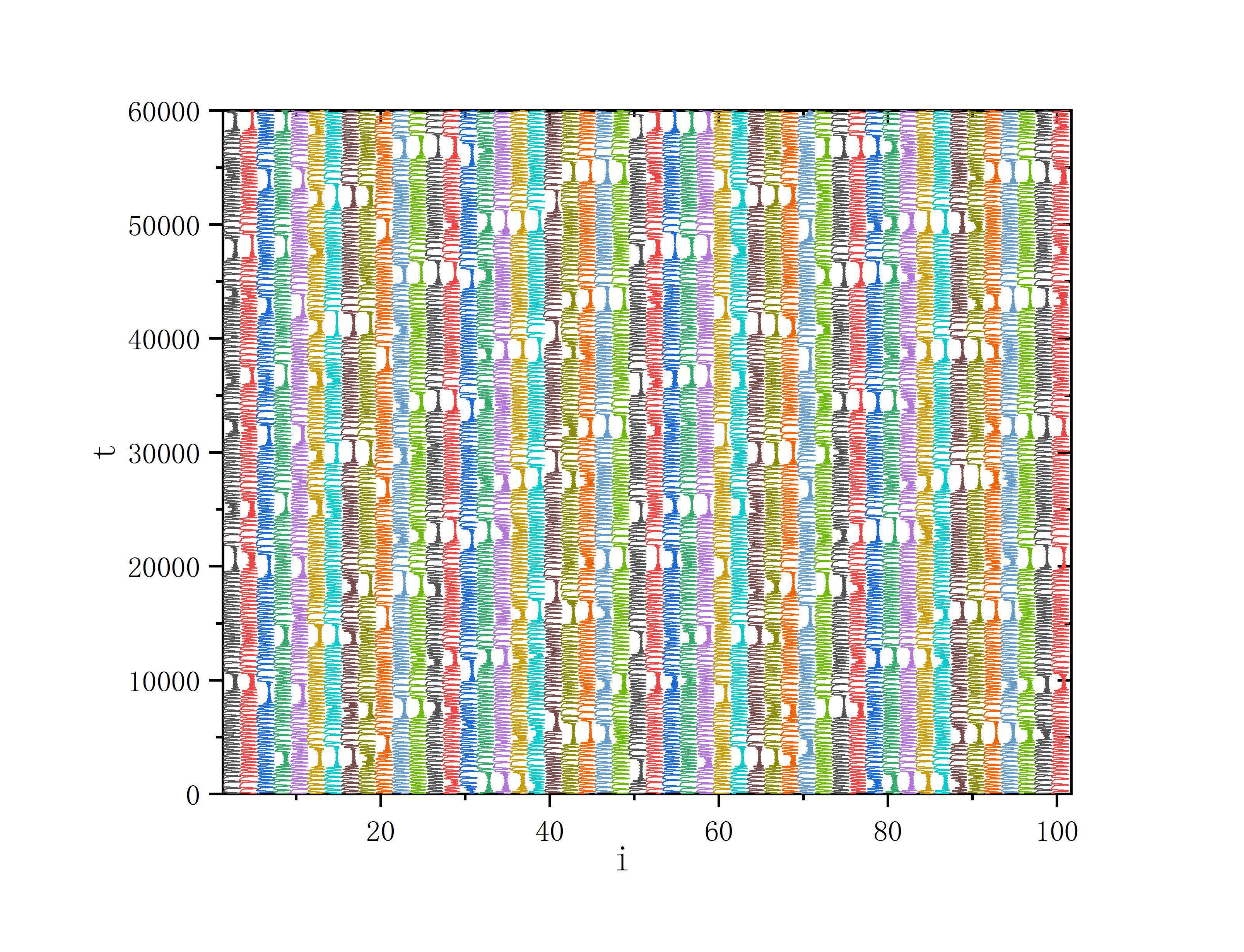
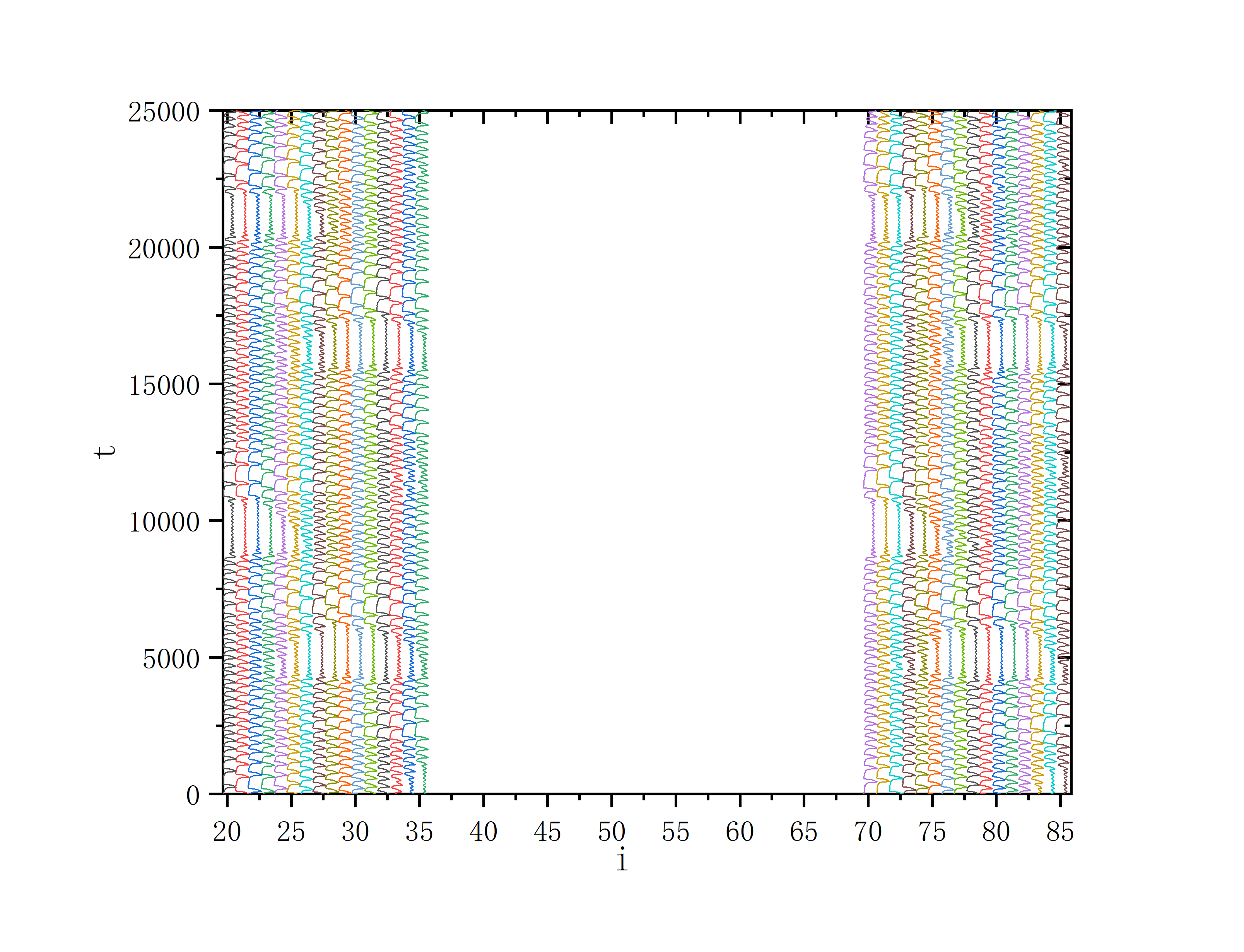
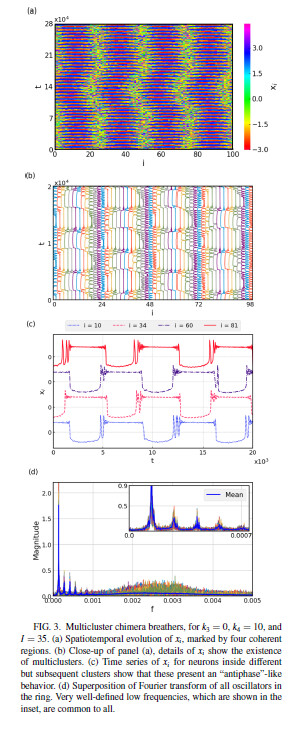
module HR
implicit none
real,parameter :: h=0.01
integer,parameter :: N=100,MaxT=6079600
integer,allocatable :: neighbour_matrix_2(:,:),neighbour_matrix_2P(:,:)
real :: x(N),y(N),z(N),E(N)
contains
subroutine x0_y0_z0()
implicit none
integer :: k
real :: x1,x2,x3
call random_seed()
do k=1,N,1
read(101,*) x(k),y(k),z(k)
end do
end subroutine x0_y0_z0
subroutine fnf(p)
implicit none
integer :: i,j,p,t
real :: func_x(N),func_y(N),func_z(N),func_e(N),a,b,d,k1,k2,k3,k4,II,JJ(N),C(N),r,s,x_i0,E_ext,x_s,&
&lambda,thet_s,C1(N),C2(N)
k1=0.0
k2=0.0
k3=0.0
k4=10.0
a=1.0
b=3.0
d=5.0
r=0.01
s=5.0
x_s=2.0
x_i0=-1.6
lambda=10.0
thet_s=-0.25
E_ext=0.0
E=0.0
II=35
do t=1,MaxT,1
if(mod(t,5000)==0) then
write(*,*) t
end if
JJ=0.0
C1=0.0
C2=0.0
C=0.0
do i=1,N,1
do j=1,N,1
JJ(i)=JJ(i)+neighbour_matrix_2(i,j)*(x(j)-x(i))
C1(i)=C1(i)+neighbour_matrix_2P(i,j)*(1.0/(1.0+exp(-lambda*(x(j)-thet_s))))
C2(i)=C2(i)+neighbour_matrix_2(i,j)*(1.0/(1.0+exp(-lambda*(x(j)-thet_s))))
end do
C(i)=C1(i)-C2(i)
func_x(i)=x(i)+h*(y(i)-a*x(i)**3+b*x(i)**2-z(i)+II+k3*JJ(i)+((-k4/(2.0*p-2.0))*(x_s-x(i))*C(i)))
func_y(i)=y(i)+h*(1.0-d*x(i)**2-y(i))
func_z(i)=z(i)+h*(r*(s*(x(i)-x_i0)-z(i)))
if(t>5799600.and.mod(t,500)==0) then
write(102,*) i,t-5799600,x(i)
end if
if(i==60.and.t>6059600) then
write(105,*) t-6059600,x(i)
end if
if(mod(i,2)==0.and.t>6059600) then
write(i,*) t-6059600,x(i)+6.0*(i/2.0)
end if
end do
x=func_x
y=func_y
z=func_z
end do
return
end subroutine fnf
subroutine neighbour_2(K)
implicit none
integer :: K
integer :: i,j,number
allocate(neighbour_matrix_2(N,N))
neighbour_matrix_2=0
do i=1,N-1,1
do j=i+1,N,1
if(abs(i-j)<=K/2.or.abs(i-j)>=N-K/2) then
neighbour_matrix_2(i,j)=1
neighbour_matrix_2(j,i)=1
end if
end do
end do
do i=1,N,1
do j=1,N,1
write(103,"(I2)",advance='no') neighbour_matrix_2(i,j)
end do
write(103,*)
end do
return
end subroutine neighbour_2
subroutine neighbour_2P(K)
implicit none
integer :: K
integer :: i,j,number
allocate(neighbour_matrix_2P(N,N))
neighbour_matrix_2P=0
do i=1,N-1,1
do j=i+1,N,1
if((abs(i-j)<=K/2.or.abs(i-j)>=N-K/2).and.abs(i-j)/=1) then
neighbour_matrix_2P(i,j)=1
neighbour_matrix_2P(j,i)=1
end if
end do
end do
do i=1,N,1
do j=1,N,1
write(104,"(I2)",advance='no') neighbour_matrix_2P(i,j)
end do
write(104,*)
end do
return
end subroutine neighbour_2P
end module HR
program main
use HR
implicit none
integer :: p
p=40
open(101,file="data_x0_y0_z0.txt")
open(102,file="data_i_t_x.txt")
open(103,file="neighbour_matrix_2.txt")
open(104,file="neighbour_matrix_2P.txt")
open(105,file="t_x_60.txt")
call x0_y0_z0()
call neighbour_2(2)
call neighbour_2P(2*p+2)
call fnf(p)
deallocate(neighbour_matrix_2)
deallocate(neighbour_matrix_2P)
close(101)
close(102)
close(103)
close(104)
end program main
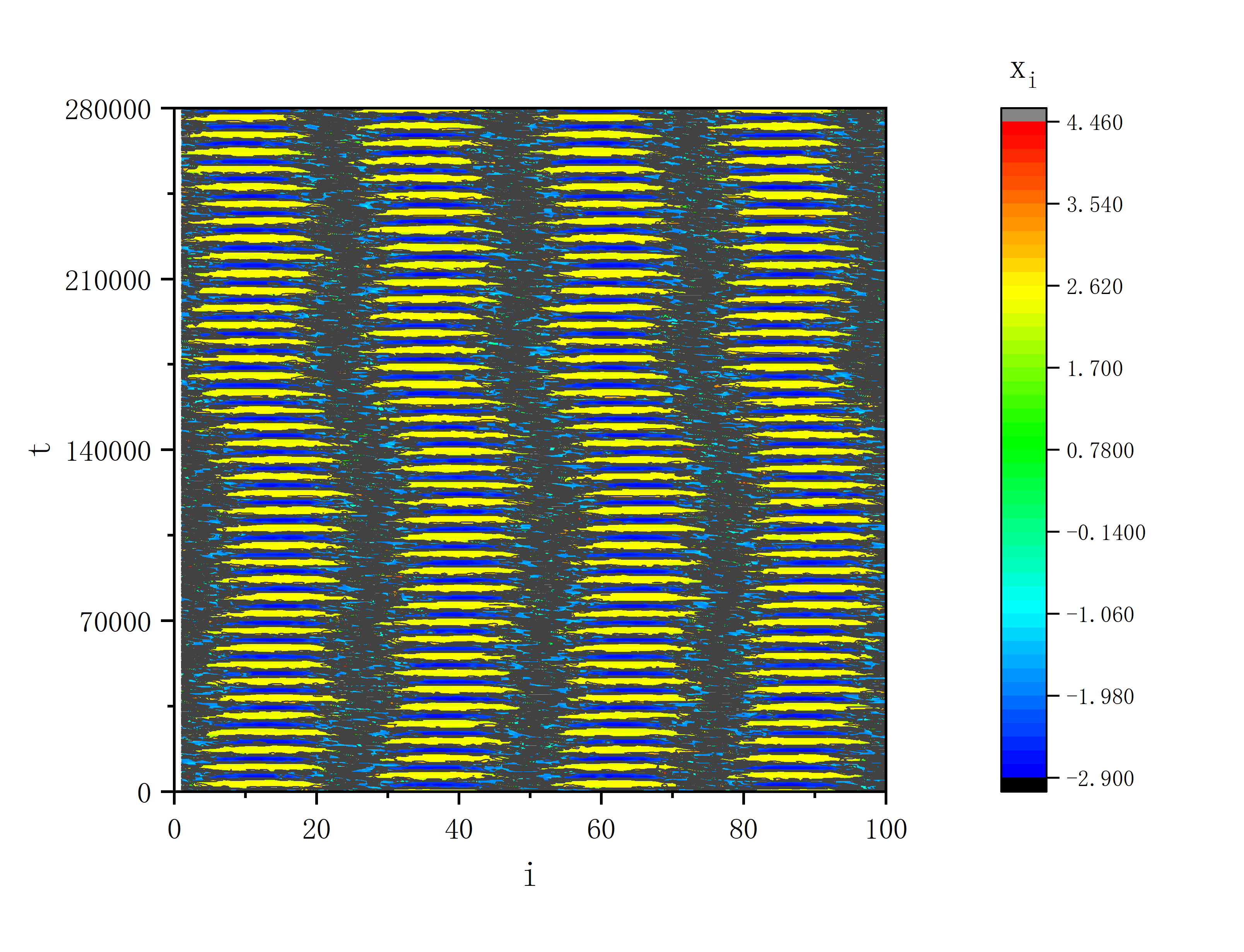
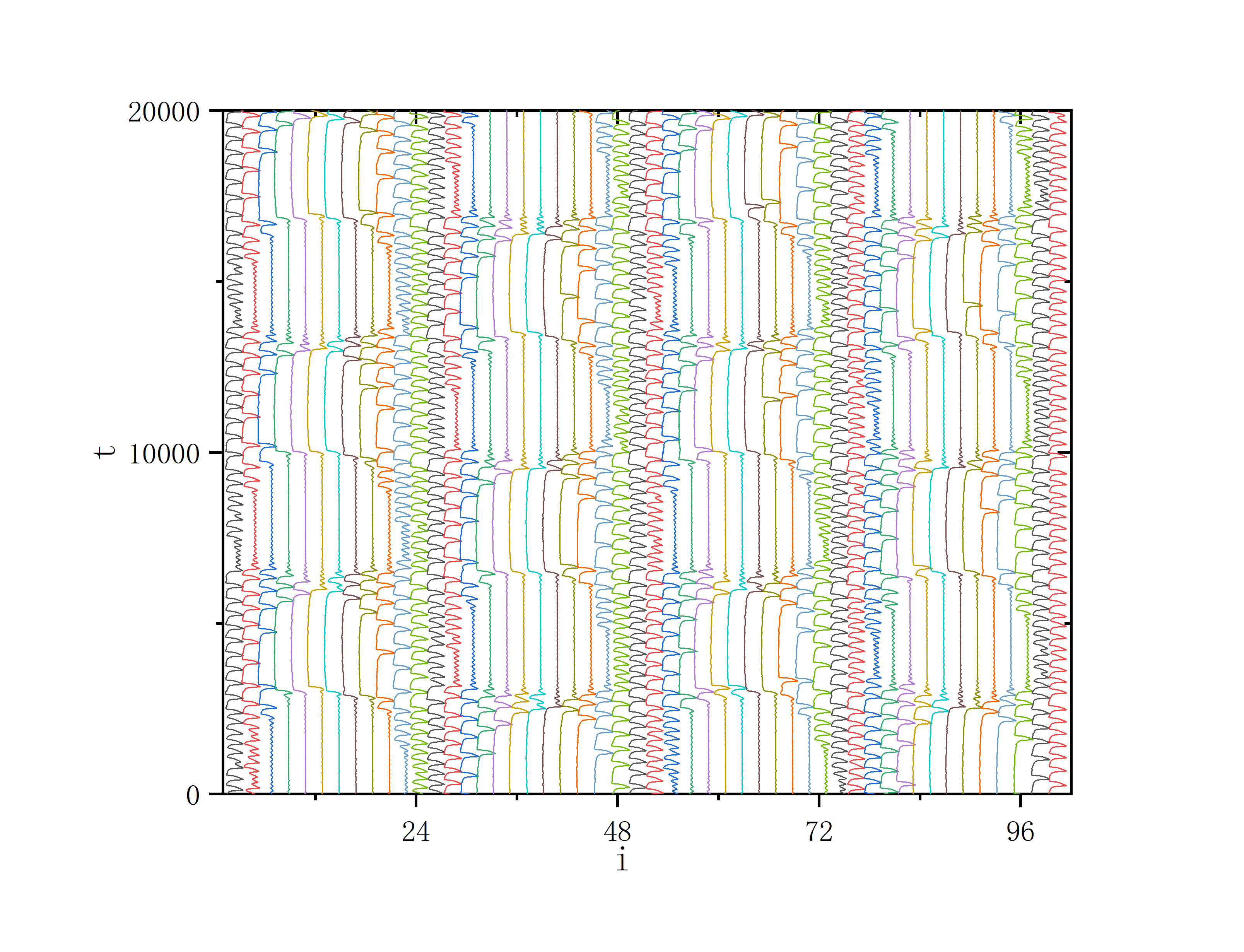
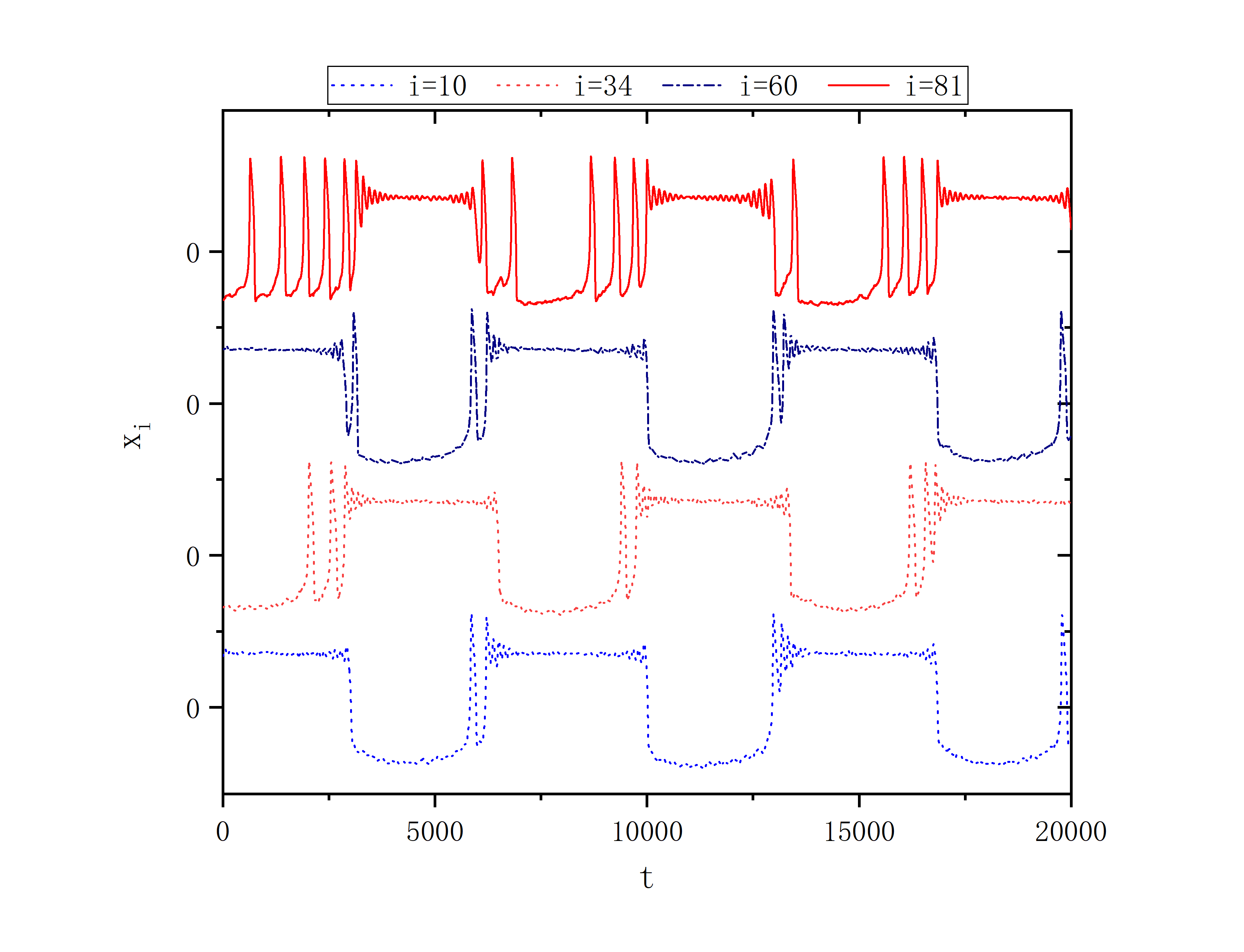
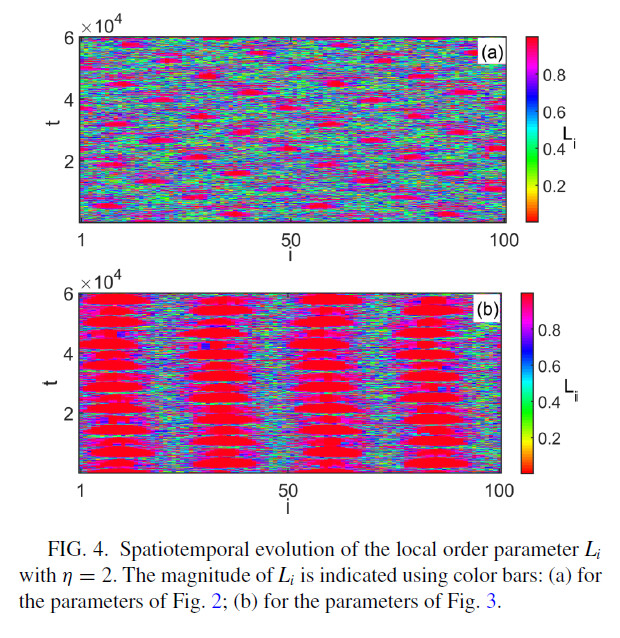
module HR
implicit none
real,parameter :: h=0.01
integer,parameter :: N=100,MaxT=90000
integer,allocatable :: neighbour_matrix_2(:,:),neighbour_matrix_3(:,:),neighbour_matrix_2P(:,:)
real :: x(N),y(N),z(N),E(N)
contains
subroutine x0_y0_z0()
implicit none
integer :: k
real :: x1,x2,x3
call random_seed()
do k=1,N,1
call random_number(x1)
call random_number(x2)
call random_number(x3)
x(k)=0.001*(k-N/2.0)+x1
y(k)=0.002*(k-N/2.0)+x2
z(k)=0.003*(k-N/2.0)+x3
write(101,*) x(k),y(k),z(k)
end do
end subroutine x0_y0_z0
subroutine fnf(p)
implicit none
integer :: i,j,p,t
real :: func_x(N),func_y(N),func_z(N),func_e(N),a,b,d,k1,k2,k3,k4,II,JJ(N),C(N),r,s,x_i0,E_ext,x_s,&
&lambda,thet_s,C1(N),C2(N),Li(N)
k1=0.0
k2=0.0
k3=0.0
k4=10.0
a=1.0
b=3.0
d=5.0
r=0.01
s=5.0
x_s=2.0
x_i0=-1.6
lambda=10.0
thet_s=-0.25
E_ext=0.0
E=0.0
II=35.0
do t=1,MaxT,1
if(mod(t,5000)==0) then
write(*,*) t
end if
JJ=0.0
C1=0.0
C2=0.0
C=0.0
do i=1,N,1
do j=1,N,1
JJ(i)=JJ(i)+neighbour_matrix_2(i,j)*(x(j)-x(i))
C1(i)=C1(i)+neighbour_matrix_2P(i,j)*(1.0/(1.0+exp(-lambda*(x(j)-thet_s))))
C2(i)=C2(i)+neighbour_matrix_2(i,j)*(1.0/(1.0+exp(-lambda*(x(j)-thet_s))))
end do
C(i)=C1(i)-C2(i)
func_x(i)=x(i)+h*(y(i)-a*x(i)**3+b*x(i)**2-z(i)+II+k3*JJ(i)+((-k4/(2.0*p-2.0))*(x_s-x(i))*C(i)))
func_y(i)=y(i)+h*(1.0-d*x(i)**2-y(i))
func_z(i)=z(i)+h*(r*(s*(x(i)-x_i0)-z(i)))
if(t>30000.and.mod(t,50)==0) then
call parameter_Li(x,y,i,Li)
write(102,*) i,t-30000,Li(i)
end if
end do
x=func_x
y=func_y
z=func_z
end do
return
end subroutine fnf
subroutine parameter_Li(x,y,i,Li)
implicit none
real :: x(N),y(N),Ans_L_X,Ans_L_Y,Li(N),eta
integer :: i,j
Ans_L_X=0.0
Ans_L_Y=0.0
eta=2.0
do j=1,N,1
Ans_L_X=Ans_L_X+neighbour_matrix_3(i,j)*(cos(atan(y(j)/x(j))))
Ans_L_Y=Ans_L_Y+neighbour_matrix_3(i,j)*(sin(atan(y(j)/x(j))))
end do
Li(i)=sqrt((Ans_L_X/(2.0*eta))**2+(Ans_L_Y/(2.0*eta))**2)
return
end subroutine parameter_Li
subroutine neighbour_2(K)
implicit none
integer :: K
integer :: i,j,number
allocate(neighbour_matrix_2(N,N))
neighbour_matrix_2=0
do i=1,N-1,1
do j=i+1,N,1
if(abs(i-j)<=K/2.or.abs(i-j)>=N-K/2) then
neighbour_matrix_2(i,j)=1
neighbour_matrix_2(j,i)=1
end if
end do
end do
do i=1,N,1
do j=1,N,1
write(103,"(I2)",advance='no') neighbour_matrix_2(i,j)
end do
write(103,*)
end do
return
end subroutine neighbour_2
subroutine neighbour_3(K)
implicit none
integer :: K
integer :: i,j,number
allocate(neighbour_matrix_3(N,N))
neighbour_matrix_3=0
do i=1,N-1,1
do j=i+1,N,1
if((abs(i-j)<=K/2.or.abs(i-j)>=N-K/2).and.abs(i-j)<=2) then
neighbour_matrix_3(i,j)=1
neighbour_matrix_3(j,i)=1
end if
end do
end do
do i=1,N,1
do j=1,N,1
write(105,"(I2)",advance='no') neighbour_matrix_3(i,j)
end do
write(105,*)
end do
return
end subroutine neighbour_3
subroutine neighbour_2P(K)
implicit none
integer :: K
integer :: i,j,number
allocate(neighbour_matrix_2P(N,N))
neighbour_matrix_2P=0
do i=1,N-1,1
do j=i+1,N,1
if((abs(i-j)<=K/2.or.abs(i-j)>=N-K/2).and.abs(i-j)/=1) then
neighbour_matrix_2P(i,j)=1
neighbour_matrix_2P(j,i)=1
end if
end do
end do
do i=1,N,1
do j=1,N,1
write(104,"(I2)",advance='no') neighbour_matrix_2P(i,j)
end do
write(104,*)
end do
return
end subroutine neighbour_2P
end module HR
program main
use HR
implicit none
integer :: p
p=40
open(101,file="data_x0_y0_z0.txt")
open(102,file="data_i_t_Li.txt")
open(103,file="neighbour_matrix_2.txt")
open(104,file="neighbour_matrix_2P.txt")
open(105,file="neighbour_matrix_3.txt")
call x0_y0_z0()
call neighbour_2(2)
call neighbour_3(4)
call neighbour_2P(2*p+2)
call fnf(p)
deallocate(neighbour_matrix_2)
deallocate(neighbour_matrix_2P)
close(101)
close(102)
close(103)
close(104)
close(105)
end program main
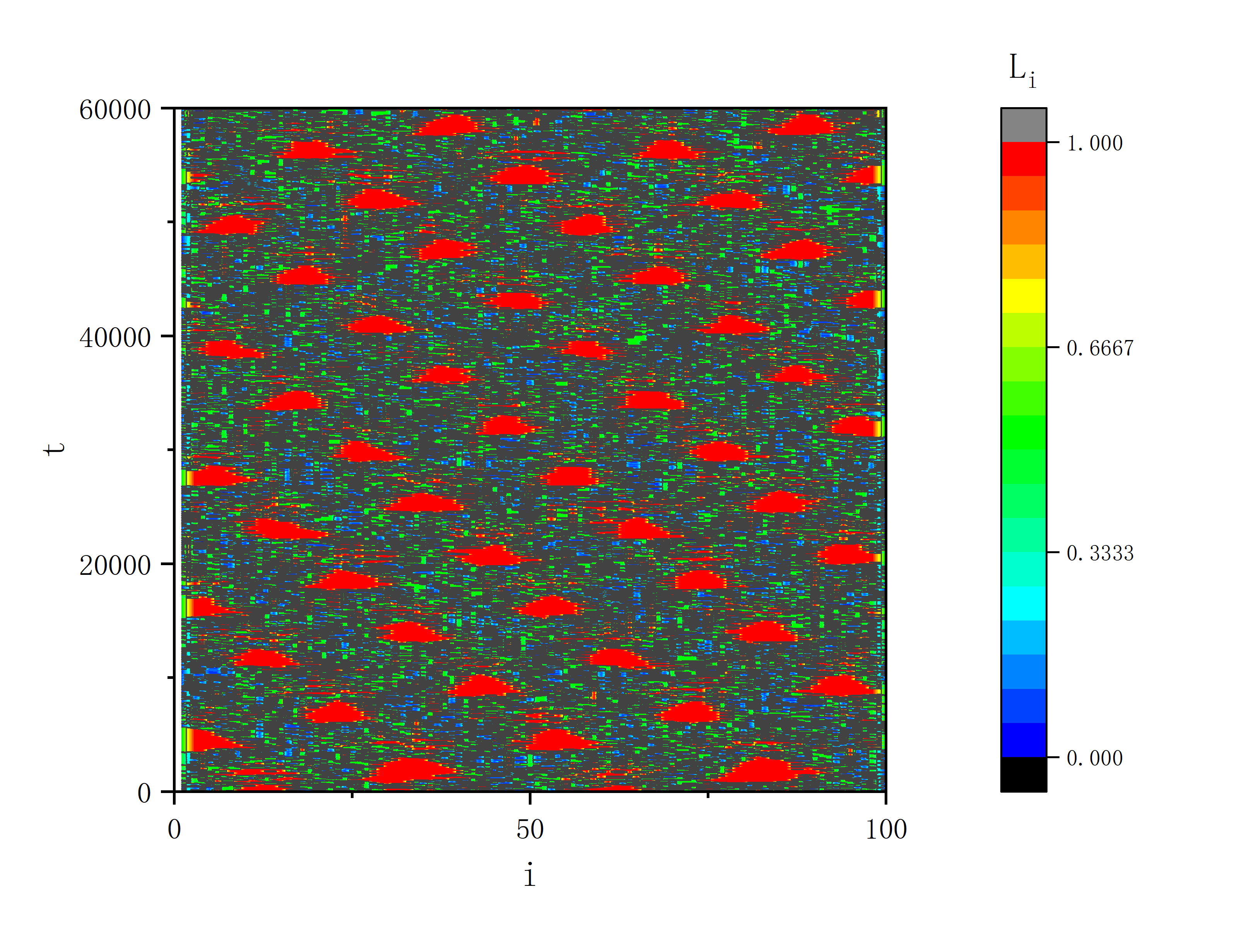
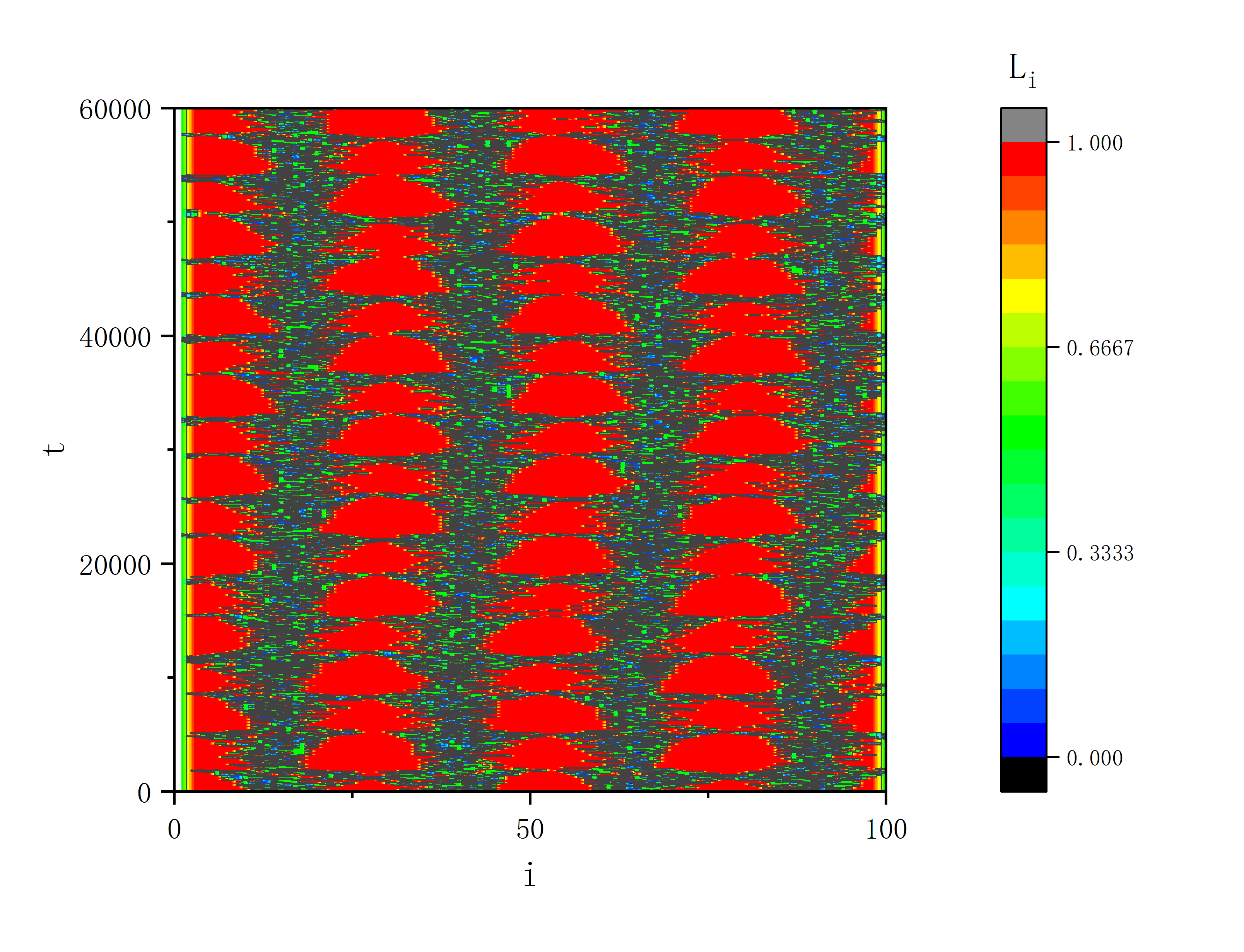
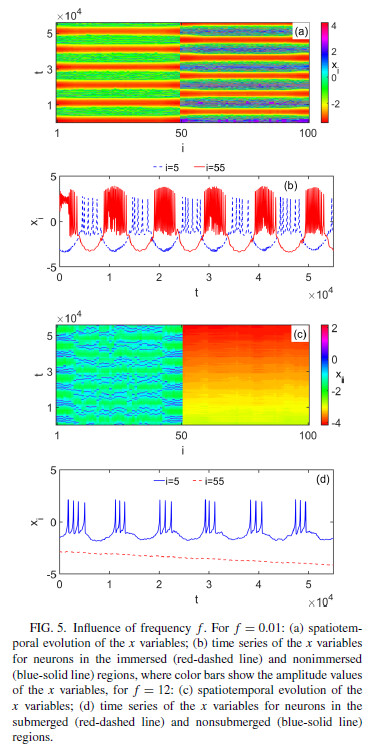
module HR
implicit none
real,parameter :: h=0.01,PI=3.1415926
integer,parameter :: N=100,MaxT=260000
integer,allocatable :: neighbour_matrix_2(:,:),neighbour_matrix_2P(:,:)
real :: x(N),y(N),z(N),E(N)
contains
subroutine x0_y0_z0()
implicit none
integer :: k
real :: x1,x2,x3
call random_seed()
do k=1,N,1
call random_number(x1)
call random_number(x2)
call random_number(x3)
x(k)=0.001*(k-N/2.0)+x1
y(k)=0.002*(k-N/2.0)+x2
z(k)=0.003*(k-N/2.0)+x3
write(101,*) x(k),y(k),z(k)
end do
end subroutine x0_y0_z0
subroutine fnf(p)
implicit none
integer :: i,j,p,t
real :: func_x(N),func_y(N),func_z(N),func_e(N),a,b,d,k1,k2,k3,k4,II,JJ(N),C(N),r,s,x_i0,E_ext,x_s,&
&lambda,thet_s,C1(N),C2(N),Li(N),Em,f
k1=0.7
k2=0.001
k3=0.0
k4=9.0
a=1.0
b=3.0
d=5.0
r=0.01
s=5.0
x_s=2.0
x_i0=-1.6
lambda=10.0
thet_s=-0.25
E_ext=0.0
E=0.0
Em=1.5
f=0.01
II=3.5
do t=1,MaxT,1
if(mod(t,5000)==0) then
write(*,*) t
end if
JJ=0.0
C1=0.0
C2=0.0
C=0.0
do i=1,N,1
do j=1,N,1
JJ(i)=JJ(i)+neighbour_matrix_2(i,j)*(x(j)-x(i))
C1(i)=C1(i)+neighbour_matrix_2P(i,j)*(1.0/(1.0+exp(-lambda*(x(j)-thet_s))))
C2(i)=C2(i)+neighbour_matrix_2(i,j)*(1.0/(1.0+exp(-lambda*(x(j)-thet_s))))
end do
C(i)=C1(i)-C2(i)
func_x(i)=x(i)+h*(y(i)-a*x(i)**3+b*x(i)**2-z(i)+II+k3*JJ(i)+((-k4/(2.0*p-2.0))*(x_s-x(i))*C(i)))
func_y(i)=y(i)+h*(1.0-d*x(i)**2-y(i)+k1*E(i))
func_z(i)=z(i)+h*(r*(s*(x(i)-x_i0)-z(i)))
if(i>50.and.t>100000) then
func_e(i)=E(i)+h*(k2*y(i)+Em*sin(2.0*PI*f*(t-100000)*h))
else
func_e(i)=0.0
end if
if(t>200000.and.mod(t,50)==0) then
write(102,*) i,t-200000,x(i)
end if
if(t>200000.and.i==5) then
write(105,*) t-200000,x(i)
end if
if(t>200000.and.i==55) then
write(106,*) t-200000,x(i)
end if
end do
x=func_x
y=func_y
z=func_z
E=func_e
end do
return
end subroutine fnf
subroutine neighbour_2(K)
implicit none
integer :: K
integer :: i,j,number
allocate(neighbour_matrix_2(N,N))
neighbour_matrix_2=0
do i=1,N-1,1
do j=i+1,N,1
if(abs(i-j)<=K/2.or.abs(i-j)>=N-K/2) then
neighbour_matrix_2(i,j)=1
neighbour_matrix_2(j,i)=1
end if
end do
end do
do i=1,N,1
do j=1,N,1
write(103,"(I2)",advance='no') neighbour_matrix_2(i,j)
end do
write(103,*)
end do
return
end subroutine neighbour_2
subroutine neighbour_2P(K)
implicit none
integer :: K
integer :: i,j,number
allocate(neighbour_matrix_2P(N,N))
neighbour_matrix_2P=0
do i=1,N-1,1
do j=i+1,N,1
if((abs(i-j)<=K/2.or.abs(i-j)>=N-K/2).and.abs(i-j)/=1) then
neighbour_matrix_2P(i,j)=1
neighbour_matrix_2P(j,i)=1
end if
end do
end do
do i=1,N,1
do j=1,N,1
write(104,"(I2)",advance='no') neighbour_matrix_2P(i,j)
end do
write(104,*)
end do
return
end subroutine neighbour_2P
end module HR
program main
use HR
implicit none
integer :: p
p=40
open(101,file="data_x0_y0_z0.txt")
open(102,file="data_i_t_x.txt")
open(103,file="neighbour_matrix_2.txt")
open(104,file="neighbour_matrix_2P.txt")
open(105,file="t_x_5.txt")
open(106,file="t_x_55.txt")
call x0_y0_z0()
call neighbour_2(2)
call neighbour_2P(2*p+2)
call fnf(p)
deallocate(neighbour_matrix_2)
deallocate(neighbour_matrix_2P)
close(101)
close(102)
close(103)
close(104)
end program main
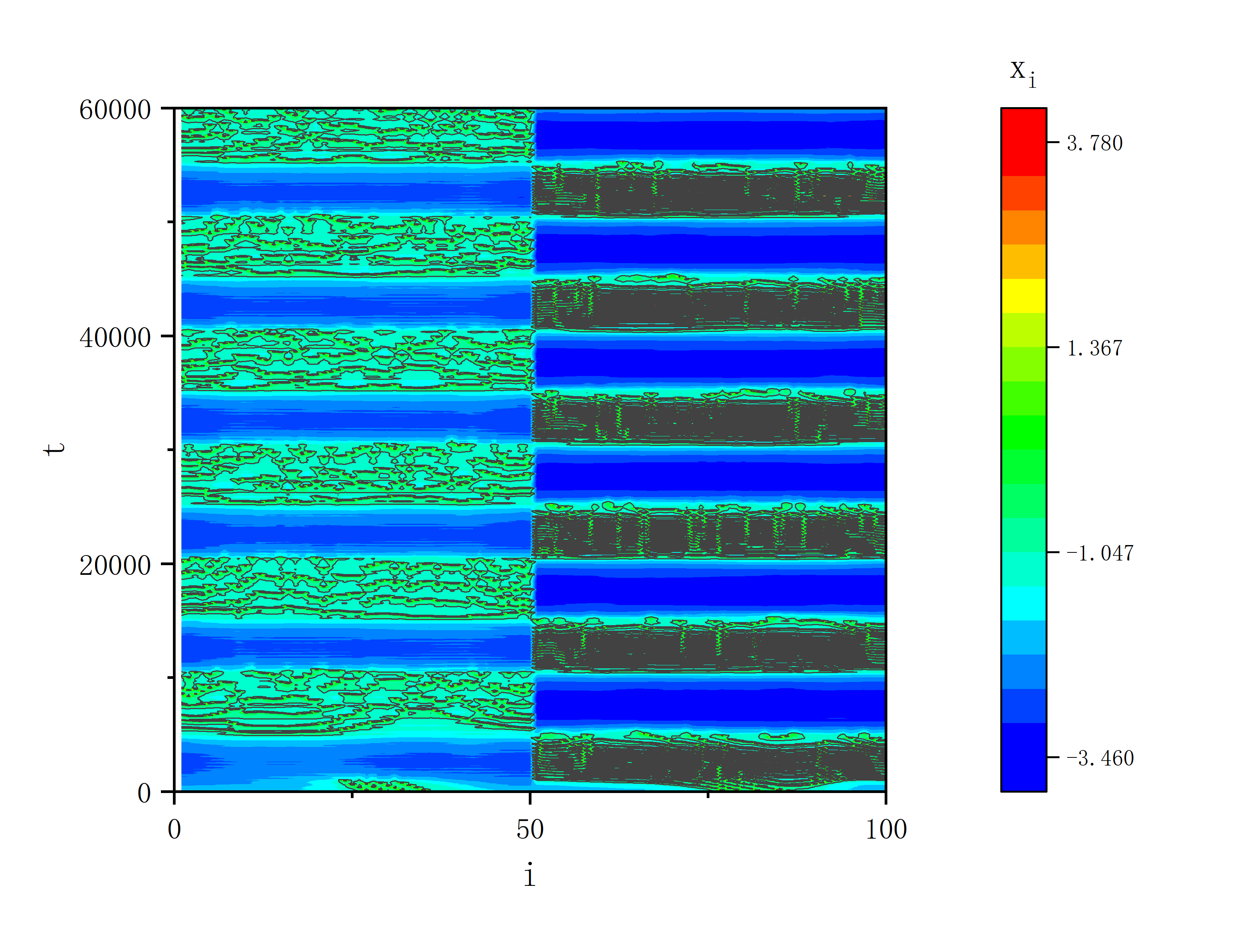
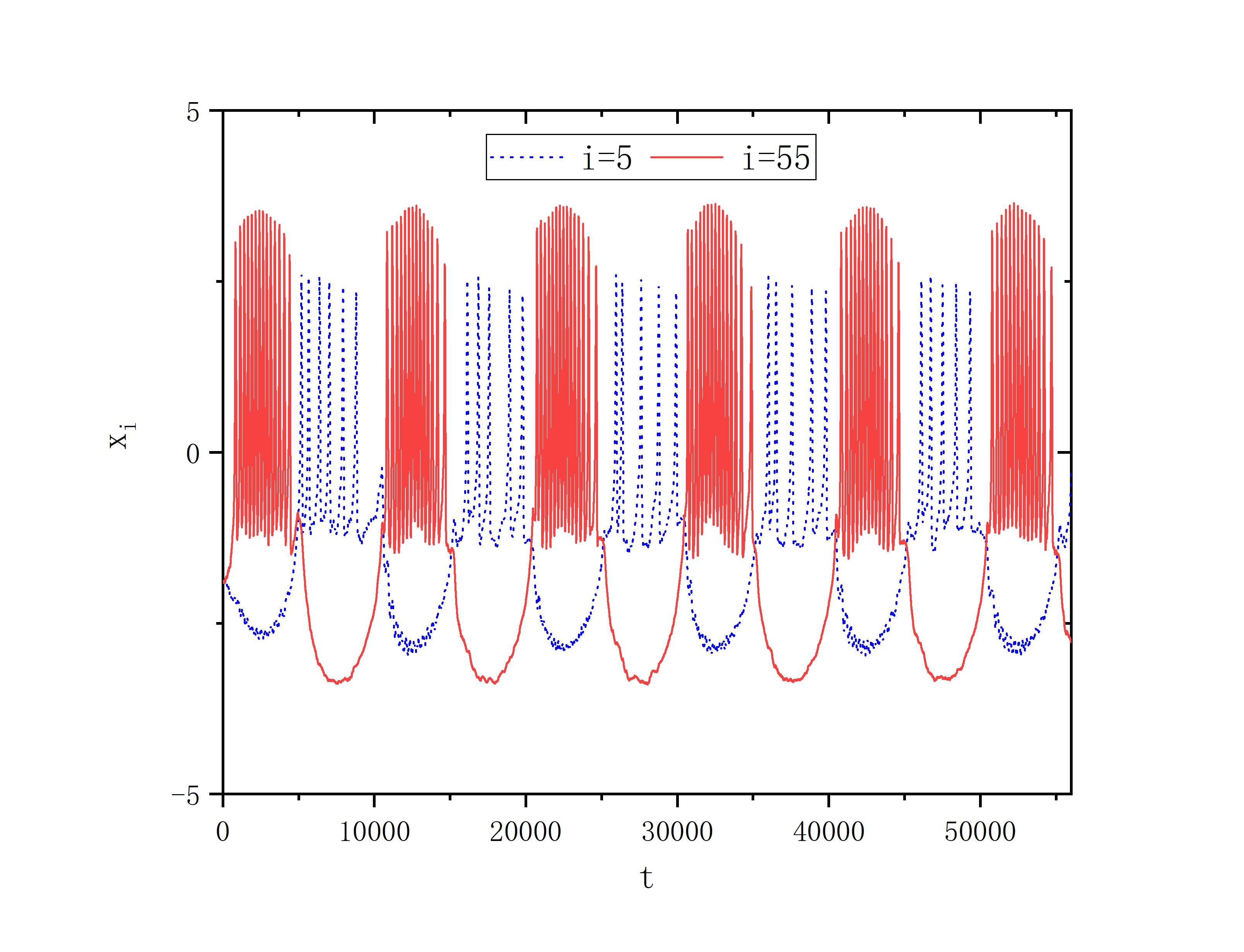
module HR
implicit none
real,parameter :: h=0.01,PI=3.1415926
integer,parameter :: N=100,MaxT=160000
integer,allocatable :: neighbour_matrix_2(:,:),neighbour_matrix_2P(:,:)
real :: x(N),y(N),z(N),E(N)
contains
subroutine x0_y0_z0()
implicit none
integer :: k
real :: x1,x2,x3
call random_seed()
do k=1,N,1
call random_number(x1)
call random_number(x2)
call random_number(x3)
x(k)=0.001*(k-N/2.0)+x1
y(k)=0.002*(k-N/2.0)+x2
z(k)=0.003*(k-N/2.0)+x3
write(101,*) x(k),y(k),z(k)
end do
end subroutine x0_y0_z0
subroutine fnf(p)
implicit none
integer :: i,j,p,t
real :: func_x(N),func_y(N),func_z(N),func_e(N),a,b,d,k1,k2,k3,k4,II,JJ(N),C(N),r,s,x_i0,E_ext,x_s,&
&lambda,thet_s,C1(N),C2(N),Li(N),Em,f
k1=0.7
k2=0.001
k3=0.0
k4=9.0
a=1.0
b=3.0
d=5.0
r=0.01
s=5.0
x_s=2.0
x_i0=-1.6
lambda=10.0
thet_s=-0.25
E_ext=0.0
E=0.0
Em=1.5
f=12.0
II=3.5
do t=1,MaxT,1
if(mod(t,5000)==0) then
write(*,*) t
end if
JJ=0.0
C1=0.0
C2=0.0
C=0.0
do i=1,N,1
do j=1,N,1
JJ(i)=JJ(i)+neighbour_matrix_2(i,j)*(x(j)-x(i))
C1(i)=C1(i)+neighbour_matrix_2P(i,j)*(1.0/(1.0+exp(-lambda*(x(j)-thet_s))))
C2(i)=C2(i)+neighbour_matrix_2(i,j)*(1.0/(1.0+exp(-lambda*(x(j)-thet_s))))
end do
C(i)=C1(i)-C2(i)
func_x(i)=x(i)+h*(y(i)-a*x(i)**3+b*x(i)**2-z(i)+II+k3*JJ(i)+((-k4/(2.0*p-2.0))*(x_s-x(i))*C(i)))
func_y(i)=y(i)+h*(1.0-d*x(i)**2-y(i)+k1*E(i))
func_z(i)=z(i)+h*(r*(s*(x(i)-x_i0)-z(i)))
if(i>50) then
func_e(i)=E(i)+h*(k2*y(i)+Em*sin(2.0*PI*f*t*h))
else
func_e(i)=0.0
end if
if(t>100000.and.mod(t,200)==0) then
write(102,*) i,t-100000,x(i)
end if
if(t>100000.and.i==5) then
write(105,*) t-100000,x(i)
end if
if(t>100000.and.i==55) then
write(106,*) t-100000,x(i)
end if
end do
x=func_x
y=func_y
z=func_z
E=func_e
end do
return
end subroutine fnf
subroutine neighbour_2(K)
implicit none
integer :: K
integer :: i,j,number
allocate(neighbour_matrix_2(N,N))
neighbour_matrix_2=0
do i=1,N-1,1
do j=i+1,N,1
if(abs(i-j)<=K/2.or.abs(i-j)>=N-K/2) then
neighbour_matrix_2(i,j)=1
neighbour_matrix_2(j,i)=1
end if
end do
end do
do i=1,N,1
do j=1,N,1
write(103,"(I2)",advance='no') neighbour_matrix_2(i,j)
end do
write(103,*)
end do
return
end subroutine neighbour_2
subroutine neighbour_2P(K)
implicit none
integer :: K
integer :: i,j,number
allocate(neighbour_matrix_2P(N,N))
neighbour_matrix_2P=0
do i=1,N-1,1
do j=i+1,N,1
if((abs(i-j)<=K/2.or.abs(i-j)>=N-K/2).and.abs(i-j)/=1) then
neighbour_matrix_2P(i,j)=1
neighbour_matrix_2P(j,i)=1
end if
end do
end do
do i=1,N,1
do j=1,N,1
write(104,"(I2)",advance='no') neighbour_matrix_2P(i,j)
end do
write(104,*)
end do
return
end subroutine neighbour_2P
end module HR
program main
use HR
implicit none
integer :: p
p=40
open(101,file="data_x0_y0_z0.txt")
open(102,file="data_i_t_x.txt")
open(103,file="neighbour_matrix_2.txt")
open(104,file="neighbour_matrix_2P.txt")
open(105,file="t_x_5.txt")
open(106,file="t_x_55.txt")
call x0_y0_z0()
call neighbour_2(2)
call neighbour_2P(2*p+2)
call fnf(p)
deallocate(neighbour_matrix_2)
deallocate(neighbour_matrix_2P)
close(101)
close(102)
close(103)
close(104)
end program main
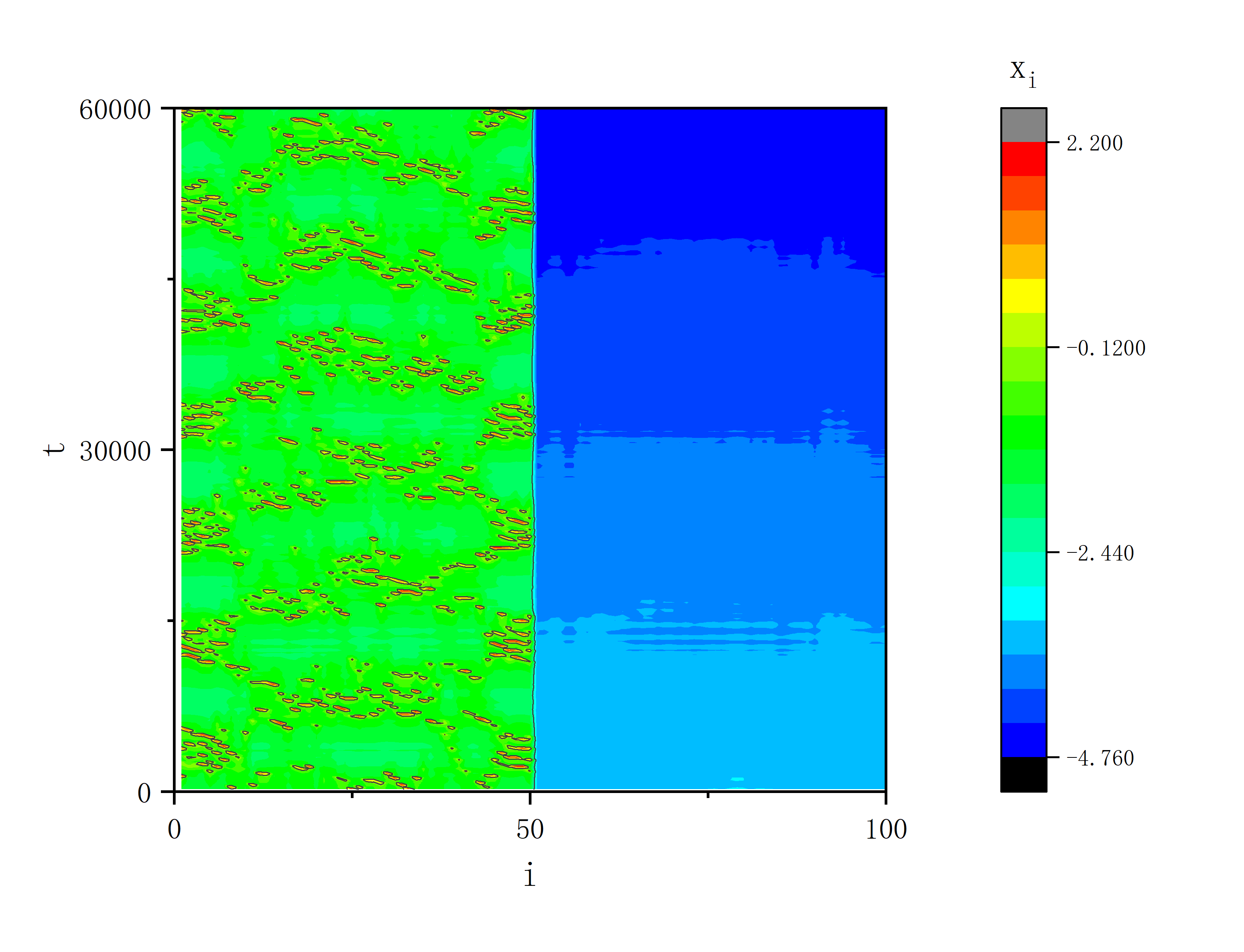
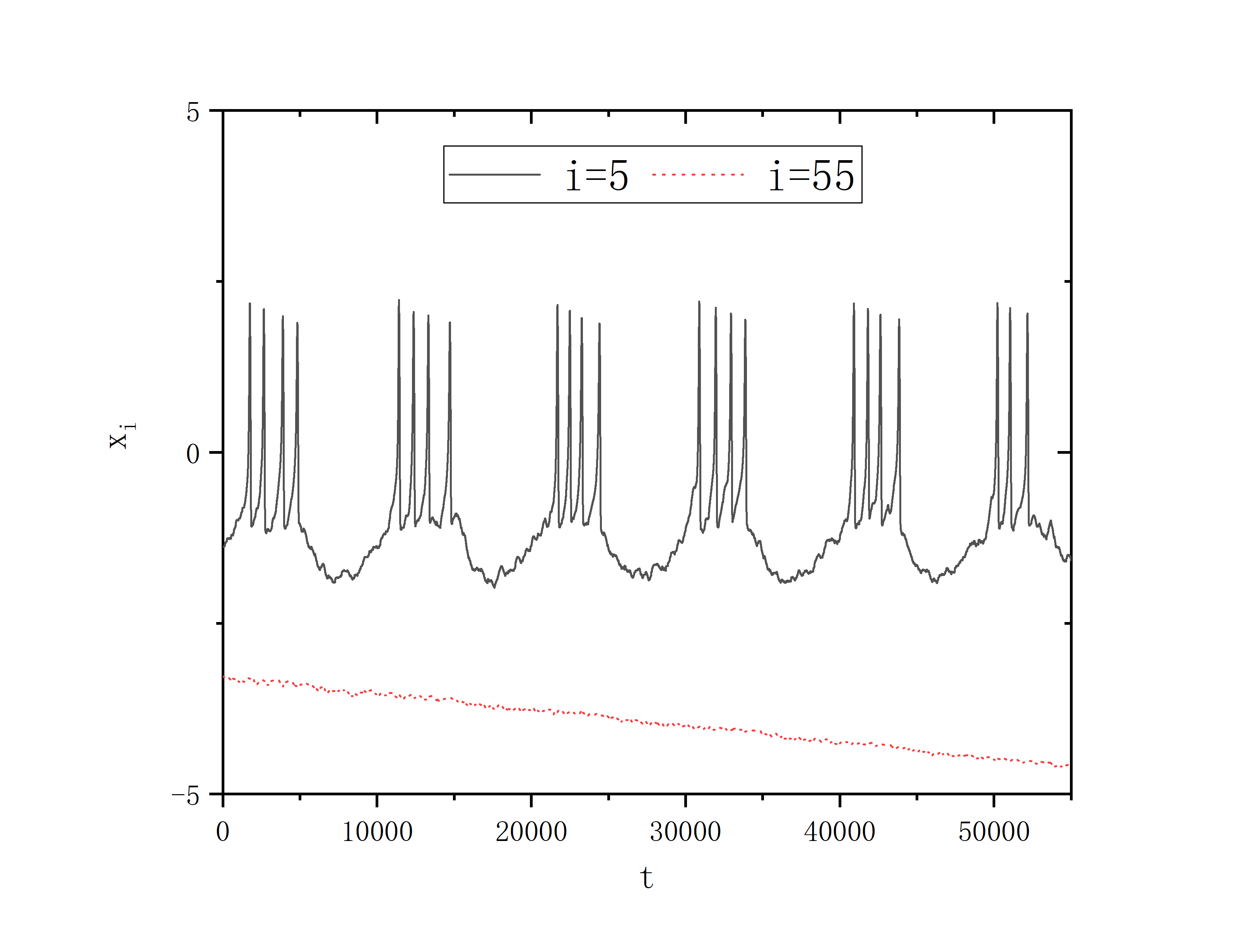
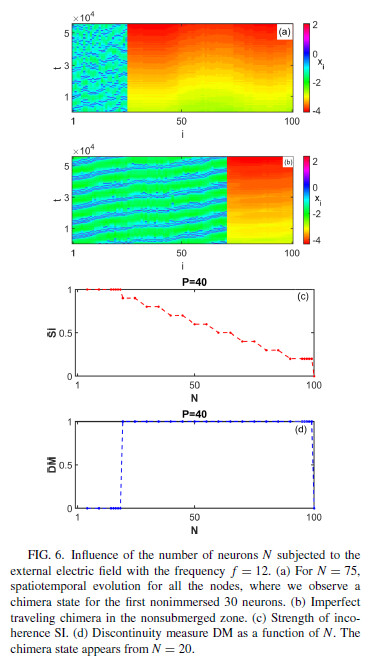
module HR
implicit none
real,parameter :: h=0.01,PI=3.1415926
integer,parameter :: N=100,MaxT=160000
integer,allocatable :: neighbour_matrix_2(:,:),neighbour_matrix_2P(:,:)
real :: x(N),y(N),z(N),E(N)
contains
subroutine x0_y0_z0()
implicit none
integer :: k
real :: x1,x2,x3
call random_seed()
do k=1,N,1
call random_number(x1)
call random_number(x2)
call random_number(x3)
x(k)=0.001*(k-N/2.0)+x1
y(k)=0.002*(k-N/2.0)+x2
z(k)=0.003*(k-N/2.0)+x3
write(101,*) x(k),y(k),z(k)
end do
end subroutine x0_y0_z0
subroutine fnf(p)
implicit none
integer :: i,j,p,t
real :: func_x(N),func_y(N),func_z(N),func_e(N),a,b,d,k1,k2,k3,k4,II,JJ(N),C(N),r,s,x_i0,E_ext,x_s,&
&lambda,thet_s,C1(N),C2(N),Li(N),Em,f
k1=0.7
k2=0.001
k3=0.0
k4=9.0
a=1.0
b=3.0
d=5.0
r=0.01
s=5.0
x_s=2.0
x_i0=-1.6
lambda=10.0
thet_s=-0.25
E_ext=0.0
E=0.0
Em=1.5
f=12.0
II=3.5
do t=1,MaxT,1
if(mod(t,5000)==0) then
write(*,*) t
end if
JJ=0.0
C1=0.0
C2=0.0
C=0.0
do i=1,N,1
do j=1,N,1
JJ(i)=JJ(i)+neighbour_matrix_2(i,j)*(x(j)-x(i))
C1(i)=C1(i)+neighbour_matrix_2P(i,j)*(1.0/(1.0+exp(-lambda*(x(j)-thet_s))))
C2(i)=C2(i)+neighbour_matrix_2(i,j)*(1.0/(1.0+exp(-lambda*(x(j)-thet_s))))
end do
C(i)=C1(i)-C2(i)
func_x(i)=x(i)+h*(y(i)-a*x(i)**3+b*x(i)**2-z(i)+II+k3*JJ(i)+((-k4/(2.0*p-2.0))*(x_s-x(i))*C(i)))
func_y(i)=y(i)+h*(1.0-d*x(i)**2-y(i)+k1*E(i))
func_z(i)=z(i)+h*(r*(s*(x(i)-x_i0)-z(i)))
if(i>25) then
func_e(i)=E(i)+h*(k2*y(i)+Em*sin(2.0*PI*f*t*h))
else
func_e(i)=0.0
end if
if(t>100000.and.mod(t,200)==0) then
write(102,*) i,t-100000,x(i)
end if
end do
x=func_x
y=func_y
z=func_z
E=func_e
end do
return
end subroutine fnf
subroutine neighbour_2(K)
implicit none
integer :: K
integer :: i,j,number
allocate(neighbour_matrix_2(N,N))
neighbour_matrix_2=0
do i=1,N-1,1
do j=i+1,N,1
if(abs(i-j)<=K/2.or.abs(i-j)>=N-K/2) then
neighbour_matrix_2(i,j)=1
neighbour_matrix_2(j,i)=1
end if
end do
end do
do i=1,N,1
do j=1,N,1
write(103,"(I2)",advance='no') neighbour_matrix_2(i,j)
end do
write(103,*)
end do
return
end subroutine neighbour_2
subroutine neighbour_2P(K)
implicit none
integer :: K
integer :: i,j,number
allocate(neighbour_matrix_2P(N,N))
neighbour_matrix_2P=0
do i=1,N-1,1
do j=i+1,N,1
if((abs(i-j)<=K/2.or.abs(i-j)>=N-K/2).and.abs(i-j)/=1) then
neighbour_matrix_2P(i,j)=1
neighbour_matrix_2P(j,i)=1
end if
end do
end do
do i=1,N,1
do j=1,N,1
write(104,"(I2)",advance='no') neighbour_matrix_2P(i,j)
end do
write(104,*)
end do
return
end subroutine neighbour_2P
end module HR
program main
use HR
implicit none
integer :: p
p=40
open(101,file="data_x0_y0_z0.txt")
open(102,file="data_i_t_x.txt")
open(103,file="neighbour_matrix_2.txt")
open(104,file="neighbour_matrix_2P.txt")
call x0_y0_z0()
call neighbour_2(2)
call neighbour_2P(2*p+2)
call fnf(p)
deallocate(neighbour_matrix_2)
deallocate(neighbour_matrix_2P)
close(101)
close(102)
close(103)
close(104)
end program main
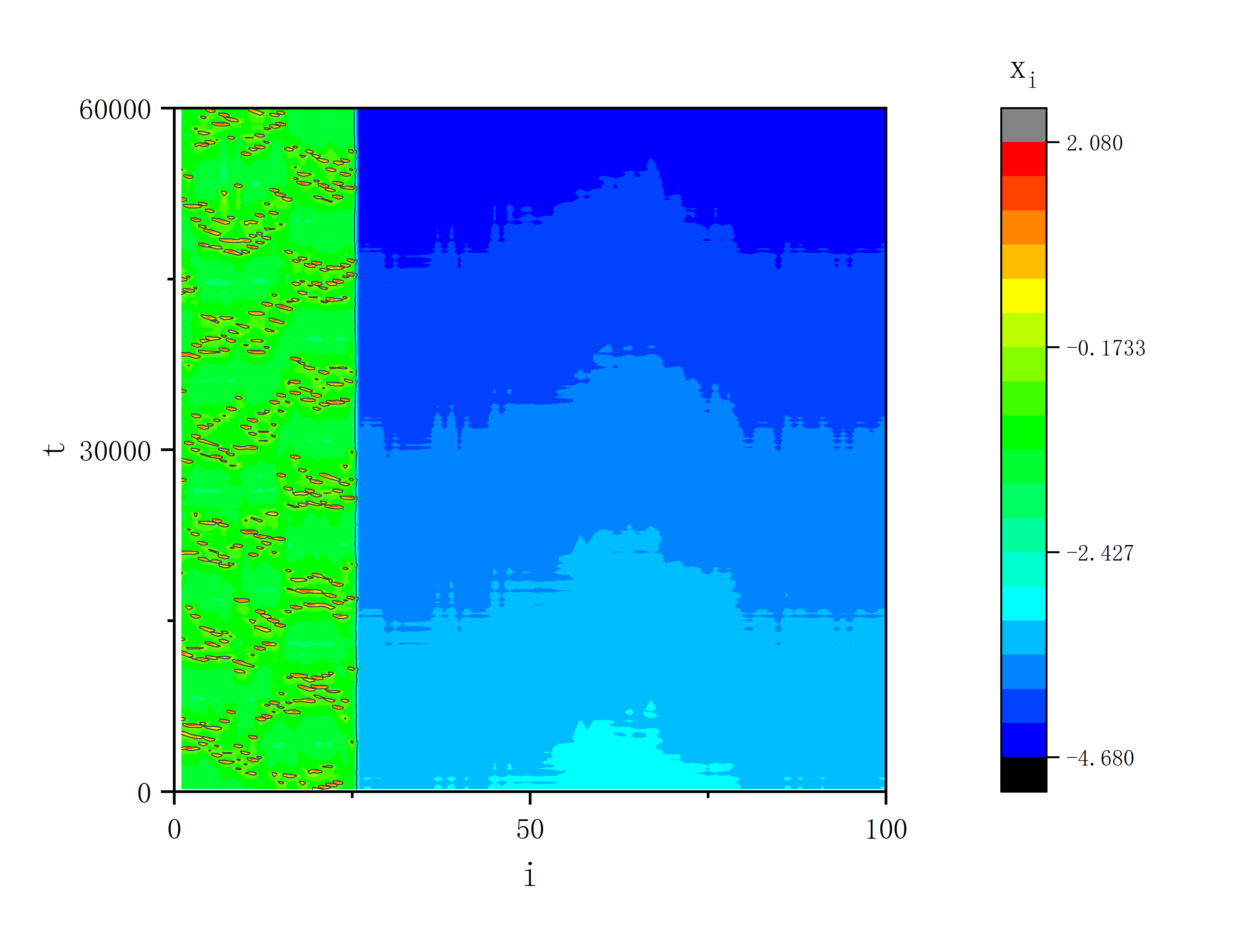
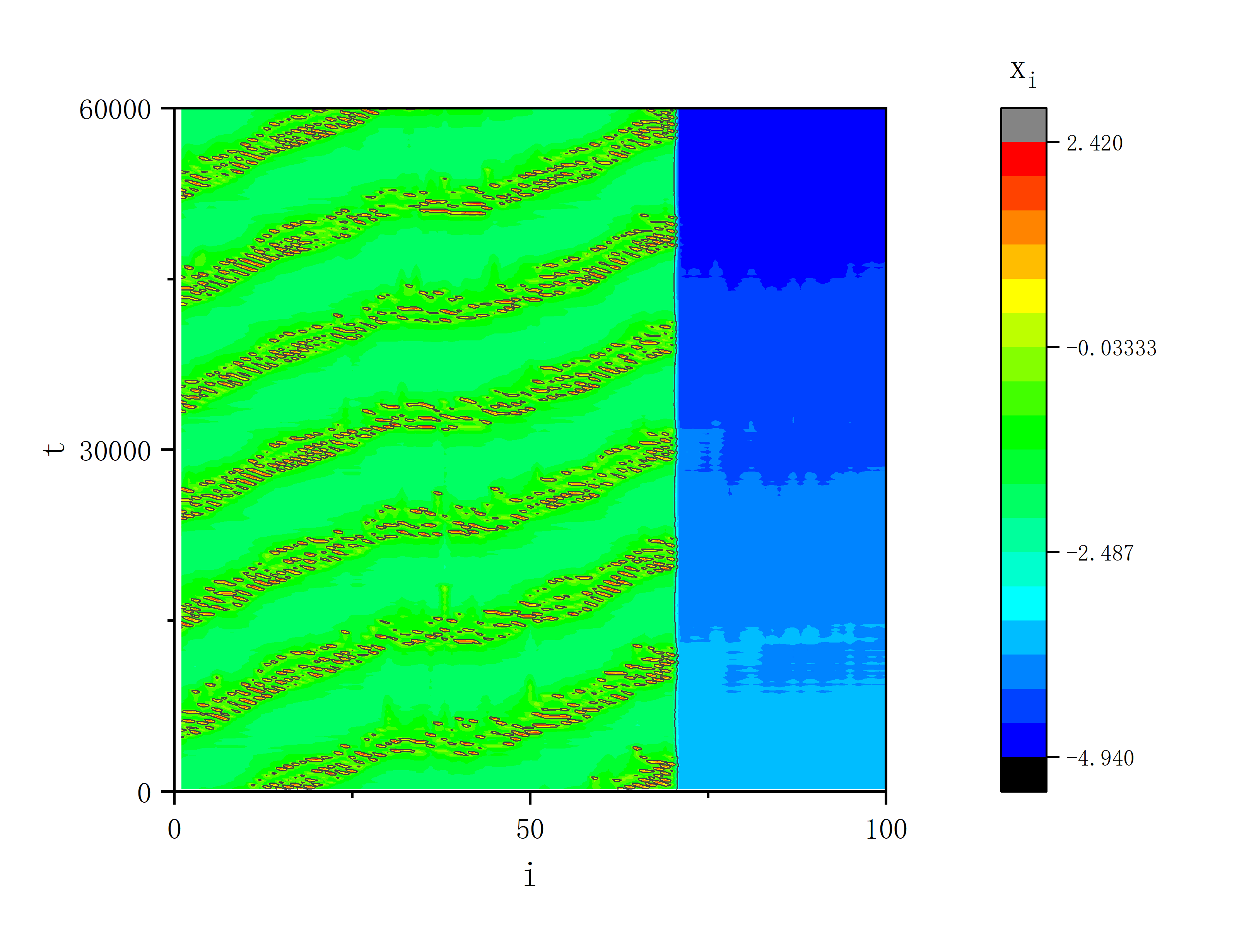
module HR
implicit none
real,parameter :: h=0.01,PI=3.1415926
integer,parameter :: N=100,MaxT=160000
integer,allocatable :: neighbour_matrix_2(:,:),neighbour_matrix_2P(:,:)
real(kind=8) :: x(N),y(N),z(N),E(N)
integer :: Nb
contains
subroutine x0_y0_z0()
implicit none
integer :: k
real :: x1,x2,x3
call random_seed()
do k=1,N,1
call random_number(x1)
call random_number(x2)
call random_number(x3)
x(k)=0.001*(k-N/2.0)+x1
y(k)=0.002*(k-N/2.0)+x2
z(k)=0.003*(k-N/2.0)+x3
end do
end subroutine x0_y0_z0
subroutine fnf(p)
implicit none
integer :: i,j,p,t
real(kind=8) :: func_x(N),func_y(N),func_z(N),func_e(N),a,b,d,k1,k2,k3,k4,II,JJ(N),C(N),r,s,x_i0,E_ext,x_s,&
&lambda,thet_s,C1(N),C2(N),Li(N),Em,f,xx(N,60000)
k1=0.7
k2=0.001
k3=0.0
k4=9.0
a=1.0
b=3.0
d=5.0
r=0.01
s=5.0
x_s=2.0
x_i0=-1.6
lambda=10.0
thet_s=-0.25
E_ext=0.0
E=0.0
Em=1.5
f=12.0
II=3.5
do Nb=1,N,1
xx=0.0
call x0_y0_z0()
do t=1,MaxT,1
JJ=0.0
C1=0.0
C2=0.0
C=0.0
do i=1,N,1
do j=1,N,1
JJ(i)=JJ(i)+neighbour_matrix_2(i,j)*(x(j)-x(i))
C1(i)=C1(i)+neighbour_matrix_2P(i,j)*(1.0/(1.0+exp(-lambda*(x(j)-thet_s))))
C2(i)=C2(i)+neighbour_matrix_2(i,j)*(1.0/(1.0+exp(-lambda*(x(j)-thet_s))))
end do
C(i)=C1(i)-C2(i)
func_x(i)=x(i)+h*(y(i)-a*x(i)**3+b*x(i)**2-z(i)+II+k3*JJ(i)+((-k4/(2.0*p-2.0))*(x_s-x(i))*C(i)))
func_y(i)=y(i)+h*(1.0-d*x(i)**2-y(i)+k1*E(i))
func_z(i)=z(i)+h*(r*(s*(x(i)-x_i0)-z(i)))
if(i>=N-Nb) then
func_e(i)=E(i)+h*(k2*y(i)+Em*sin(2.0*PI*f*t*h))
else
func_e(i)=0.0
end if
if(t>100000) then
xx(i,t-100000)=x(i)
end if
end do
x=func_x
y=func_y
z=func_z
E=func_e
end do
call SIDM(xx)
end do
return
end subroutine fnf
subroutine SIDM(xx)
implicit none
integer :: i,j,t,m
real(kind=8) :: xx(N,60000),delta
real(kind=8) :: sig(Nb),S(Nb),ZZm(N)
real(kind=8) :: Sm,SI,DM,ZZ,nn
delta=0.02*abs(maxval(xx(:,:))-minval(xx(:,:)))
nn=real(N)/real(Nb)
SI=0.0
DM=0.0
ZZm=0.0
do i=1,N-1,1
do t=1,60000,1
ZZm(i)=ZZm(i)+(xx(i,t)-xx(i+1,t))
end do
end do
do t=1,60000,1
ZZm(N)=ZZm(N)+(xx(N,t)-xx(1,t))
end do
ZZm=ZZm/60000.0
sig=0.0
do m=1,Nb,1
do t=1,60000,1
ZZ=0.0
do j=nn*(m-1)+1,m*nn,1
if(j/=N) then
ZZ=ZZ+((xx(j,t)-xx(j+1,t))-ZZm(m))**2
else
ZZ=ZZ+((xx(N,t)-xx(1,t))-ZZm(m))**2
end if
end do
sig(m)=sig(m)+sqrt((1.0/nn)*ZZ)
end do
end do
sig=sig/60000.0
do m=1,Nb,1
Sm=delta-sig(m)
write(*,*) sig(m),delta
if(Sm>0.0) then
S(m)=1.0
else
S(m)=0.0
end if
end do
SI=1.0-(1.0/Nb)*sum(S(:))
do m=1,Nb-1,1
DM=DM+abs(S(m)-S(m+1))
end do
if(Nb==N) then
DM=DM+abs(S(N)-S(1))
end if
DM=DM/2.0
write(105,*) Nb,SI
write(106,*) Nb,DM
write(*,*) Nb,SI,DM
return
end subroutine SIDM
subroutine neighbour_2(K)
implicit none
integer :: K
integer :: i,j,number
allocate(neighbour_matrix_2(N,N))
neighbour_matrix_2=0
do i=1,N-1,1
do j=i+1,N,1
if(abs(i-j)<=K/2.or.abs(i-j)>=N-K/2) then
neighbour_matrix_2(i,j)=1
neighbour_matrix_2(j,i)=1
end if
end do
end do
do i=1,N,1
do j=1,N,1
write(103,"(I2)",advance='no') neighbour_matrix_2(i,j)
end do
write(103,*)
end do
return
end subroutine neighbour_2
subroutine neighbour_2P(K)
implicit none
integer :: K
integer :: i,j,number
allocate(neighbour_matrix_2P(N,N))
neighbour_matrix_2P=0
do i=1,N-1,1
do j=i+1,N,1
if((abs(i-j)<=K/2.or.abs(i-j)>=N-K/2).and.abs(i-j)/=1) then
neighbour_matrix_2P(i,j)=1
neighbour_matrix_2P(j,i)=1
end if
end do
end do
do i=1,N,1
do j=1,N,1
write(104,"(I2)",advance='no') neighbour_matrix_2P(i,j)
end do
write(104,*)
end do
return
end subroutine neighbour_2P
end module HR
program main
use HR
implicit none
integer :: p
p=40
open(101,file="data_x0_y0_z0.txt")
open(102,file="data_i_t_x.txt")
open(103,file="neighbour_matrix_2.txt")
open(104,file="neighbour_matrix_2P.txt")
open(105,file="SI.txt")
open(106,file="DM.txt")
open(107,file="Nb_11.txt")
call neighbour_2(2)
call neighbour_2P(2*p+2)
call fnf(p)
deallocate(neighbour_matrix_2)
deallocate(neighbour_matrix_2P)
close(101)
close(102)
close(103)
close(104)
close(105)
close(106)
end program main
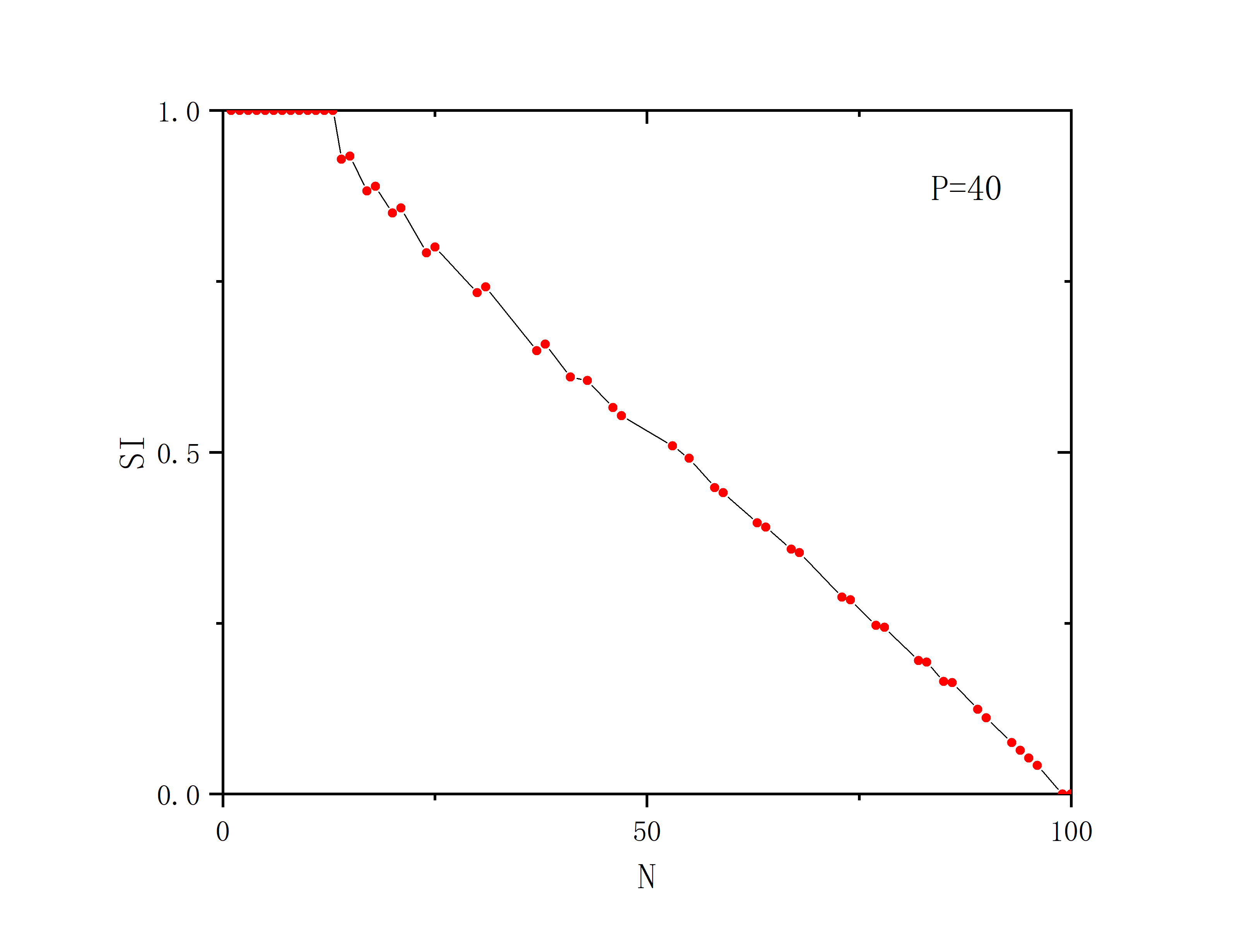
module mini
implicit none
integer(kind=4),parameter:: N=100,M=240000
real(kind=8),parameter::h=0.01,Pi=3.1415926d0
integer(kind=4)::Nb
end module mini
program main
use mini
implicit none
integer(kind=4)::i,j,t
integer(kind=4),parameter::P=40
real(kind=8),parameter::a=1.0,b=3.0,d=5.0,r=0.01,s=5.0,xi0=-1.6,thetas=-0.25,lamda=10.0,xs=2.0
real(kind=8),dimension(1:N)::x,y,z,E,x1,y1,z1,E1
real(kind=8):: k3,k4,Ie,Ci,Ci1,Ci2,Ji,r1,r2,r3,f,Em,k1,k2
real(kind=8)::xx(1:N,1:M)
call random_seed()
open(unit=11,file='SI.dat')
open(unit=12,file='DM.dat')
do Nb=1,100
'时空斑图.dat')
f=12;Em=1.5
k1=0.7
k2=0.001
k3=0
k4=9
Ie=3.5
x=0;y=0;z=0
do i=1,N
call random_number(r1)
call random_number(r2)
call random_number(r3)
x(i)=0.001*(i-N/2.0)+r1
y(i)=0.002*(i-N/2.0)+r2
z(i)=0.003*(i-N/2.0)+r3
end do
E=0
do t=1,M
do i=1,N
Ji=0;
do j=1,N
if(abs(i-j)<=1 .or. abs(i-j)>=N-1)then
Ji=Ji+(x(j)-x(i))
end if
end do
Ci1=0;Ci2=0;Ci=0
do j=1,N
if((abs(i-j)<=P .or. abs(i-j)>=N-P) .and. abs(i-j)>1 )then
Ci1=Ci1+(1.0/(1.0+exp(-lamda*(x(j)-thetas))))
end if
if((abs(i-j)<=1 .or. abs(i-j)>=N-1) .and. abs(i-j)/=0)then
Ci2=Ci2+(1.0/(1.0+exp(-lamda*(x(j)-thetas))))
end if
end do
Ci=Ci1-Ci2
x1(i)=x(i)+h*(y(i) -a*x(i)**3 + b*x(i)**2 - z(i)+ Ie+ k3*Ji + ((-k4/(2.0*p-2.0)*(xs-x(i)))*Ci))
y1(i)=y(i)+h*(1.0 - d*x(i)**2 - y(i)+k1*E(i))
z1(i)=z(i)+h*(r*(s*(x(i)-xi0) - z(i)))
if(i>=N-Nb)then
E1(i)=E(i)+h*(k2*y(i)+Em*sin(2*Pi*f*t*h))
else
E1(i)=0
end if
xx(i,t)=x1(i)
end do
x=x1;y=y1;z=z1;E=E1
end do
call SIDM(xx)
end do
stop
end
subroutine SIDM(xx)
use mini
implicit none
integer(kind=4)::i,j,t,mm
real(kind=8)::Delta
real(kind=8)::xx(1:N,1:M),sig(1:Nb),SS(1:Nb),ZZa(1:N)
real(kind=8)::nn,sigmam,Sm,SI,DM,SDM,ZZJ
"SI,DM",0.02*abs(maxval(xx(:,:))-minval(xx(:,:)))
delta=0.02*abs(maxval(xx(:,:))-minval(xx(:,:)))
nn=real(N)/real(Nb)
SI=0
ZZa=0
do i=1,N-1
do t=M/2+1,M
Zza(i)=Zza(i)+xx(i,t)-xx(i+1,t)
end do
end do
do t=M/2+1,M
Zza(N)=Zza(N)+xx(N,t)-xx(1,t)
end do
Zza=zza/real(M/2)
sig=0
do mm=1,Nb
do t=M/2+1,M
zzj=0
do j=nn*(mm-1)+1,nn*mm
if(j/=N)then
zzj=zzj+(xx(j,t)-xx(j+1,t)-zza(mm))**2
else
zzj=zzj+(xx(N,t)-xx(1,t)-zza(mm))**2
end if
end do
sig(mm)=sig(mm)+sqrt(1.0/nn*zzj)
end do
end do
sig=sig/real(M/2)
do mm=1,Nb
Sm=delta-sig(mm)
write(*,*) sig(mm),delta
if(Sm>0)then
SS(mm)=1
else
SS(mm)=0
end if
end do
SI=1-1.0/Nb*sum(SS(:))
DM=0
SDM=0
do mm=1,Nb-1
SDM=SDM+abs(ss(mm)-ss(mm+1))
end do
SDM=SDM+abs(ss(Nb)-ss(1))
DM=SDM/2.0
write(11,*)Nb,SI
write(12,*)Nb,DM
print*,Nb,SI,DM
return
end subroutine SIDM
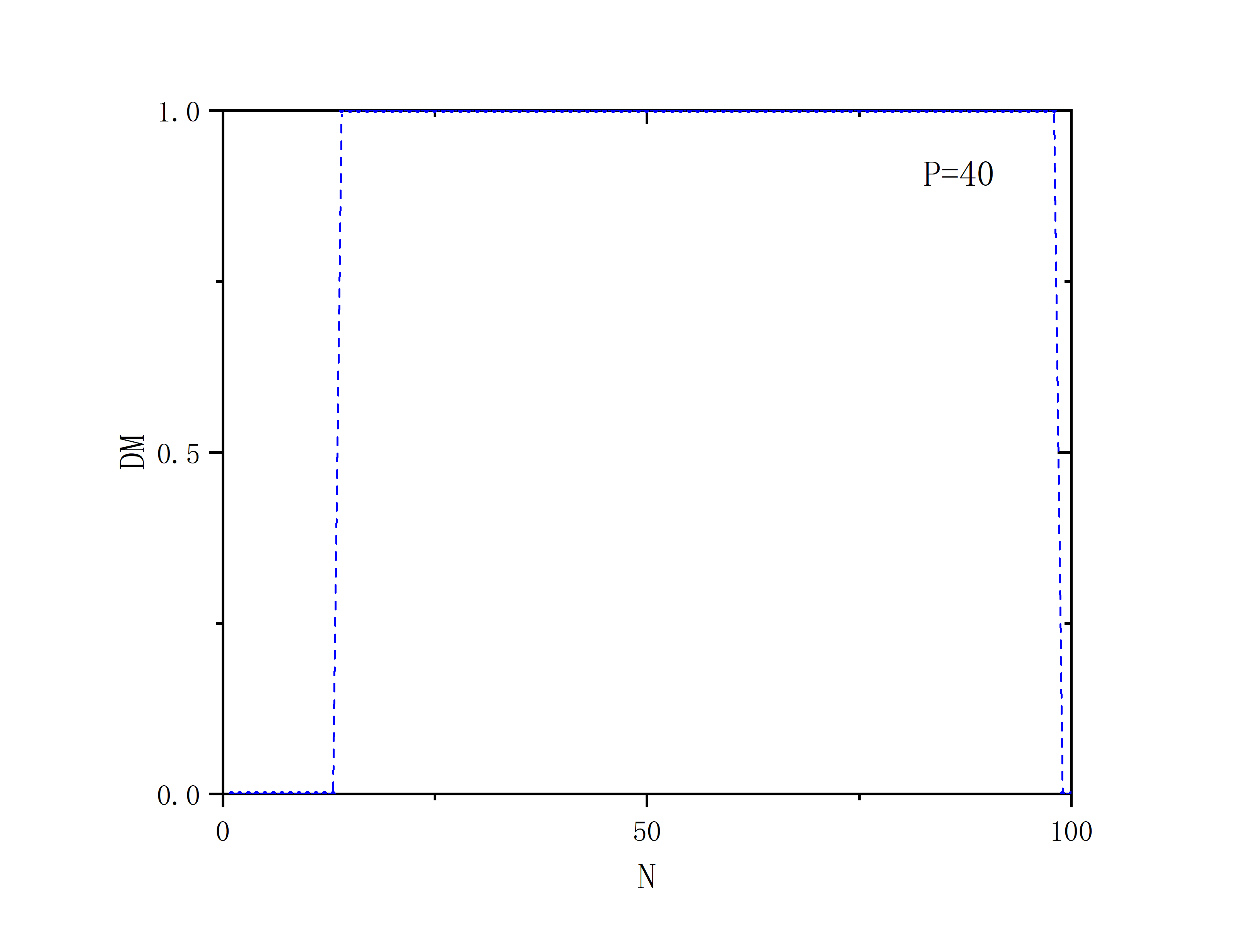
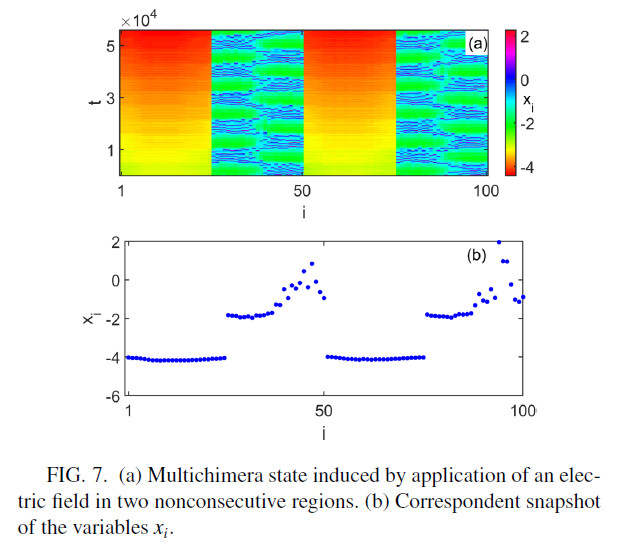
module HR
implicit none
real,parameter :: h=0.01,PI=3.1415926
integer,parameter :: N=100,MaxT=160000
integer,allocatable :: neighbour_matrix_2(:,:),neighbour_matrix_2P(:,:)
real :: x(N),y(N),z(N),E(N)
contains
subroutine x0_y0_z0()
implicit none
integer :: k
real :: x1,x2,x3
call random_seed()
do k=1,N,1
call random_number(x1)
call random_number(x2)
call random_number(x3)
x(k)=0.001*(k-N/2.0)+x1
y(k)=0.002*(k-N/2.0)+x2
z(k)=0.003*(k-N/2.0)+x3
read(101,*) x(k),y(k),z(k)
end do
end subroutine x0_y0_z0
subroutine fnf(p)
implicit none
integer :: i,j,p,t
real :: func_x(N),func_y(N),func_z(N),func_e(N),a,b,d,k1,k2,k3,k4,II,JJ(N),C(N),r,s,x_i0,E_ext,x_s,&
&lambda,thet_s,C1(N),C2(N),Li(N),Em,f
k1=0.7
k2=0.001
k3=0.0
k4=9.0
a=1.0
b=3.0
d=5.0
r=0.01
s=5.0
x_s=2.0
x_i0=-1.6
lambda=10.0
thet_s=-0.25
E_ext=0.0
E=0.0
Em=1.5
f=12.0
II=3.5
do t=1,MaxT,1
if(mod(t,5000)==0) then
write(*,*) t
end if
JJ=0.0
C1=0.0
C2=0.0
C=0.0
do i=1,N,1
do j=1,N,1
JJ(i)=JJ(i)+neighbour_matrix_2(i,j)*(x(j)-x(i))
C1(i)=C1(i)+neighbour_matrix_2P(i,j)*(1.0/(1.0+exp(-lambda*(x(j)-thet_s))))
C2(i)=C2(i)+neighbour_matrix_2(i,j)*(1.0/(1.0+exp(-lambda*(x(j)-thet_s))))
end do
C(i)=C1(i)-C2(i)
func_x(i)=x(i)+h*(y(i)-a*x(i)**3+b*x(i)**2-z(i)+II+k3*JJ(i)+((-k4/(2.0*p-2.0))*(x_s-x(i))*C(i)))
func_y(i)=y(i)+h*(1.0-d*x(i)**2-y(i)+k1*E(i))
func_z(i)=z(i)+h*(r*(s*(x(i)-x_i0)-z(i)))
if(i<25.or.(i>50.and.i<75)) then
func_e(i)=E(i)+h*(k2*y(i)+Em*sin(2.0*PI*f*t*h))
else
func_e(i)=0.0
end if
if(t>100000.and.mod(t,200)==0) then
write(102,*) i,t-100000,x(i)
end if
if(t==160000) then
write(105,*) i,x(i)
end if
end do
x=func_x
y=func_y
z=func_z
E=func_e
end do
return
end subroutine fnf
subroutine neighbour_2(K)
implicit none
integer :: K
integer :: i,j,number
allocate(neighbour_matrix_2(N,N))
neighbour_matrix_2=0
do i=1,N-1,1
do j=i+1,N,1
if(abs(i-j)<=K/2.or.abs(i-j)>=N-K/2) then
neighbour_matrix_2(i,j)=1
neighbour_matrix_2(j,i)=1
end if
end do
end do
do i=1,N,1
do j=1,N,1
write(103,"(I2)",advance='no') neighbour_matrix_2(i,j)
end do
write(103,*)
end do
return
end subroutine neighbour_2
subroutine neighbour_2P(K)
implicit none
integer :: K
integer :: i,j,number
allocate(neighbour_matrix_2P(N,N))
neighbour_matrix_2P=0
do i=1,N-1,1
do j=i+1,N,1
if((abs(i-j)<=K/2.or.abs(i-j)>=N-K/2).and.abs(i-j)/=1) then
neighbour_matrix_2P(i,j)=1
neighbour_matrix_2P(j,i)=1
end if
end do
end do
do i=1,N,1
do j=1,N,1
write(104,"(I2)",advance='no') neighbour_matrix_2P(i,j)
end do
write(104,*)
end do
return
end subroutine neighbour_2P
end module HR
program main
use HR
implicit none
integer :: p
p=40
open(101,file="data_x0_y0_z0.txt")
open(102,file="data_i_t_x.txt")
open(103,file="neighbour_matrix_2.txt")
open(104,file="neighbour_matrix_2P.txt")
open(105,file="i_x.txt")
call x0_y0_z0()
call neighbour_2(2)
call neighbour_2P(2*p+2)
call fnf(p)
deallocate(neighbour_matrix_2)
deallocate(neighbour_matrix_2P)
close(101)
close(102)
close(103)
close(104)
end program main
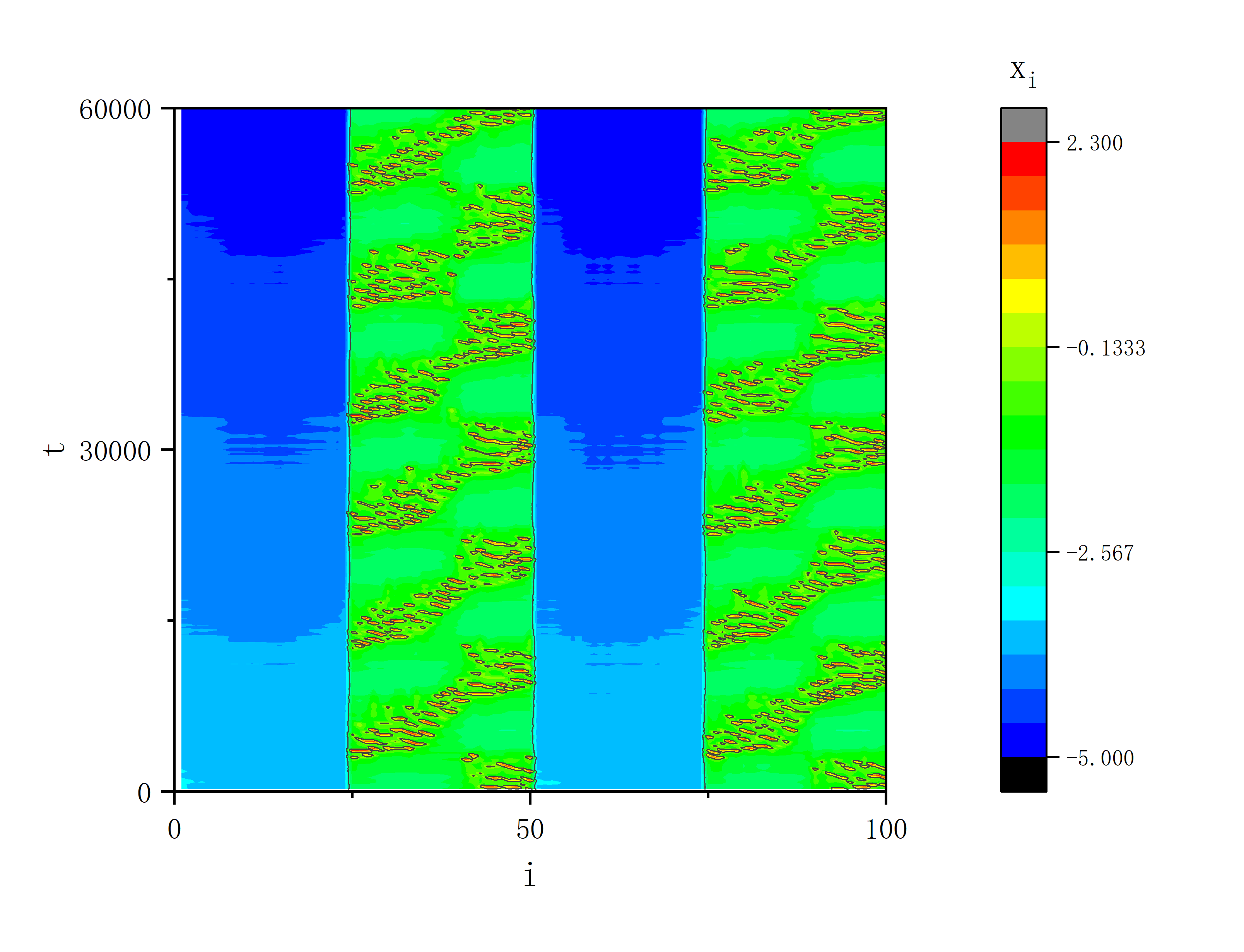
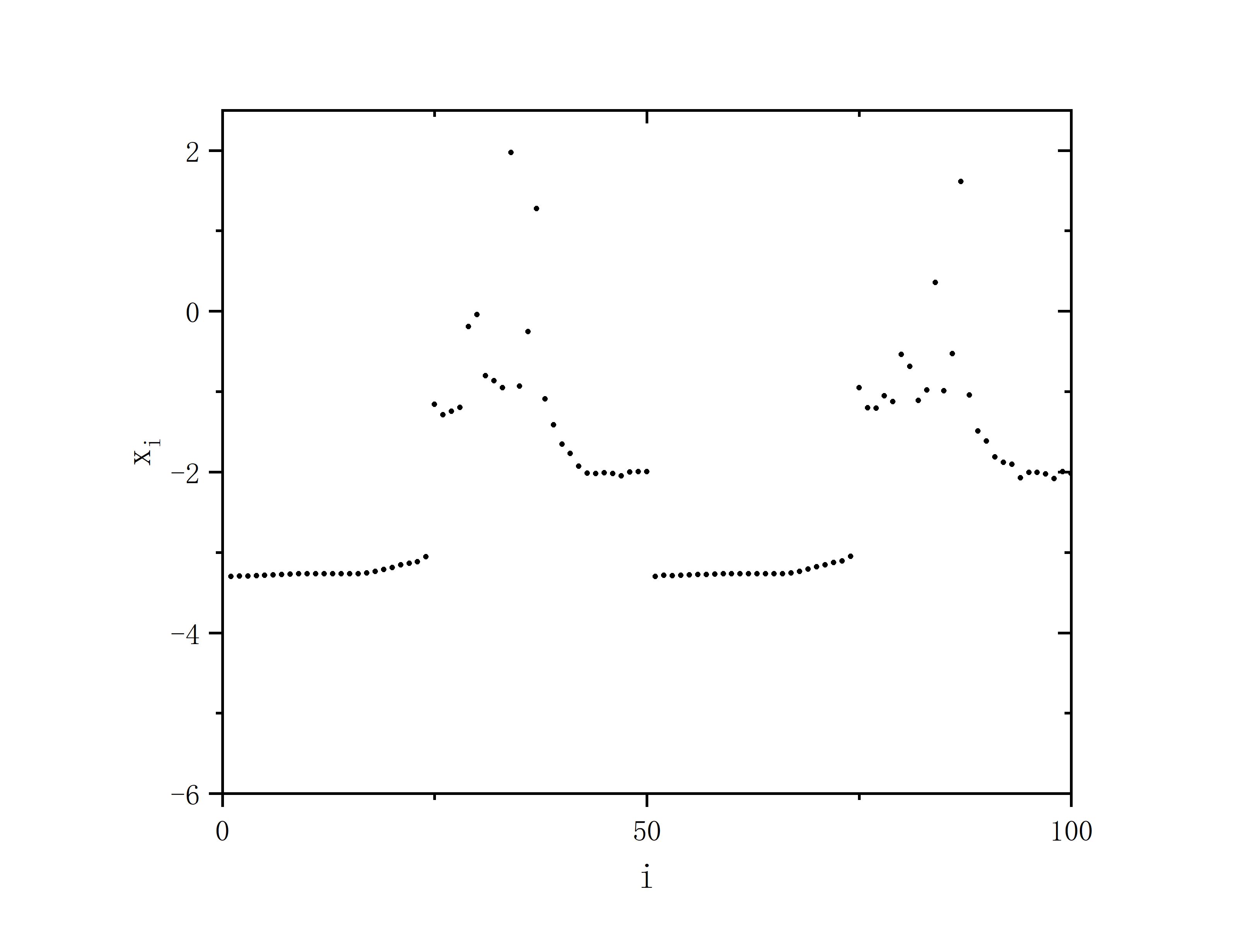
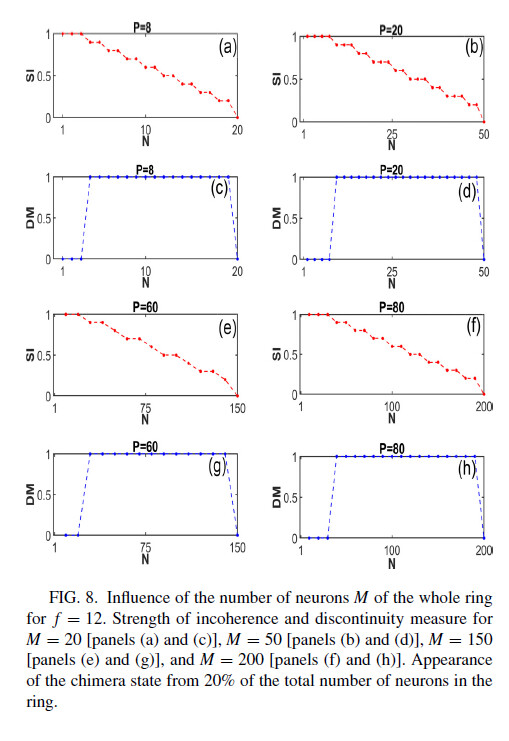
module HR
implicit none
real,parameter :: h=0.01,PI=3.1415926
integer,parameter :: N=20,MaxT=160000
integer,allocatable :: neighbour_matrix_2(:,:),neighbour_matrix_2P(:,:)
real(kind=8) :: x(N),y(N),z(N),E(N),xx(N,MaxT)
integer :: Nb
contains
subroutine x0_y0_z0()
implicit none
integer :: k
real :: x1,x2,x3
call random_seed()
do k=1,N,1
call random_number(x1)
call random_number(x2)
call random_number(x3)
x(k)=0.001*(k-N/2.0)+x1
y(k)=0.002*(k-N/2.0)+x2
z(k)=0.003*(k-N/2.0)+x3
write(101,*) x(k),y(k),z(k)
end do
end subroutine x0_y0_z0
subroutine fnf(p)
implicit none
integer :: i,j,p,t
real :: func_x(N),func_y(N),func_z(N),func_e(N),a,b,d,k1,k2,k3,k4,II,JJ(N),C(N),r,s,x_i0,E_ext,x_s,&
&lambda,thet_s,C1(N),C2(N),Li(N),Em,f
k1=0.7
k2=0.001
k3=0.0
k4=9.0
a=1.0
b=3.0
d=5.0
r=0.01
s=5.0
x_s=2.0
x_i0=-1.6
lambda=10.0
thet_s=-0.25
E_ext=0.0
E=0.0
Em=1.5
f=12.0
II=3.5
do Nb=1,N,1
do t=1,MaxT,1
JJ=0.0
C1=0.0
C2=0.0
C=0.0
do i=1,N,1
do j=1,N,1
JJ(i)=JJ(i)+neighbour_matrix_2(i,j)*(x(j)-x(i))
C1(i)=C1(i)+neighbour_matrix_2P(i,j)*(1.0/(1.0+exp(-lambda*(x(j)-thet_s))))
C2(i)=C2(i)+neighbour_matrix_2(i,j)*(1.0/(1.0+exp(-lambda*(x(j)-thet_s))))
end do
C(i)=C1(i)-C2(i)
func_x(i)=x(i)+h*(y(i)-a*x(i)**3+b*x(i)**2-z(i)+II+k3*JJ(i)+((-k4/(2.0*p-2.0))*(x_s-x(i))*C(i)))
func_y(i)=y(i)+h*(1.0-d*x(i)**2-y(i)+k1*E(i))
func_z(i)=z(i)+h*(r*(s*(x(i)-x_i0)-z(i)))
if(i>=Nb) then
func_e(i)=E(i)+h*(k2*y(i)+Em*sin(2.0*PI*f*t*h))
else
func_e(i)=0.0
end if
if(Nb==11) then
write(107,*) t,x(i)
end if
xx(i,t)=x(i)
end do
x=func_x
y=func_y
z=func_z
E=func_e
end do
call SIDM(xx)
end do
return
end subroutine fnf
!SI不相干强度
subroutine SIDM(xx)
implicit none
integer :: i,j,t,m
real(kind=8) :: delta
real(kind=8) :: xx(N,MaxT),sig(Nb),S(Nb),ZZm(N)
real(kind=8) :: Sm,SI,DM,ZZ,nn
delta=0.02*abs(maxval(xx(:,:))-minval(xx(:,:)))
nn=real(N)/real(Nb)
SI=0.0
DM=0.0
ZZm=0.0
do i=1,N-1,1
do t=MaxT/2,MaxT,1
ZZm(i)=ZZm(i)+(xx(i,t)-xx(i+1,t))
end do
end do
do t=MaxT/2,MaxT,1
ZZm(N)=ZZm(N)+(xx(N,t)-xx(1,t))
end do
ZZm=ZZm/real(MaxT/2)
sig=0.0
do m=1,Nb,1
do t=MaxT/2,MaxT,1
ZZ=0.0
do j=nn*(m-1)+1,m*nn,1
if(j/=N) then
ZZ=ZZ+((xx(j,t)-xx(j+1,t))-ZZm(m))**2
else
ZZ=ZZ+((xx(N,t)-xx(1,t))-ZZm(m))**2
end if
end do
sig(m)=sig(m)+sqrt((1.0/nn)*ZZ)
end do
end do
sig=sig/real(MaxT/2)
do m=1,Nb,1
Sm=delta-sig(m)
write(*,*) sig(m),delta
if(Sm>0.0) then
S(m)=1.0
else
S(m)=0.0
end if
end do
SI=1.0-(1.0/Nb)*sum(S(:))
do m=1,Nb-1,1
DM=DM+abs(S(m)-S(m+1))
end do
if(Nb==N) then
DM=DM+abs(S(N)-S(1))
end if
DM=DM/2.0
write(105,*) Nb,SI
write(106,*) Nb,DM
write(*,*) Nb,SI,DM,sum(S(:))
return
end subroutine SIDM
!建立网状结构
!k=2
subroutine neighbour_2(K)
implicit none
integer :: K !单节点K个邻居
integer :: i,j,number
allocate(neighbour_matrix_2(N,N))
!初始化网络矩阵
neighbour_matrix_2=0
do i=1,N-1,1
do j=i+1,N,1
if(abs(i-j)<=K/2.or.abs(i-j)>=N-K/2) then
neighbour_matrix_2(i,j)=1
neighbour_matrix_2(j,i)=1
end if
end do
end do
!输出矩阵
do i=1,N,1
do j=1,N,1
write(103,"(I2)",advance='no') neighbour_matrix_2(i,j)
end do
write(103,*)
end do
return
end subroutine neighbour_2
!k=2*p+2
subroutine neighbour_2P(K)
implicit none
integer :: K !单节点K个邻居
integer :: i,j,number
allocate(neighbour_matrix_2P(N,N))
!初始化网络矩阵
neighbour_matrix_2P=0
do i=1,N-1,1
do j=i+1,N,1
if((abs(i-j)<=K/2.or.abs(i-j)>=N-K/2).and.abs(i-j)/=1) then
neighbour_matrix_2P(i,j)=1
neighbour_matrix_2P(j,i)=1
end if
end do
end do
!输出矩阵
do i=1,N,1
do j=1,N,1
write(104,"(I2)",advance='no') neighbour_matrix_2P(i,j)
end do
write(104,*)
end do
return
end subroutine neighbour_2P
end module HR
program main
use HR
implicit none
integer :: p
p=8
open(101,file="data_x0_y0_z0.txt")
open(102,file="data_i_t_x.txt")
open(103,file="neighbour_matrix_2.txt")
open(104,file="neighbour_matrix_2P.txt")
open(105,file="SI.txt")
open(106,file="DM.txt")
open(107,file="Nb_11.txt")
call x0_y0_z0()
call neighbour_2(2)
call neighbour_2P(2*p+2)
call fnf(p)
deallocate(neighbour_matrix_2)
deallocate(neighbour_matrix_2P)
close(101)
close(102)
close(103)
close(104)
close(105)
close(106)
end program main
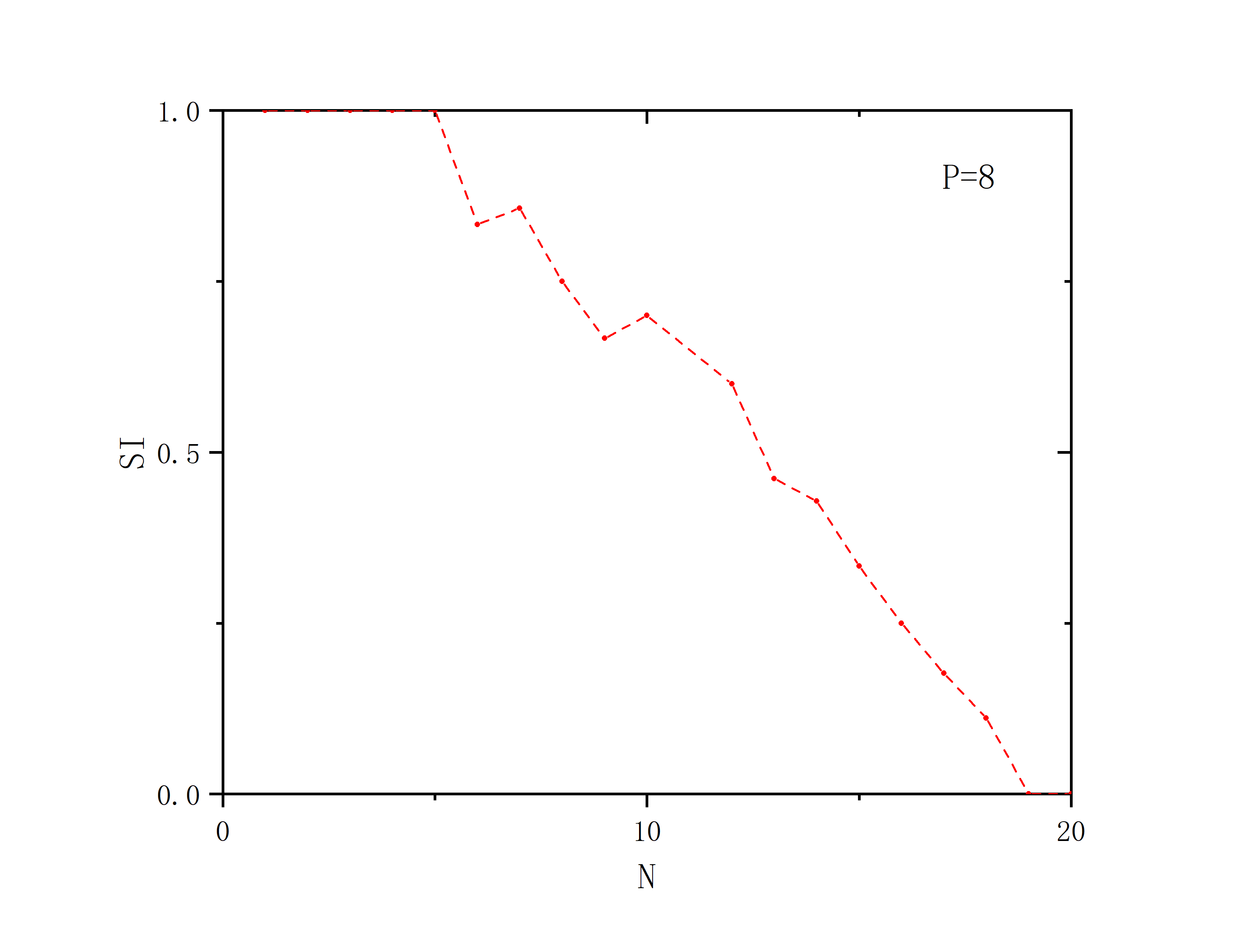
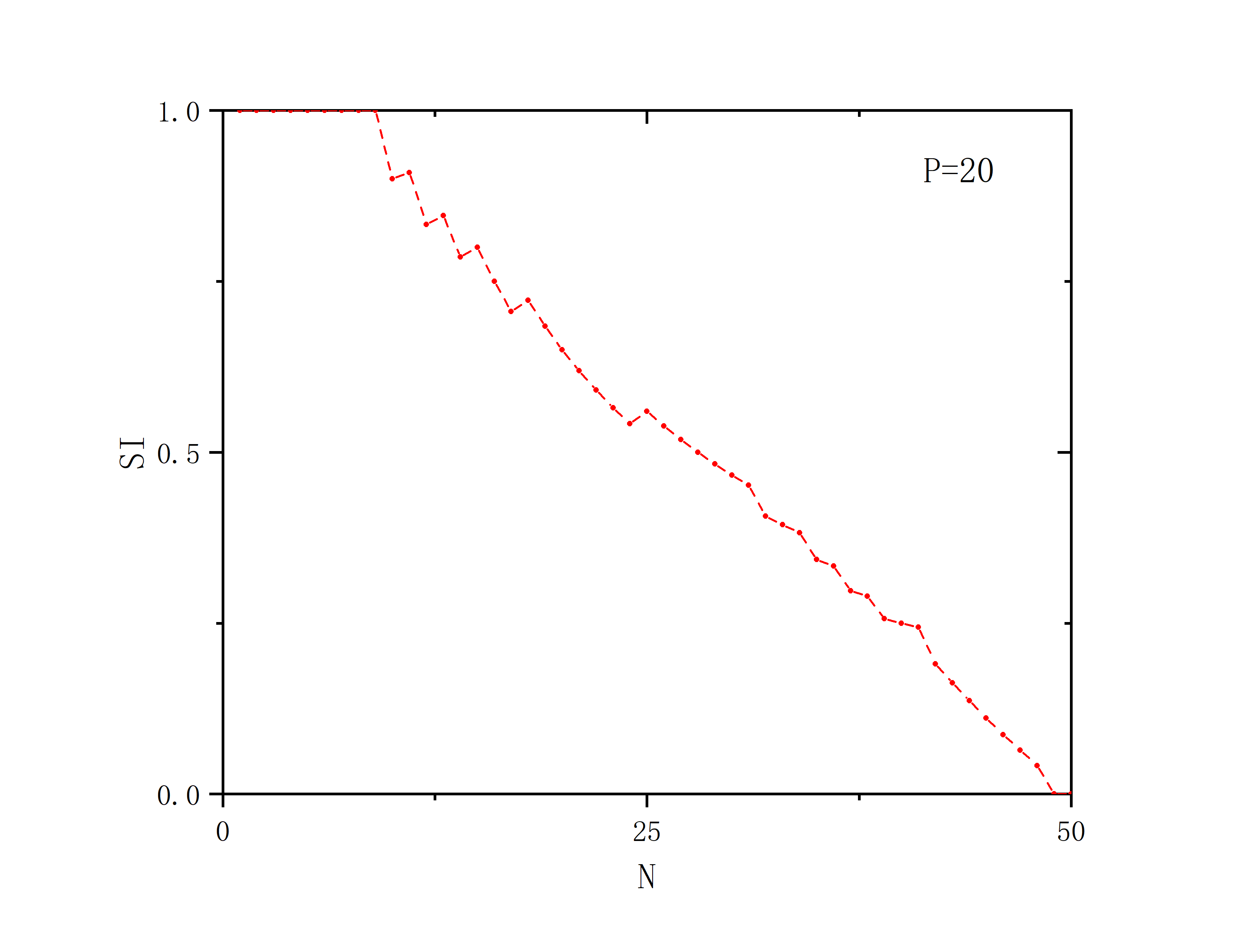
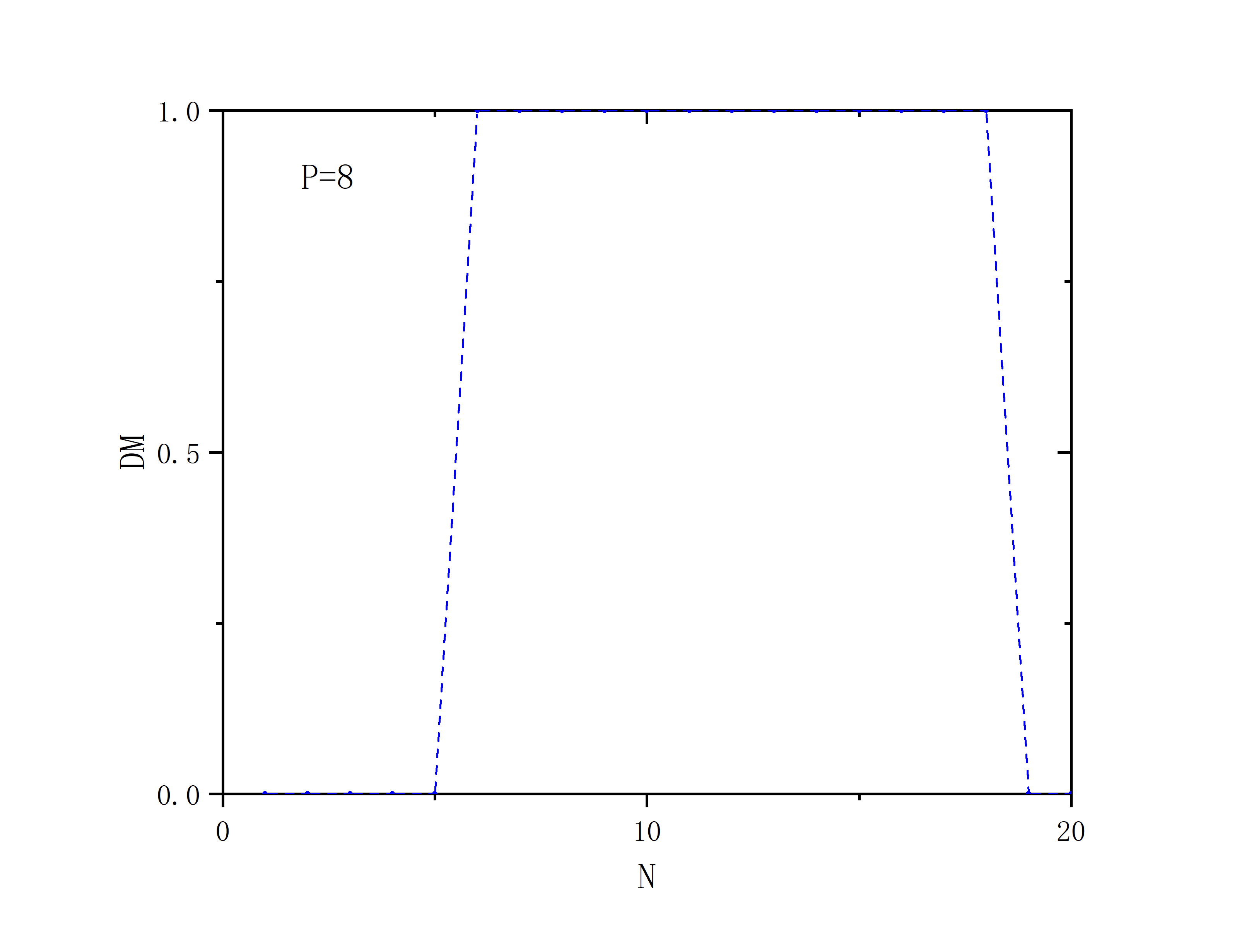
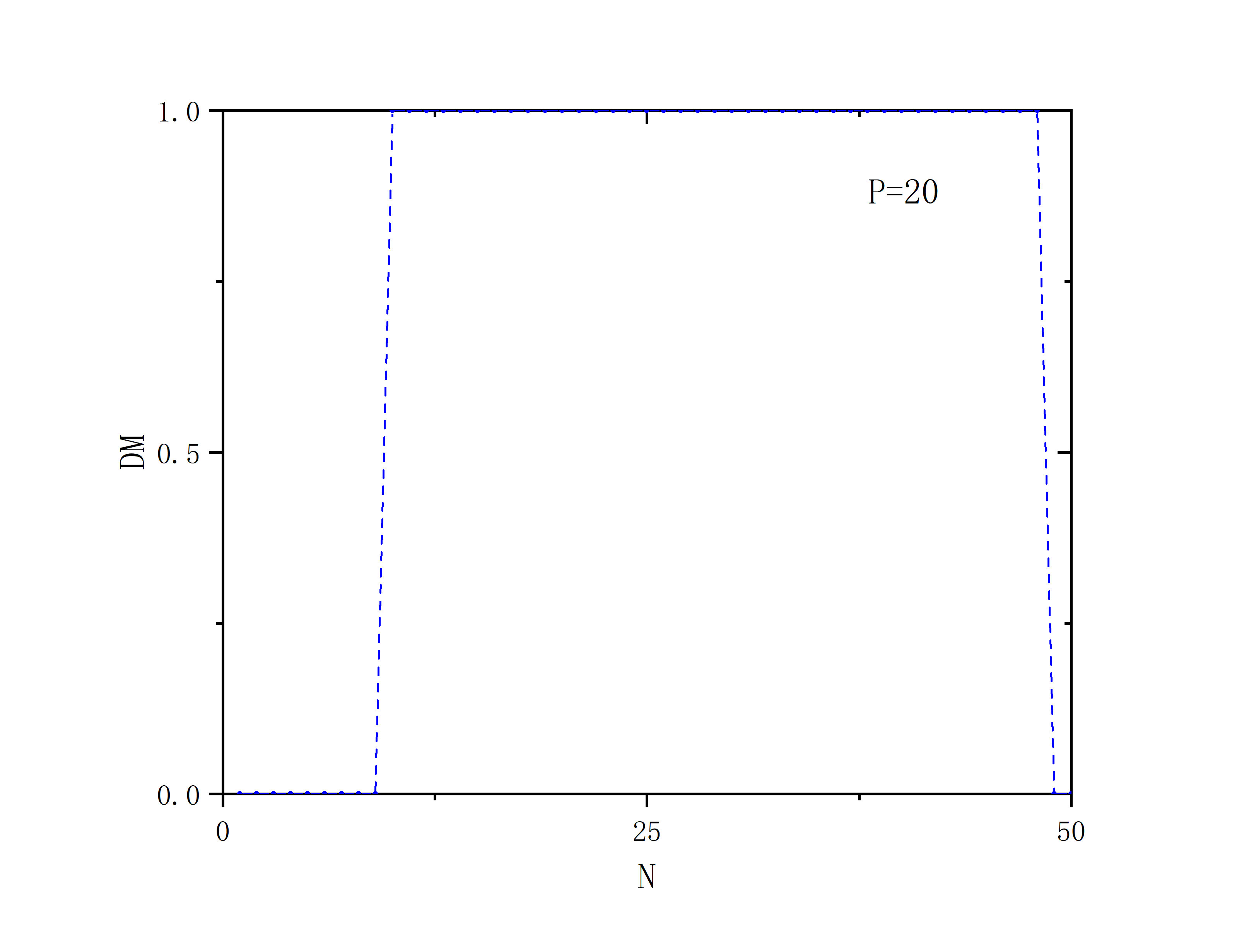
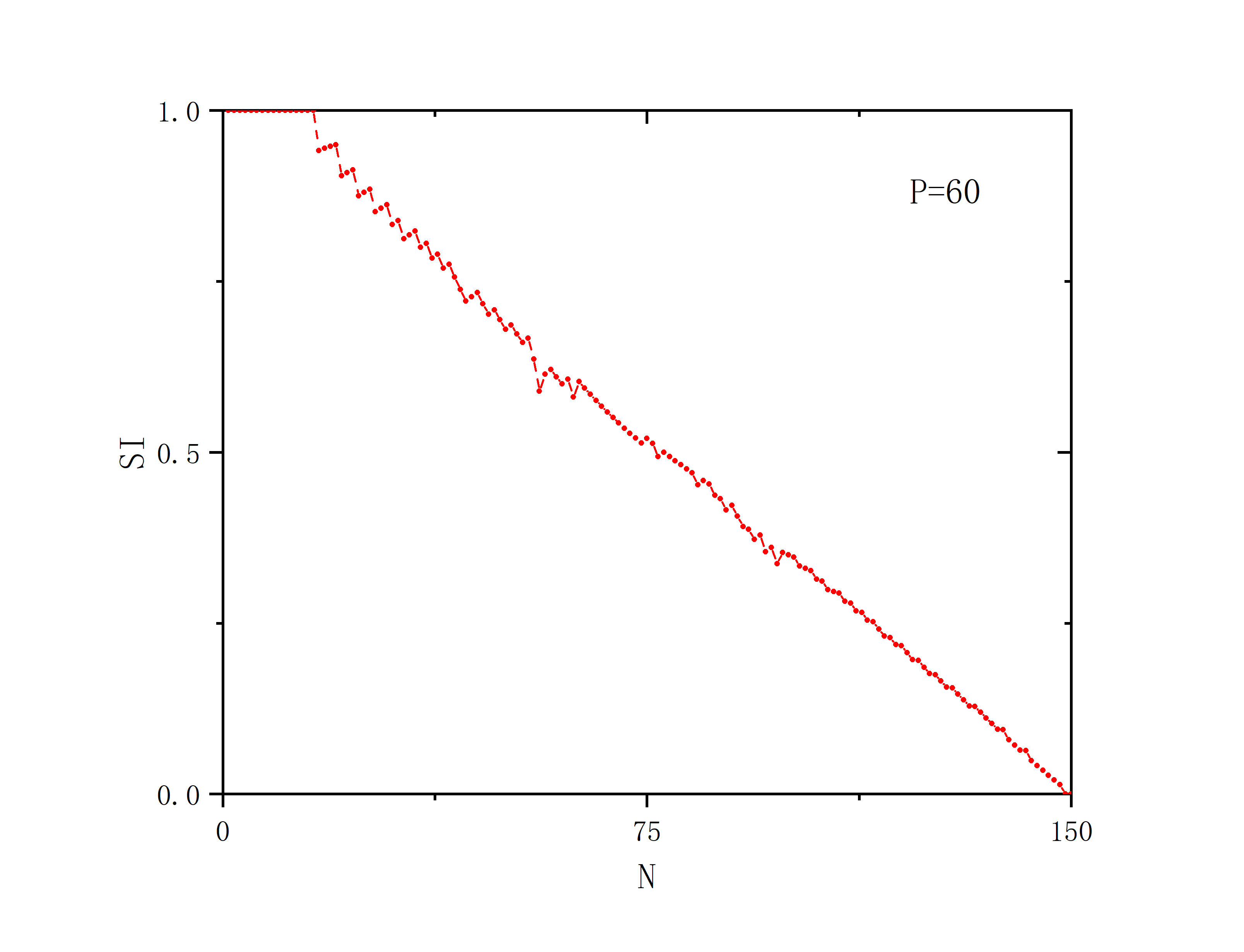
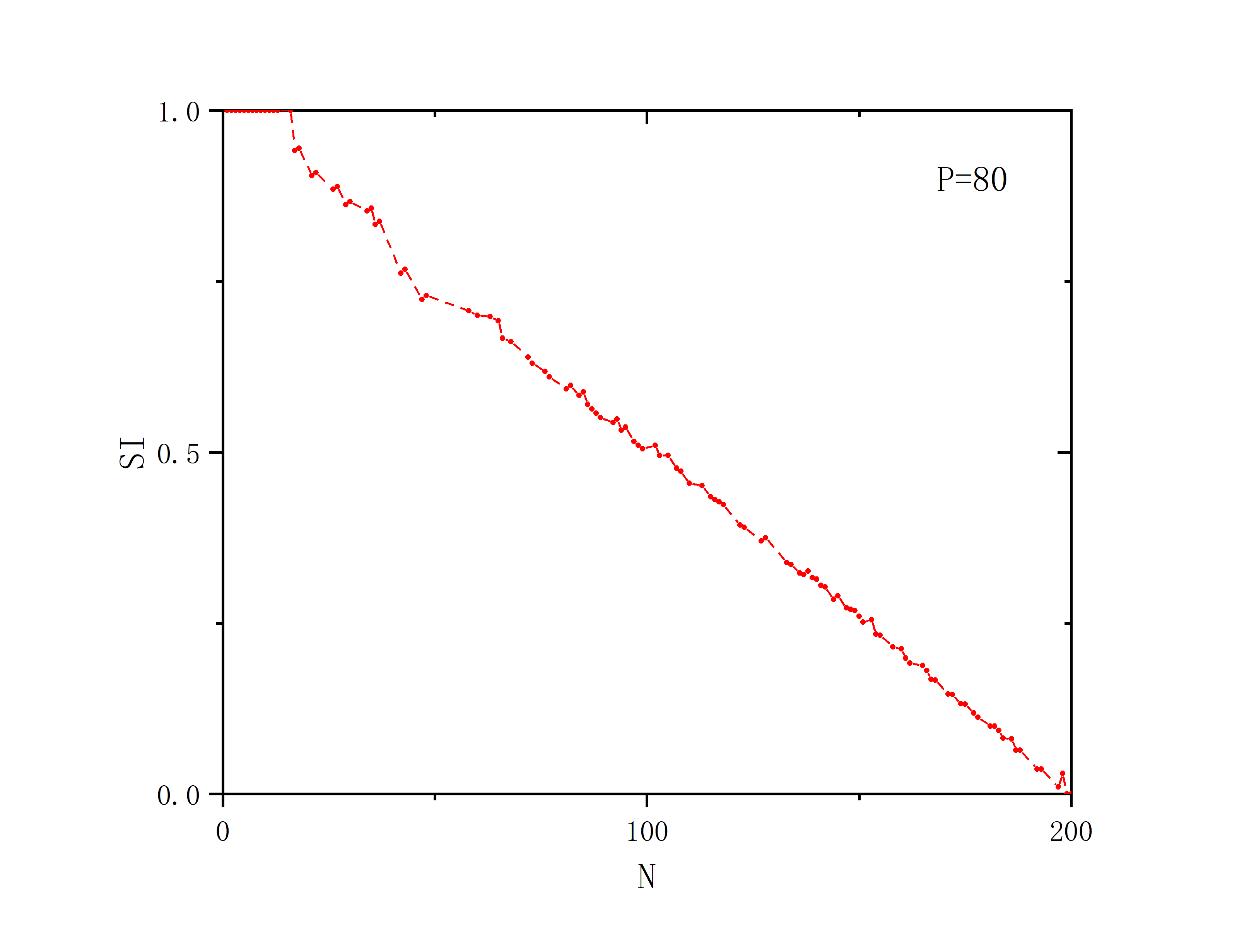
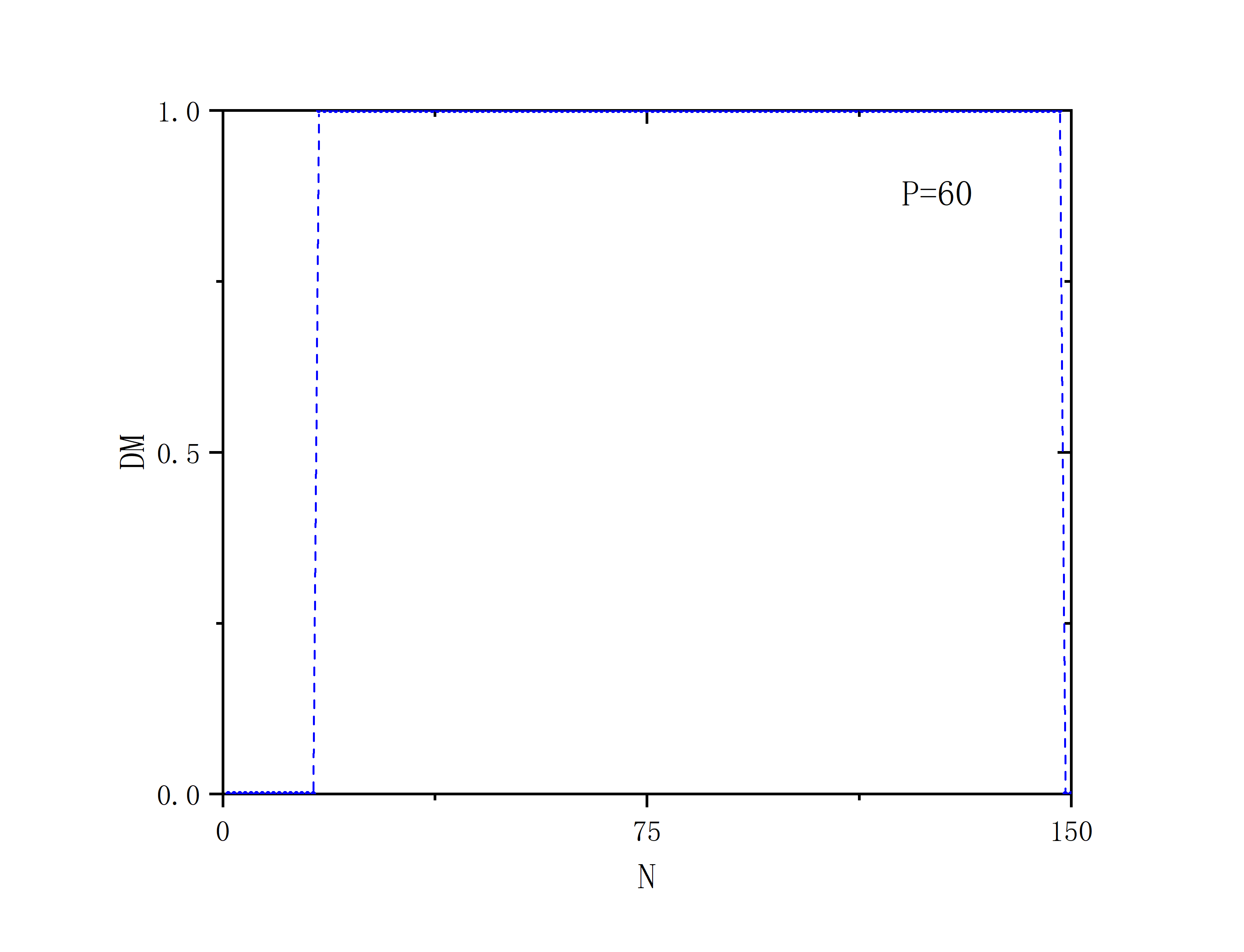
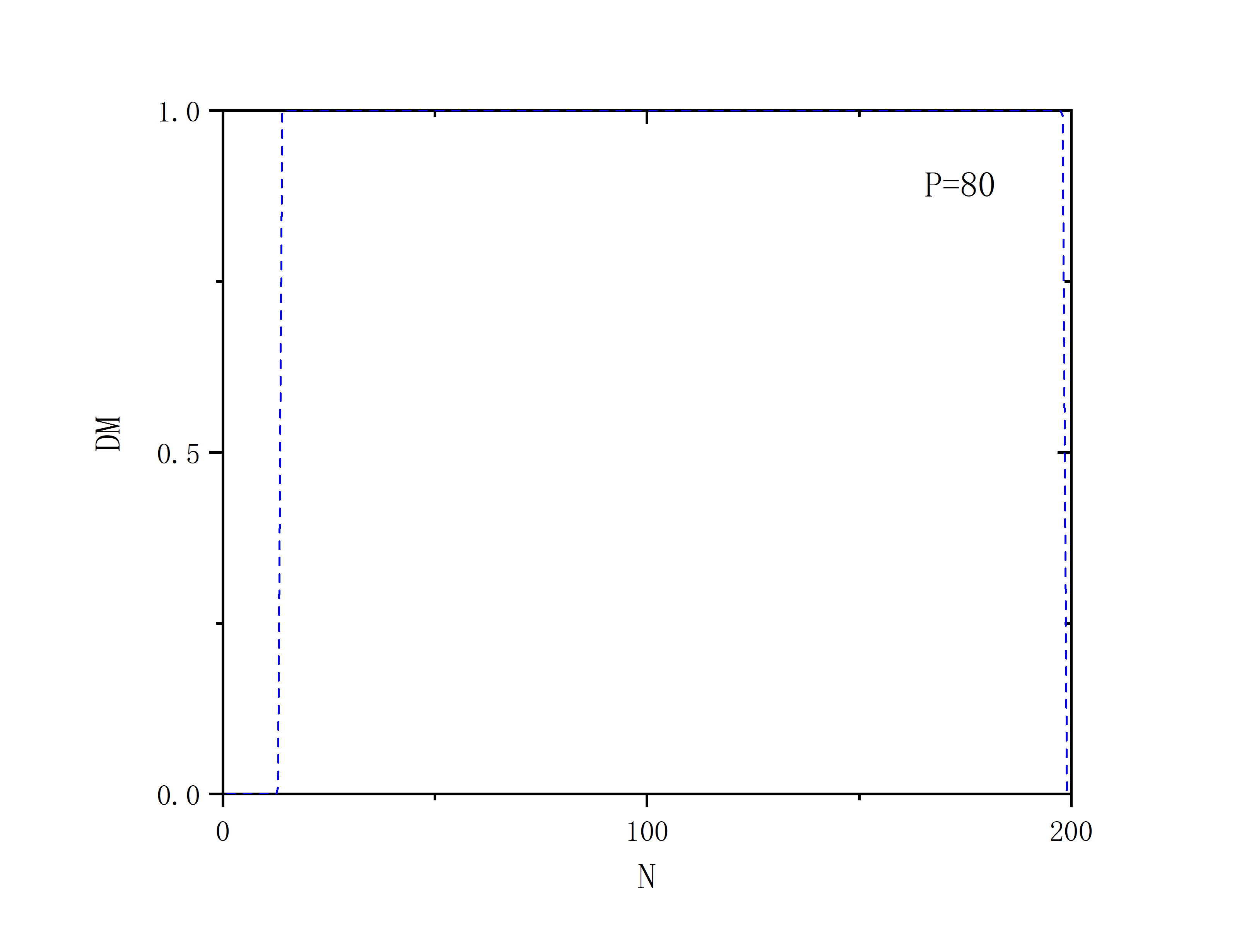
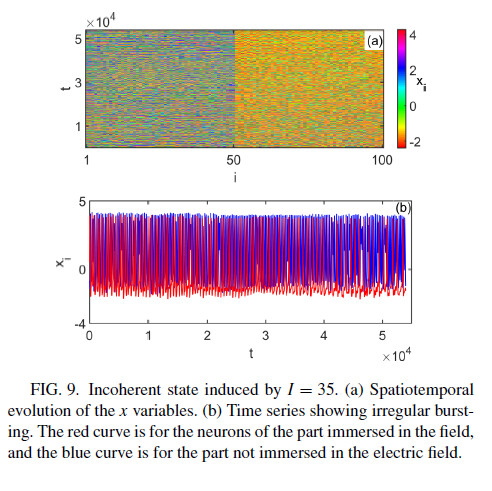
module HR
implicit none
real,parameter :: h=0.01,PI=3.1415926
integer,parameter :: N=100,MaxT=660000
integer,allocatable :: neighbour_matrix_2(:,:),neighbour_matrix_2P(:,:)
real :: x(N),y(N),z(N),E(N)
contains
subroutine x0_y0_z0()
implicit none
integer :: k
real :: x1,x2,x3
call random_seed()
do k=1,N,1
call random_number(x1)
call random_number(x2)
call random_number(x3)
x(k)=0.001*(k-N/2.0)+x1
y(k)=0.002*(k-N/2.0)+x2
z(k)=0.003*(k-N/2.0)+x3
read(101,*) x(k),y(k),z(k)
end do
end subroutine x0_y0_z0
subroutine fnf(p)
implicit none
integer :: i,j,p,t
real :: func_x(N),func_y(N),func_z(N),func_e(N),a,b,d,k1,k2,k3,k4,II,JJ(N),C(N),r,s,x_i0,E_ext,x_s,&
&lambda,thet_s,C1(N),C2(N),Li(N),Em,f
k1=0.7
k2=0.001
k3=0.0
k4=9.0
a=1.0
b=3.0
d=5.0
r=0.01
s=5.0
x_s=2.0
x_i0=-1.6
lambda=10.0
thet_s=-0.25
E_ext=0.0
E=0.0
Em=1.5
f=12.0
II=35.0
do t=1,MaxT,1
if(mod(t,5000)==0) then
write(*,*) t
end if
JJ=0.0
C1=0.0
C2=0.0
C=0.0
do i=1,N,1
do j=1,N,1
JJ(i)=JJ(i)+neighbour_matrix_2(i,j)*(x(j)-x(i))
C1(i)=C1(i)+neighbour_matrix_2P(i,j)*(1.0/(1.0+exp(-lambda*(x(j)-thet_s))))
C2(i)=C2(i)+neighbour_matrix_2(i,j)*(1.0/(1.0+exp(-lambda*(x(j)-thet_s))))
end do
C(i)=C1(i)-C2(i)
func_x(i)=x(i)+h*(y(i)-a*x(i)**3+b*x(i)**2-z(i)+II+k3*JJ(i)+((-k4/(2.0*p-2.0))*(x_s-x(i))*C(i)))
func_y(i)=y(i)+h*(1.0-d*x(i)**2-y(i)+k1*E(i))
func_z(i)=z(i)+h*(r*(s*(x(i)-x_i0)-z(i)))
if(i>50) then
func_e(i)=E(i)+h*(k2*y(i)+Em*sin(2.0*PI*f*t*h))
else
func_e(i)=0.0
end if
if(t>600000.and.mod(t,50)==0) then
write(102,*) i,t-600000,x(i)
end if
if(t>600000.and.i==5) then
write(105,*) t-600000,x(i)
end if
if(t>600000.and.i==55) then
write(106,*) t-600000,x(i)
end if
end do
x=func_x
y=func_y
z=func_z
E=func_e
end do
return
end subroutine fnf
subroutine neighbour_2(K)
implicit none
integer :: K
integer :: i,j,number
allocate(neighbour_matrix_2(N,N))
neighbour_matrix_2=0
do i=1,N-1,1
do j=i+1,N,1
if(abs(i-j)<=K/2.or.abs(i-j)>=N-K/2) then
neighbour_matrix_2(i,j)=1
neighbour_matrix_2(j,i)=1
end if
end do
end do
do i=1,N,1
do j=1,N,1
write(103,"(I2)",advance='no') neighbour_matrix_2(i,j)
end do
write(103,*)
end do
return
end subroutine neighbour_2
subroutine neighbour_2P(K)
implicit none
integer :: K
integer :: i,j,number
allocate(neighbour_matrix_2P(N,N))
neighbour_matrix_2P=0
do i=1,N-1,1
do j=i+1,N,1
if((abs(i-j)<=K/2.or.abs(i-j)>=N-K/2).and.abs(i-j)/=1) then
neighbour_matrix_2P(i,j)=1
neighbour_matrix_2P(j,i)=1
end if
end do
end do
do i=1,N,1
do j=1,N,1
write(104,"(I2)",advance='no') neighbour_matrix_2P(i,j)
end do
write(104,*)
end do
return
end subroutine neighbour_2P
end module HR
program main
use HR
implicit none
integer :: p
p=40
open(101,file="data_x0_y0_z0.txt")
open(102,file="data_i_t_x.txt")
open(103,file="neighbour_matrix_2.txt")
open(104,file="neighbour_matrix_2P.txt")
open(105,file="t_x_5.txt")
open(106,file="t_x_55.txt")
call x0_y0_z0()
call neighbour_2(2)
call neighbour_2P(2*p+2)
call fnf(p)
deallocate(neighbour_matrix_2)
deallocate(neighbour_matrix_2P)
close(101)
close(102)
close(103)
close(104)
end program main
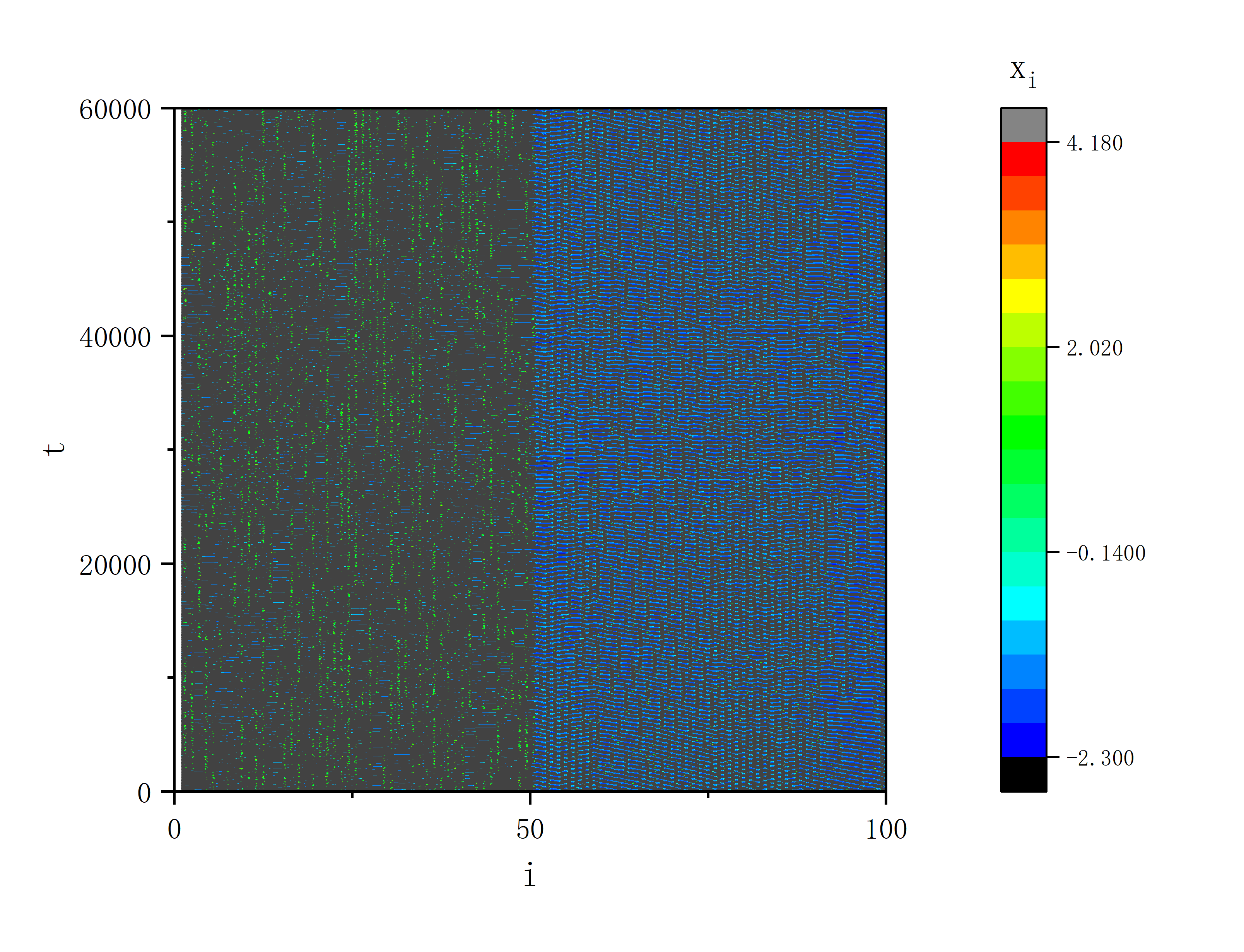
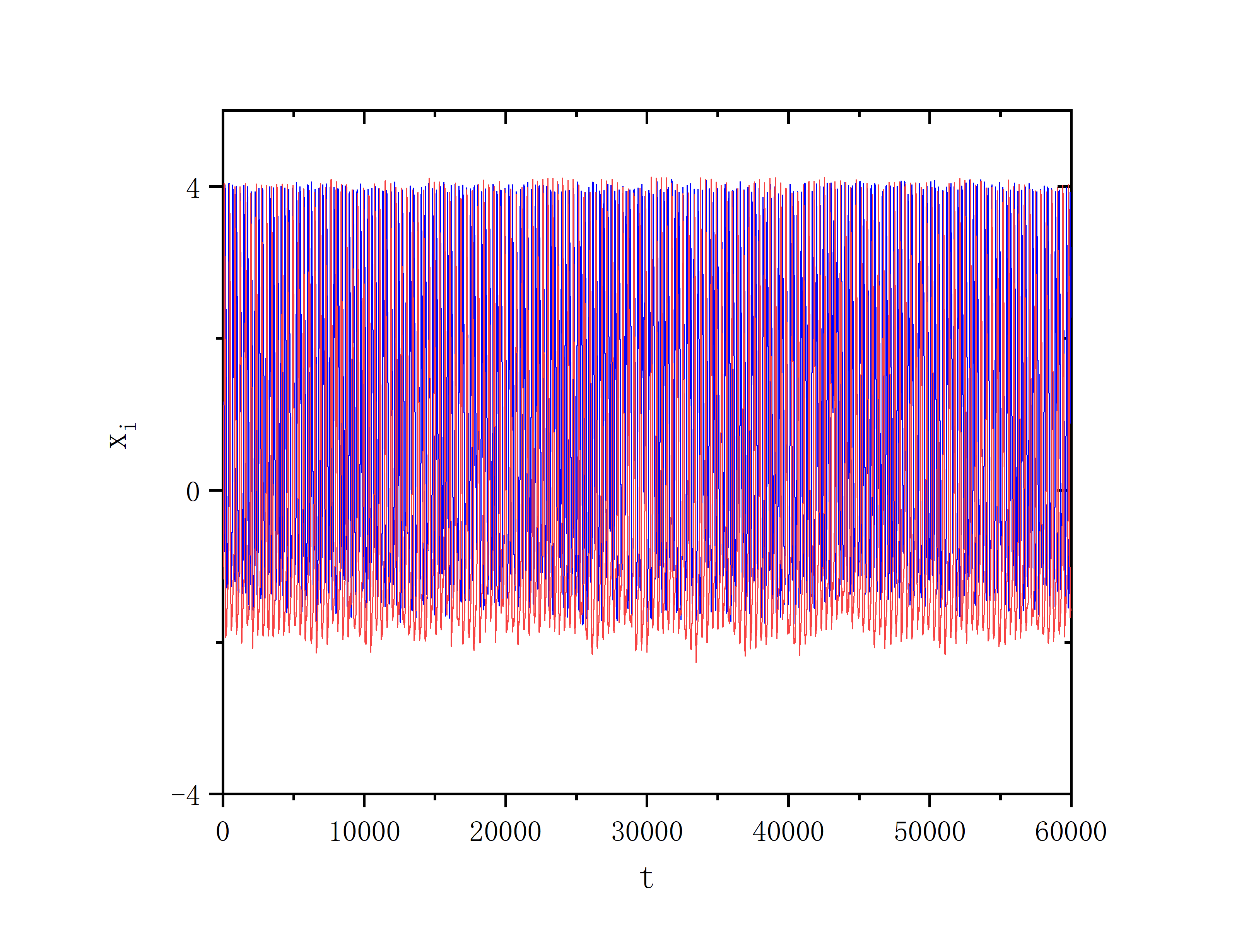
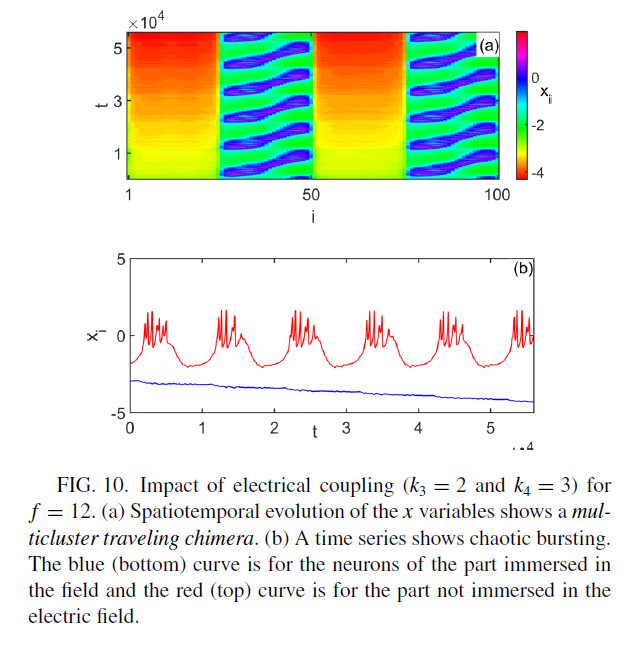
module HR
implicit none
real,parameter :: h=0.01,PI=3.1415926
integer,parameter :: N=100,MaxT=160000
integer,allocatable :: neighbour_matrix_2(:,:),neighbour_matrix_2P(:,:)
real :: x(N),y(N),z(N),E(N)
contains
subroutine x0_y0_z0()
implicit none
integer :: k
real :: x1,x2,x3
call random_seed()
do k=1,N,1
call random_number(x1)
call random_number(x2)
call random_number(x3)
x(k)=0.001*(k-N/2.0)+x1
y(k)=0.002*(k-N/2.0)+x2
z(k)=0.003*(k-N/2.0)+x3
read(101,*) x(k),y(k),z(k)
end do
end subroutine x0_y0_z0
subroutine fnf(p)
implicit none
integer :: i,j,p,t
real :: func_x(N),func_y(N),func_z(N),func_e(N),a,b,d,k1,k2,k3,k4,II,JJ(N),C(N),r,s,x_i0,E_ext,x_s,&
&lambda,thet_s,C1(N),C2(N),Li(N),Em,f
k1=0.7
k2=0.001
k3=2.0
k4=3.0
a=1.0
b=3.0
d=5.0
r=0.01
s=5.0
x_s=2.0
x_i0=-1.6
lambda=10.0
thet_s=-0.25
E_ext=0.0
E=0.0
Em=1.5
f=12.0
II=3.5
do t=1,MaxT,1
if(mod(t,5000)==0) then
write(*,*) t
end if
JJ=0.0
C1=0.0
C2=0.0
C=0.0
do i=1,N,1
do j=1,N,1
JJ(i)=JJ(i)+neighbour_matrix_2(i,j)*(x(j)-x(i))
C1(i)=C1(i)+neighbour_matrix_2P(i,j)*(1.0/(1.0+exp(-lambda*(x(j)-thet_s))))
C2(i)=C2(i)+neighbour_matrix_2(i,j)*(1.0/(1.0+exp(-lambda*(x(j)-thet_s))))
end do
C(i)=C1(i)-C2(i)
func_x(i)=x(i)+h*(y(i)-a*x(i)**3+b*x(i)**2-z(i)+II+k3*JJ(i)+((-k4/(2.0*p-2.0))*(x_s-x(i))*C(i)))
func_y(i)=y(i)+h*(1.0-d*x(i)**2-y(i)+k1*E(i))
func_z(i)=z(i)+h*(r*(s*(x(i)-x_i0)-z(i)))
if(i<25.or.(i>50.and.i<75)) then
func_e(i)=E(i)+h*(k2*y(i)+Em*sin(2.0*PI*f*t*h))
else
func_e(i)=0.0
end if
if(t>100000.and.mod(t,200)==0) then
write(102,*) i,t-100000,x(i)
end if
if(t>100000.and.i==10) then
write(105,*) t-100000,x(i)
end if
if(t>100000.and.i==85) then
write(106,*) t-100000,x(i)
end if
end do
x=func_x
y=func_y
z=func_z
E=func_e
end do
return
end subroutine fnf
subroutine neighbour_2(K)
implicit none
integer :: K
integer :: i,j,number
allocate(neighbour_matrix_2(N,N))
neighbour_matrix_2=0
do i=1,N-1,1
do j=i+1,N,1
if(abs(i-j)<=K/2.or.abs(i-j)>=N-K/2) then
neighbour_matrix_2(i,j)=1
neighbour_matrix_2(j,i)=1
end if
end do
end do
do i=1,N,1
do j=1,N,1
write(103,"(I2)",advance='no') neighbour_matrix_2(i,j)
end do
write(103,*)
end do
return
end subroutine neighbour_2
subroutine neighbour_2P(K)
implicit none
integer :: K
integer :: i,j,number
allocate(neighbour_matrix_2P(N,N))
neighbour_matrix_2P=0
do i=1,N-1,1
do j=i+1,N,1
if((abs(i-j)<=K/2.or.abs(i-j)>=N-K/2).and.abs(i-j)/=1) then
neighbour_matrix_2P(i,j)=1
neighbour_matrix_2P(j,i)=1
end if
end do
end do
do i=1,N,1
do j=1,N,1
write(104,"(I2)",advance='no') neighbour_matrix_2P(i,j)
end do
write(104,*)
end do
return
end subroutine neighbour_2P
end module HR
program main
use HR
implicit none
integer :: p
p=40
open(101,file="data_x0_y0_z0.txt")
open(102,file="data_i_t_x.txt")
open(103,file="neighbour_matrix_2.txt")
open(104,file="neighbour_matrix_2P.txt")
open(105,file="t_x_5.txt")
open(106,file="t_x_55.txt")
call x0_y0_z0()
call neighbour_2(2)
call neighbour_2P(2*p+2)
call fnf(p)
deallocate(neighbour_matrix_2)
deallocate(neighbour_matrix_2P)
close(101)
close(102)
close(103)
close(104)
end program main
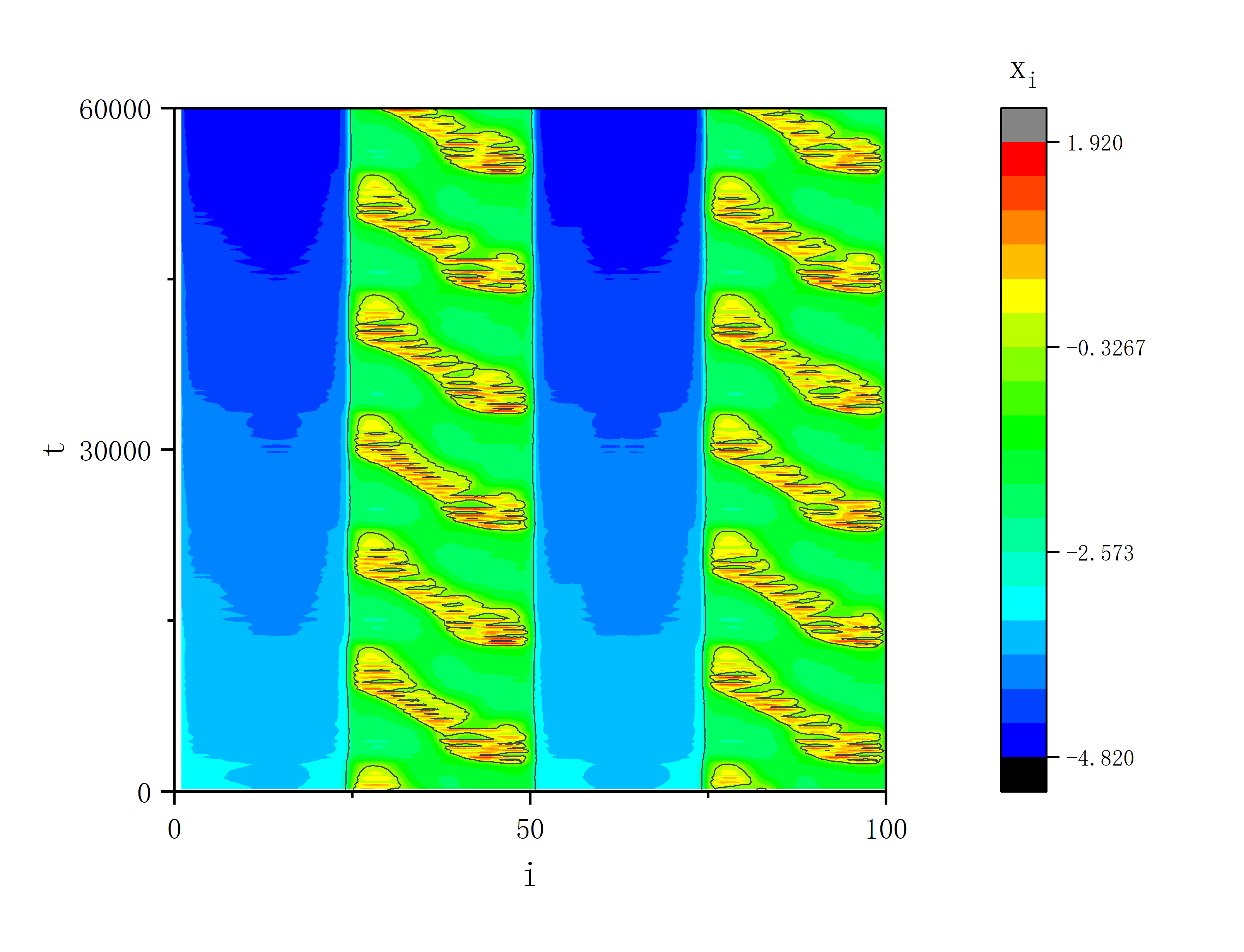
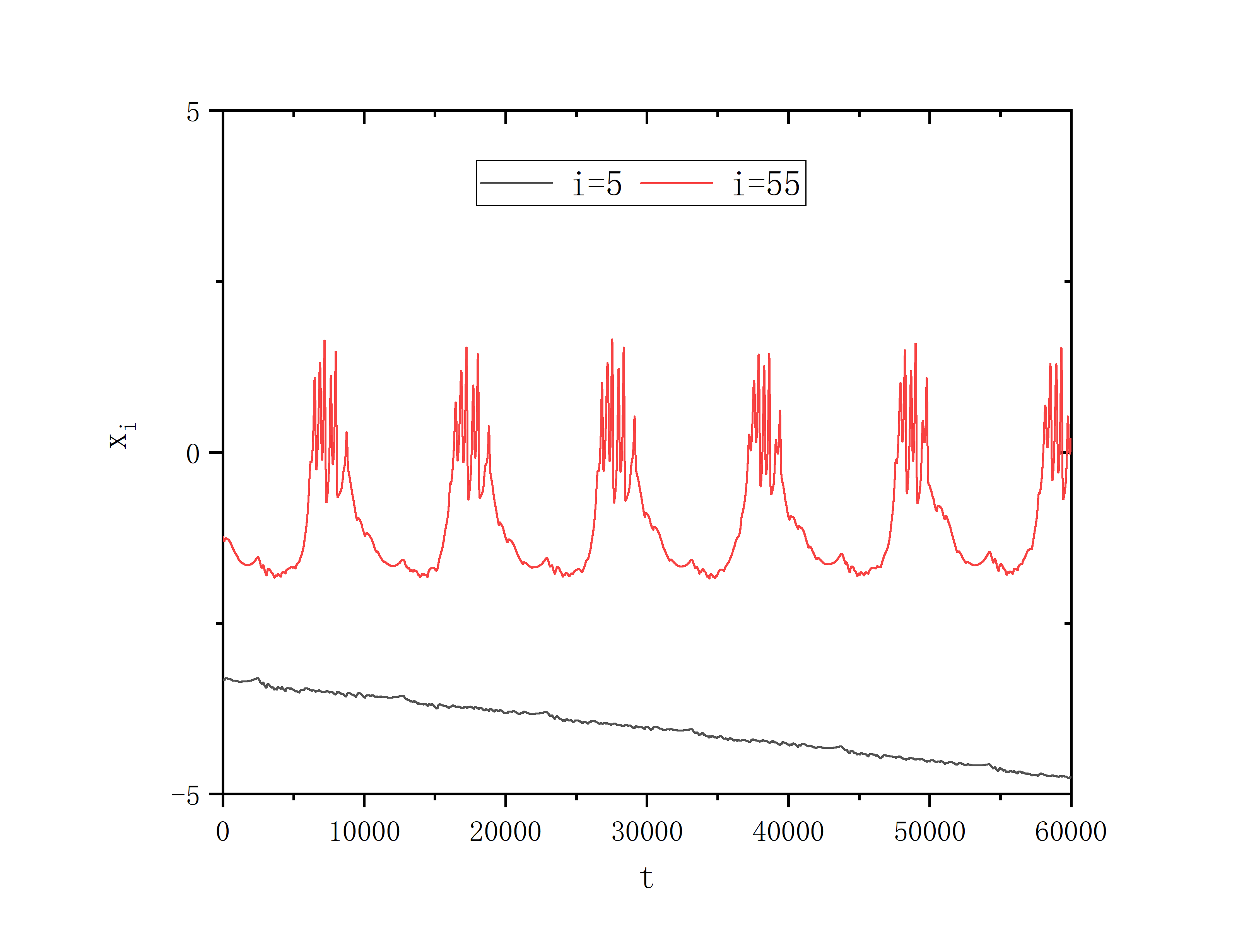
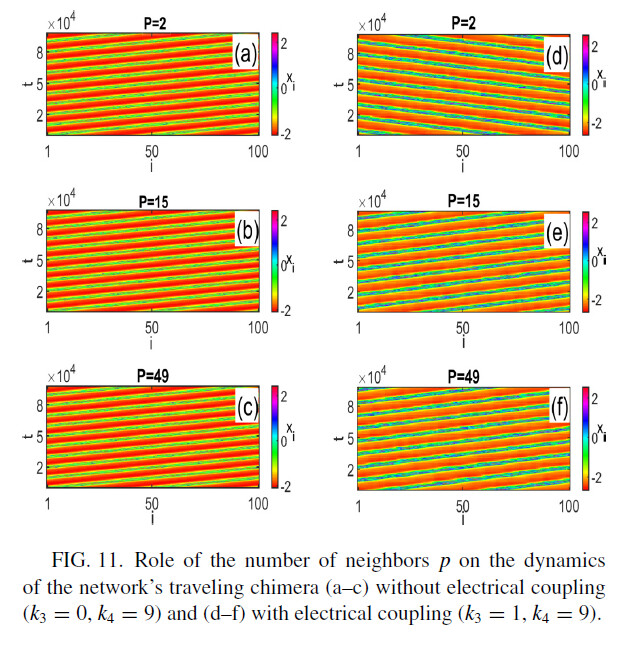
module HR
implicit none
real,parameter :: h=0.01,PI=3.1415926
integer,parameter :: N=100,MaxT=390000
integer,allocatable :: neighbour_matrix_2(:,:),neighbour_matrix_2P(:,:)
real :: x(N),y(N),z(N),E(N)
contains
subroutine x0_y0_z0()
implicit none
integer :: k
real :: x1,x2,x3
call random_seed()
do k=1,N,1
call random_number(x1)
call random_number(x2)
call random_number(x3)
x(k)=0.001*(k-N/2.0)+x1/100.0
y(k)=0.002*(k-N/2.0)+x2/100.0
z(k)=0.003*(k-N/2.0)+x3/100.0
write(101,*) x(k),y(k),z(k)
end do
end subroutine x0_y0_z0
subroutine fnf(p)
implicit none
integer :: i,j,p,t
real :: func_x(N),func_y(N),func_z(N),func_e(N),a,b,d,k1,k2,k3,k4,II,JJ(N),C(N),r,s,x_i0,E_ext,x_s,&
&lambda,thet_s,C1(N),C2(N),Li(N),Em,f
k1=0.7
k2=0.001
k3=0.0
k4=9.0
a=1.0
b=3.0
d=5.0
r=0.01
s=5.0
x_s=2.0
x_i0=-1.6
lambda=10.0
thet_s=-0.25
E_ext=0.0
E=0.0
Em=1.5
f=12.0
II=3.5
do t=1,MaxT,1
if(mod(t,5000)==0) then
write(*,*) t
end if
JJ=0.0
C1=0.0
C2=0.0
C=0.0
do i=1,N,1
do j=1,N,1
JJ(i)=JJ(i)+neighbour_matrix_2(i,j)*(x(j)-x(i))
C1(i)=C1(i)+neighbour_matrix_2P(i,j)*(1.0/(1.0+exp(-lambda*(x(j)-thet_s))))
C2(i)=C2(i)+neighbour_matrix_2(i,j)*(1.0/(1.0+exp(-lambda*(x(j)-thet_s))))
end do
C(i)=C1(i)-C2(i)
func_x(i)=x(i)+h*(y(i)-a*x(i)**3+b*x(i)**2-z(i)+II+k3*JJ(i)+((-k4/(2.0*p-2.0))*(x_s-x(i))*C(i)))
func_y(i)=y(i)+h*(1.0-d*x(i)**2-y(i)+k1*E(i))
func_z(i)=z(i)+h*(r*(s*(x(i)-x_i0)-z(i)))
E_ext=Em*sin(2.0*PI*f*(t))
func_e(i)=k2*y(i)+E_ext
if(t>300000.and.mod(t,1000)==0) then
write(102,*) i,t-300000,x(i)
end if
end do
x=func_x
y=func_y
z=func_z
E=func_e
end do
return
end subroutine fnf
subroutine neighbour_2(K)
implicit none
integer :: K
integer :: i,j,number
allocate(neighbour_matrix_2(N,N))
neighbour_matrix_2=0
do i=1,N-1,1
do j=i+1,N,1
if(abs(i-j)<=K/2.or.abs(i-j)>=N-K/2) then
neighbour_matrix_2(i,j)=1
neighbour_matrix_2(j,i)=1
end if
end do
end do
do i=1,N,1
do j=1,N,1
write(103,"(I2)",advance='no') neighbour_matrix_2(i,j)
end do
write(103,*)
end do
return
end subroutine neighbour_2
subroutine neighbour_2P(K)
implicit none
integer :: K
integer :: i,j,number
allocate(neighbour_matrix_2P(N,N))
neighbour_matrix_2P=0
do i=1,N-1,1
do j=i+1,N,1
if((abs(i-j)<=K/2.or.abs(i-j)>=N-K/2).and.abs(i-j)/=1) then
neighbour_matrix_2P(i,j)=1
neighbour_matrix_2P(j,i)=1
end if
end do
end do
do i=1,N,1
do j=1,N,1
write(104,"(I2)",advance='no') neighbour_matrix_2P(i,j)
end do
write(104,*)
end do
return
end subroutine neighbour_2P
end module HR
program main
use HR
implicit none
integer :: p
p=2
open(101,file="data_x0_y0_z0.txt")
open(102,file="data_i_t_x.txt")
open(103,file="neighbour_matrix_2.txt")
open(104,file="neighbour_matrix_2P.txt")
call x0_y0_z0()
call neighbour_2(2)
call neighbour_2P(2*p+2)
call fnf(p)
deallocate(neighbour_matrix_2)
deallocate(neighbour_matrix_2P)
close(101)
close(102)
close(103)
close(104)
end program main
